#SPECIFICALLY because he HATES being a king and was born to suffer the role so he abuses his privileges at every turn
Text
I can't make a noble OC that actually acts like a noble to save my life, because when I do they're poked fun at by my other noble OCs or made to be genuinely unlikeable jdsihufih
#looking directly at how Cervus is my ideal high-class character#SPECIFICALLY because he HATES being a king and was born to suffer the role so he abuses his privileges at every turn#and does whatever the fuck he wants to shoot down other royal and noble bullshittery#he's a walking contradiction that's trying to get his country to buy into Socialism suidyug7iyufg#also SHII and Reaper are runners-up because they blatantly refuse to act noble and hate being forced by birth into that shit#SHII only still does the meetings and other boring noble stuff because he has to at the moment with his position#Reaper doesn't even bother she only touts being the family head when she wants to boss her family around#which is almost never because she's never around and is too busy being a murder lesbian in the middle of the woods in isolation#once they defect though they basically become just some mercenaries with a reputation and they couldn't be happier#Vitality also only did the noble things and stuff out of necessity until he defects with them too then he just returns to doing sex work
2 notes
·
View notes
Text
Viren and His Children: A Game of Mirrors
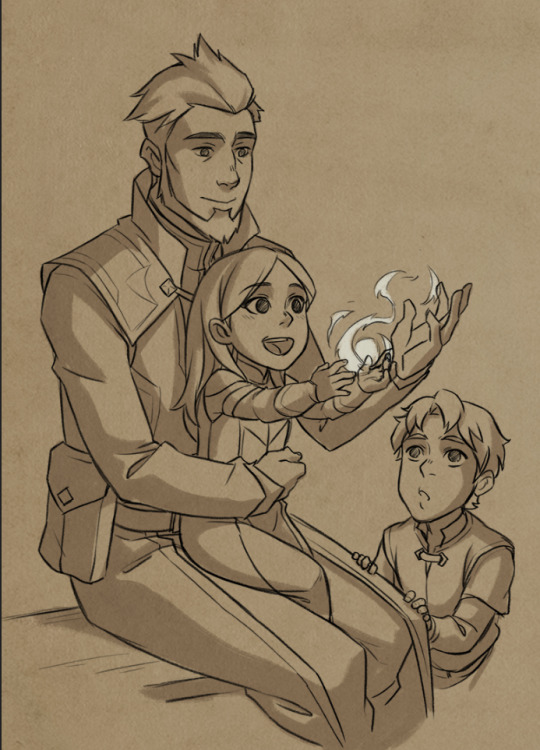
This picture shows the relationships between Viren and his two kids pretty nicely. On one hand there is Claudia using magic and Viren tenderly watching her. On the other hand there is Soren, who is not in his father’s lap, looking up at his sister and grabbing his father’s clothes to attract the man’s attention.
Viren treats both Soren and Claudia as extensions of himself, but he does so in different ways. There are two consequences to this. On one hand Soren and Claudia have developed different problems in relation to their parent. On the other hand they represent different sides of Viren himself.
This meta will try to show this and to show how Soren, Claudia and Viren all explore similar themes in different ways.
As a side note, when it comes to Soren and Viren, this meta by @mystic-deep has thoughts very similar to mine and it is a good read!
VIREN AND SOREN: THE TRUTH IN THE MIRROR
At the root of Viren’s character there is this:

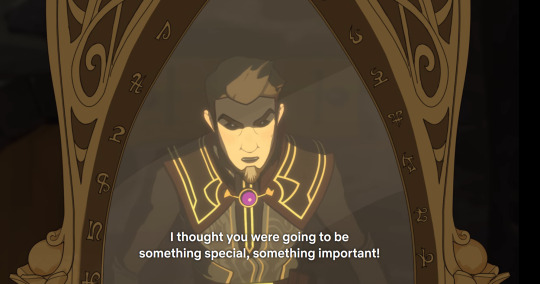
Here, Viren is talking about the magic mirror, but he is symbolically referring to himself. He wants to have power and to feel special. In other words, Viren’s thirst for power (aka his main flaw) is born by him deep down feeling worthless.
Viren projects this sense of worthlessness on both his children, so that they feel they have to gain their worth. After all, it is not by chance that by the age of respectively sixteen and eighteen Claudia and Soren are already accomplished enough to become the Archmage’s assistant and a Crownguard:
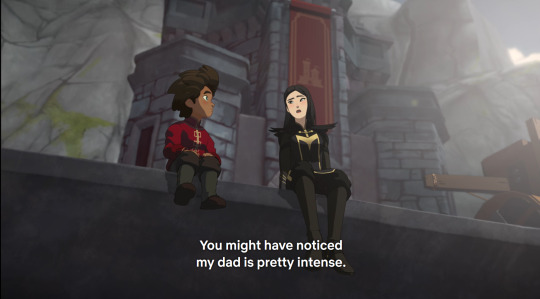
This becomes especially evident when you compare them with Ezran and Callum who, despite being princes, are not asked to do anything special with their lives. They are simply loved:
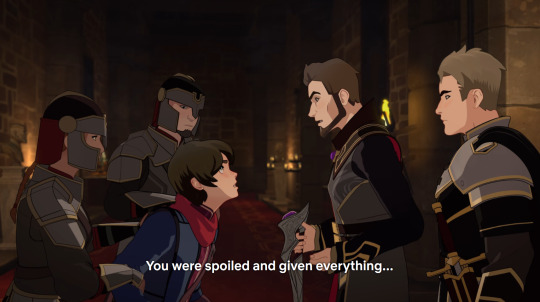
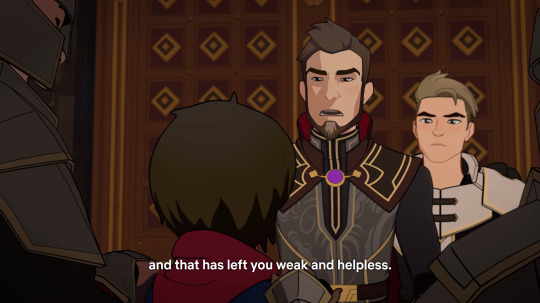

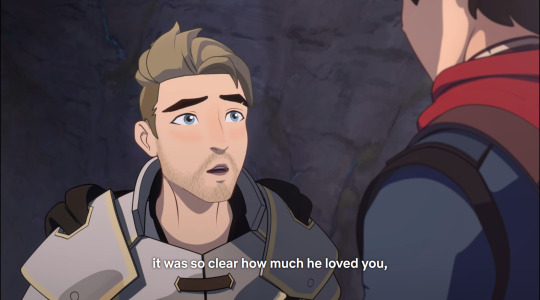
It is interesting that Viren and Soren say basically the same thing, respectively at the beginning and at the end of the first part of the series. However, they give the same concept opposite spins. As a matter of fact Viren presents the way Harrow brought Callum up as negative, while Soren presents it as positive. This is not by chance because Soren has inherited many of his father’s issues, but, differently from him, has managed to move past them by the end of season three.
This leads us to the main point of this section aka how Soren and Viren are similar and in what they differ.
First of all, both of them have sworn to protect the king since Viren is Harrow’s most trusted advisor, while Soren is a Crownguard. They both define themselves through their role and have pride in the abilities which let them reach their position. To be more specific, Viren is proud of his talent in dark magic and of his intelligence. Soren is instead proud of his physical prowess. In short, they share the same wish (proving their worth), but try to realize it in different ways (magical prowess vs physical prowess).
Viren and Soren are both ultimately examples of toxic masculinity, which can be defined as it follows:
-Suppressing emotions or masking distress
-Maintaining an appearance of hardness
-Violence as an indicator of power (think: “tough-guy” behavior)
(From the article I linked above, which @hamliet suggested to me).
These kinds of behaviours are very easy to spot when it comes to Soren:
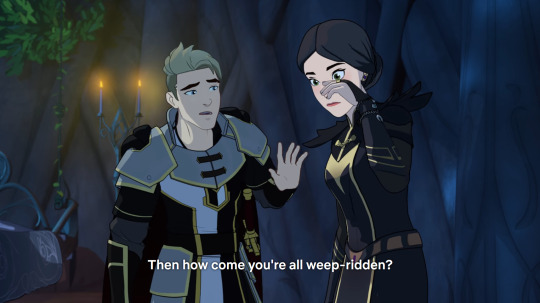

However, the story makes clear that Soren has developed them because of his father’s education:
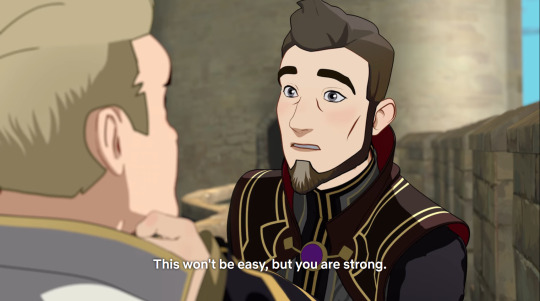
Toxic masculinity is at the root of the order Viren gives Soren. As a matter of fact he is asking his son to kill his childhood friends for some kind of greater good. Soren is asked to sacrifice his bonds and his feelings to impress his father. What is more, this sacrifice is presented as a way to prove his strength.
In other words, Soren tries to act as he thinks his father would want him to. This detrimental behaviour reaches its climax when Soren tries to kill Pyrrah. Let’s highlight that the episode Fire and Fury comes after The Heart of a Titan:
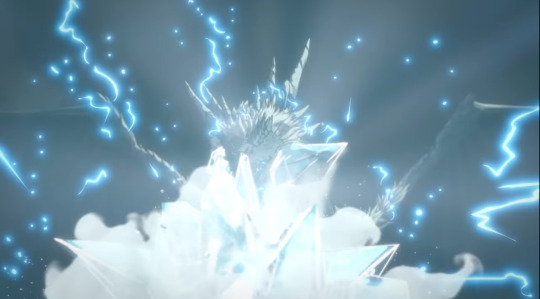
The Heart of a Titan
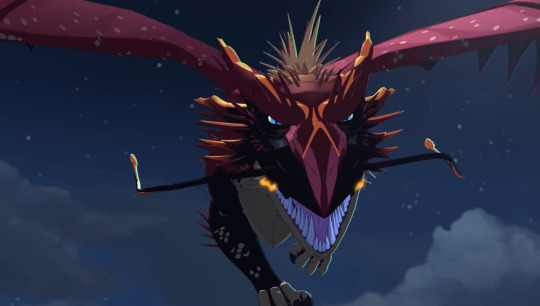
Fire and Fury
Both Viren and Soren’s fights against a dragon are masked as selfless attempts to help others. On one hand Viren goes back to try and help the Queens of Duren. On the other hand Soren claims that he wants to help the people of the city. However, both men are motivated by the need of proving themselves. Once again this is pretty evident when it comes to Soren:
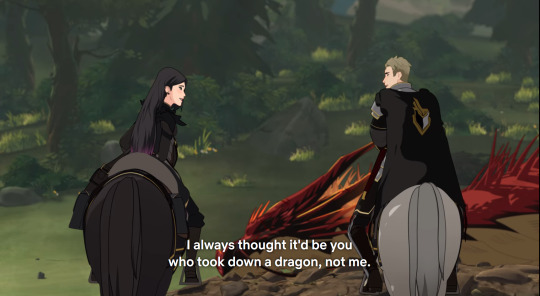

But even in this case Soren’s behaviour is born by specific teachings he received:


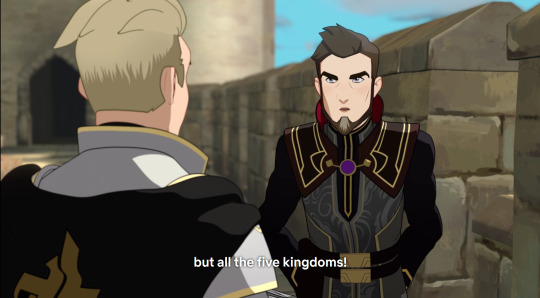
Viren is obsessed by the inferiority of humans when compared with magical creatures and thinks it is his duty to find a solution for it. What he does not notice is that he confuses humanity’s inferiority with his own inferiority complex. He does not want to win against magical creatures for humanity’s sake, but to show he is not inferior to them. In other words, Viren going back to fight Avizandum, when it was clear that he had no chance, was something probably born by his need to prove himself.
Things end up badly for both father and son. As a matter of fact the people they were trying to help suffer because of their interference. What is more, both Viren and Soren need to be saved by a woman who sacrifices (a part of) herself:


However, Soren receives an ulterior bad consequence for his behaviour:
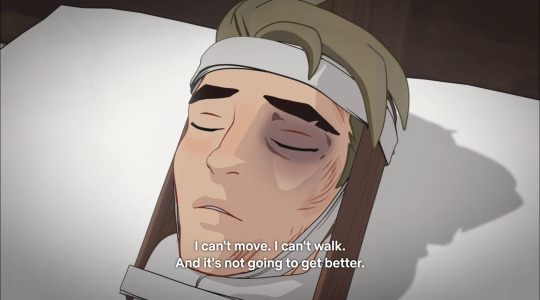
He temporary loses his physical strength aka the thing he was the most proud of. Because of this, he is forced to face his own vulnerability:

Opens up to his sister:

And expresses what he really wants:
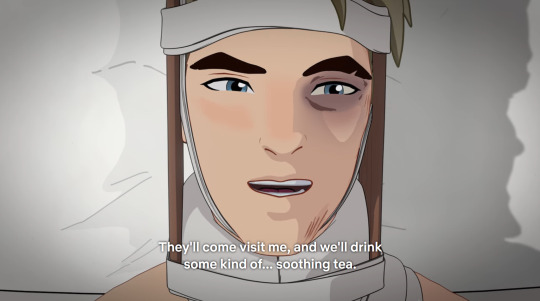
Ultimately what Soren wants is to love people and to be loved in return. Because of this, it is important that he is saved because of others’ love and kindness:


Claudia is there for him despite him having done a mess and Ezran forgives his crimes. It is ultimately because of them and of his own ability to learn from his mistakes that Soren is able to grow. It is poignant that in season 3 Soren starts to pursue his objectives with a completely different method from this:

He uses intelligence:

Communication:

And shows vulnerability, even to his father:
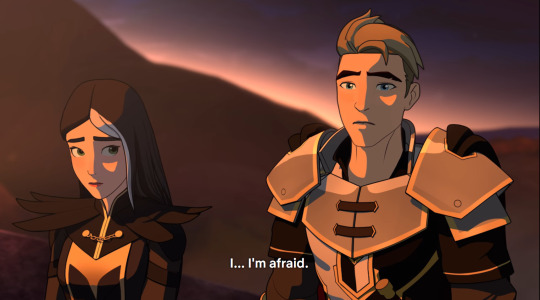
The fact that Viren, in this scene, despises his son’s vulnerability is symbolic of how he can’t really accept his own. As a matter of fact Viren basically does to Soren what he does to himself:

He asks Soren to cut his ties with his childhood friends, just like he did with Harrow whose children he is trying to kill. He wants Soren to inherit the throne, just like he is usurping it. He wants to turn Soren in a monster, just like he himself is turning more and more into one (both internally and externally):
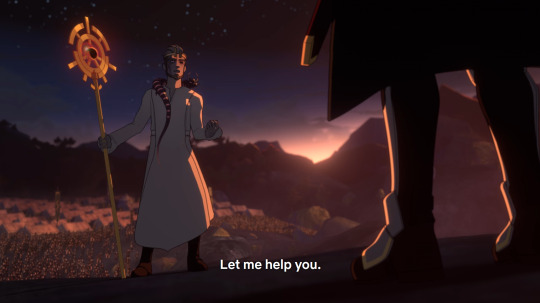
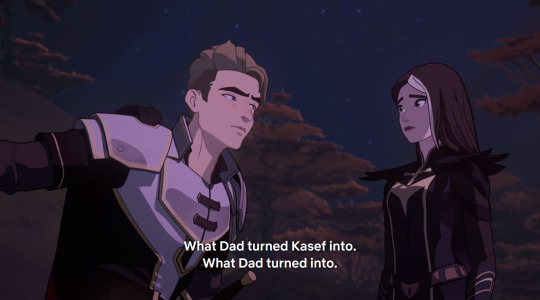
Because of all of this, the reason why Viren treats Soren so coldly finally becomes clear. It is because Viren sees in Soren a part of himself he is ashamed of and does not want to face. Soren is, in Viren’s eyes, the part of himself who tries hard, but never fully succeeds. So Viren asks of Soren the impossible and he shows Soren his most cruel and pragmatic side more openly than he does with Claudia. Moreover he tries to change Soren into someone(-thing) he sees as powerful. However, by refusing to accept his son for who he is, Viren misses that there is much to be loved about Soren. He misses that Soren has talents and traits, which make him a good person and a great Crownguard:
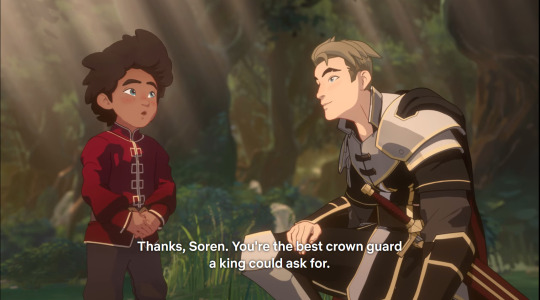
What is more, by refusing Soren’s doubts and challenges, he also refuses to see what should be clear:
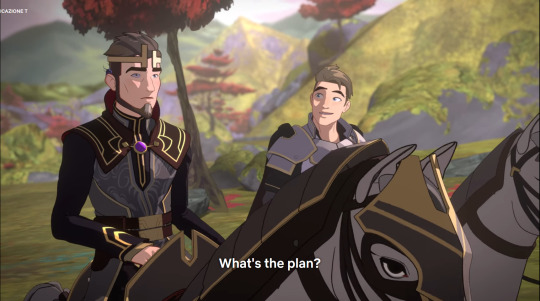
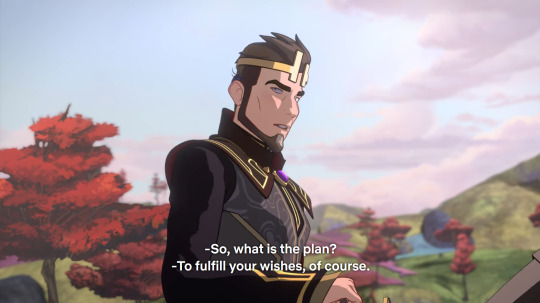
If Viren had listened to Soren’s question and had been honest with himself, he could have realized that he is not really the one in control, but that Aaravos is. Soren refuses to stay his father’s puppet, just when his father chooses to be someone else’s and stops thinking with his own head.
In conclusion, Soren is the victim of his father’s self-hate. Moreover, he symbolizes a part of Viren the man refuses. It is precisely because of this refusal that Viren spirals further and this spiral is symbolized by him becoming more and more intertwined with Dark Magic.
VIREN AND CLAUDIA: AN ILLUSION IN THE MIRROR
Dark Magic is described in this way by Sarai:


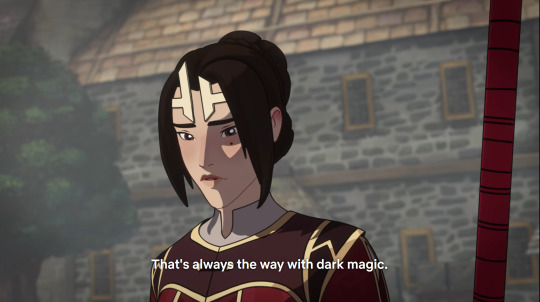
It is a shortcut which lets people evade problems. However, because of this, the issues which created the problems in the first place are never fully addressed. This leads to people being unable to grow because they never face their own shortcomings. In this way, they are given a sense of false security which is detrimental in the long run.
This is what happens to both Viren and Claudia. In particular, Claudia makes it clear:
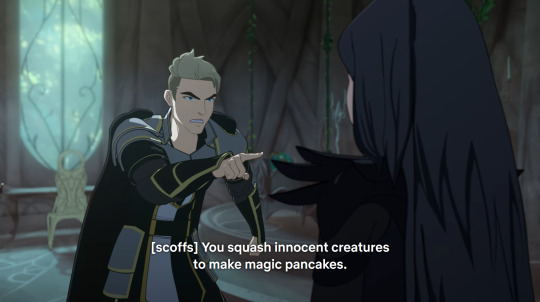
Claudia has grown so dependent on Dark Magic that she would use it even for making pancakes. Instead of simply cooking normally, she sacrifices small animals’ lives unnecessarily. This overdependence leads her to lose her usual nice demeanor when a situation she can’t fix with magic arises:


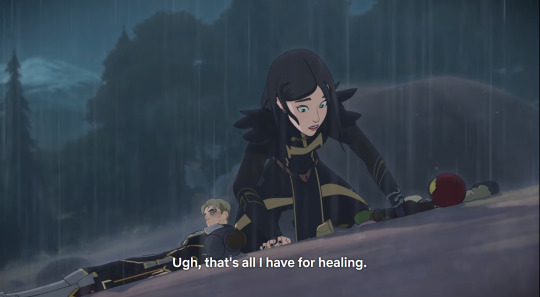

As in Soren’s case, she has become this way because of Viren’s teachings:
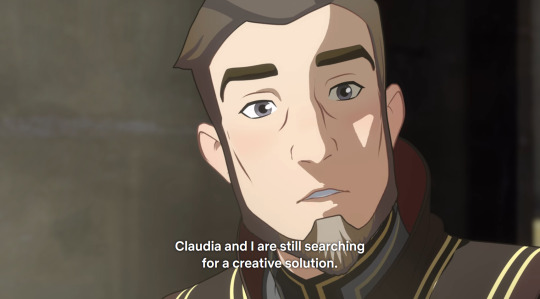
As a matter of fact both father and daughter share the method they use to reach their objectives. That said, Claudia’s internal motivation is different from her father’s. Viren is motivated by the wish to prove his strength. Claudia is instead motivated by the wish to stay together with her family. This is why she always justifies her loved ones’ actions. In this way, she does not have to enter in a serious conflict with them. In other words, she enables them even when she should call them out.
We have seen glimpses of this with Soren:



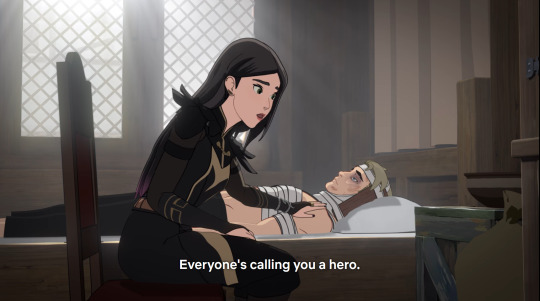
However, it is with Viren that this behaviour truly becomes toxic:
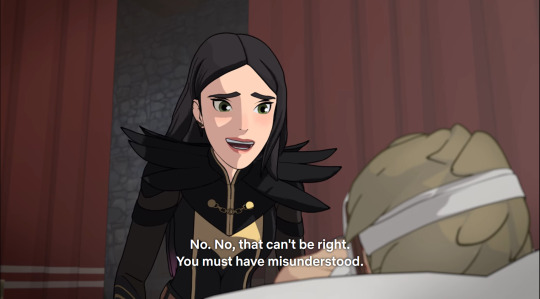
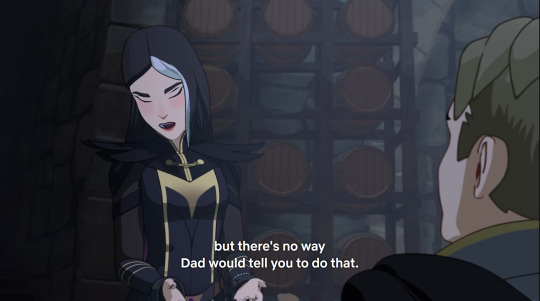
In the scenes above, it is clear that Claudia is tricking herself into believing Viren. She probably knows deep down that Soren has not misheard. However, it is easier to cling to the illusion that he did because in this way Claudia’s perfect little world does not shatter. In this world, her father is the best person ever and Soren is lovable, but a doof. Still, this world is an illusion and it will naturally disappear no matter how much Claudia tries to preserve it:
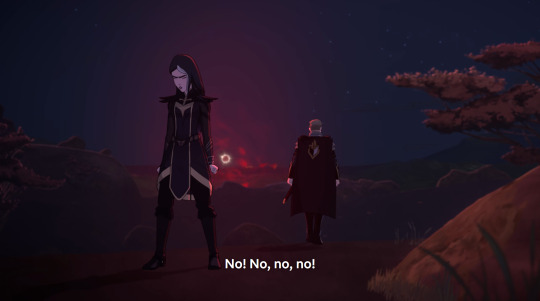
In the end Soren leaves and Claudia’s family loses another member. It is interesting that, in a sense, Claudia’s behaviour is the opposite of this:

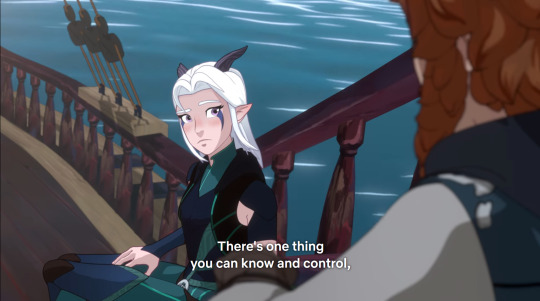
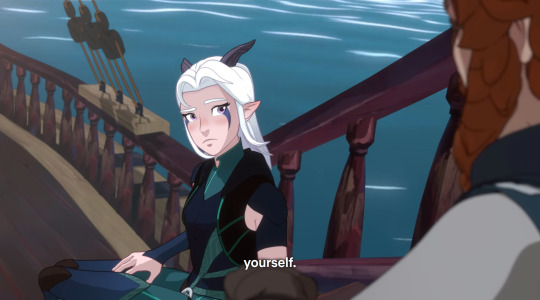
Villads tells Rayla she can control nothing, but herself. Claudia, though, is doing the opposite. She tries to control everything, but is really not able to control herself. By this, I mean that she is unable to actively make a choice:
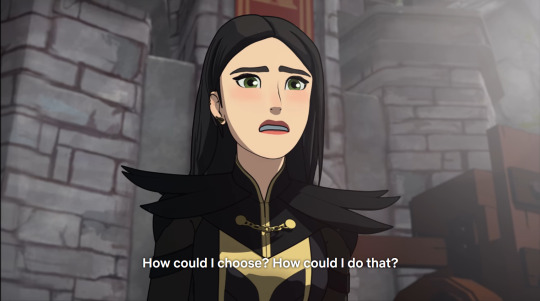
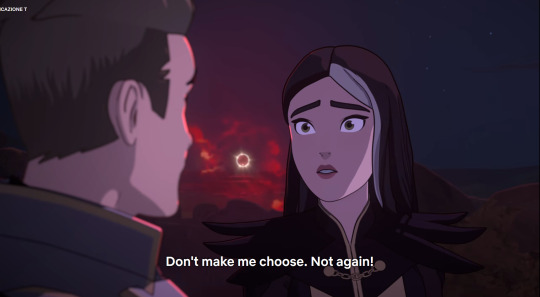
When it comes to her family, Claudia can’t choose. No matter that one side is clearly in the wrong, she still can’t bring herself to leave a family member. And this is why she is the one left behind instead. Let’s highlight that Claudia has stayed with Viren not because she has actively chosen him over her mother or even Soren. She has stayed with Viren because she could not make a choice and so her decision ended up being a passive one. Only at this point, Claudia would cling to what she has left and protect it with all her strength even if she must twist reality (both in her own mind and externally) to do so:
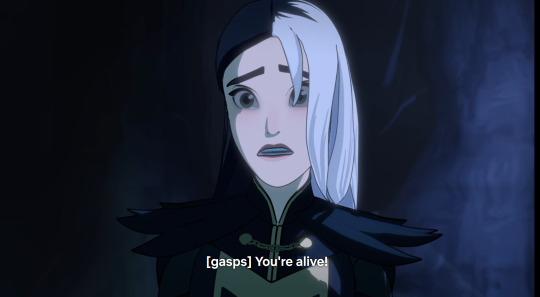
This behaviour is damaging both for herself and for her loved ones. As a matter of fact, by not calling her family out, Claudia is not able to stop their spirals. She helps Soren take out a dragon only for that dragon to wound her brother while he is mocking it.
Something similar happens with Viren as well:

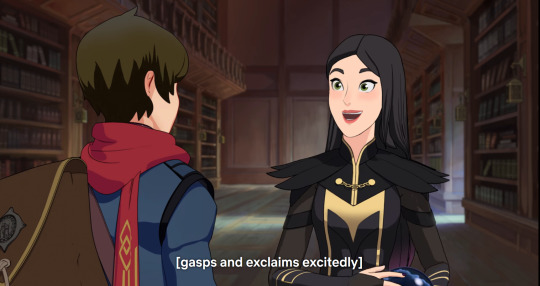
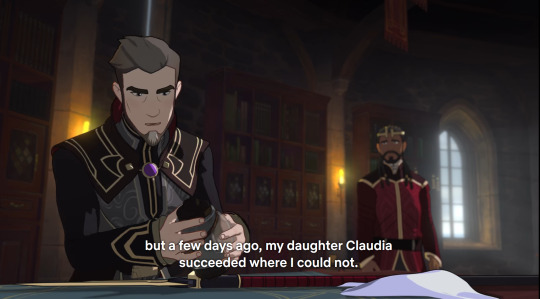

Since the very beginning, it is clear that Claudia’s talent for Dark Magic has enabled her father to perform more and more dangerous magic. Let’s highlight that Claudia is probably not really interested in her father’s objectives. She just wants to help Viren, but she only helps him to self-destruct himself more efficiently. If she had not given her father the corn, Viren and Harrow would not have killed Avizandum and all the terrible things which happened and will happen to her family could have been avoided.
Let’s underline that Claudia enabling her father is true not only from a practical point of view:
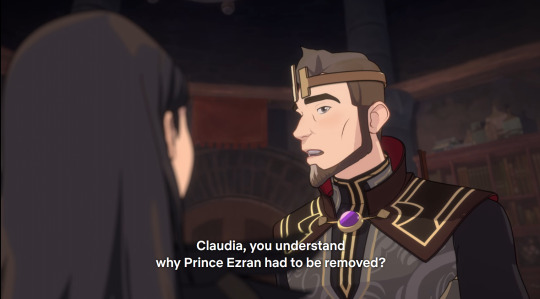

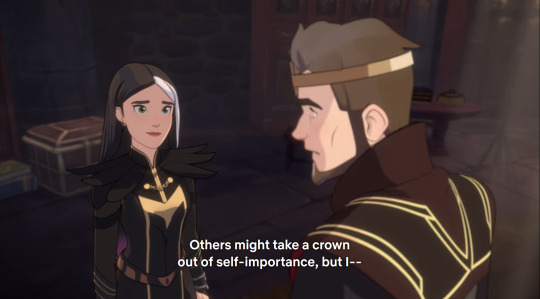
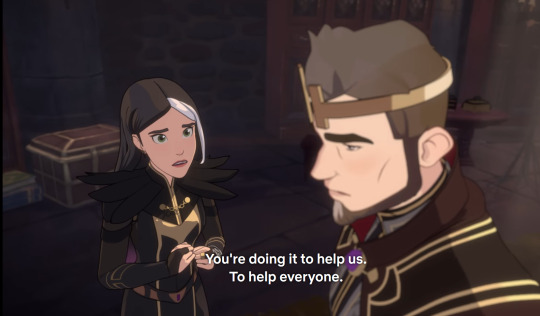
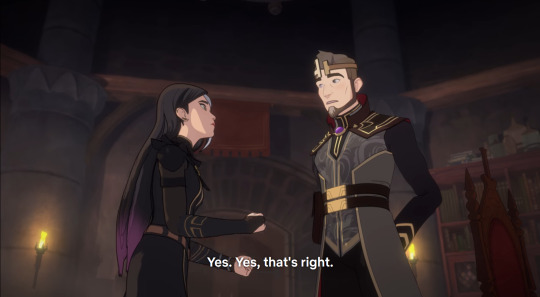
The scene above shows that Viren wants to be reassured and to be told that he has done the right thing. So he asks Claudia and Claudia readily tells him what he wants to hear. She knows what he wants to hear because it is what he himself has taught her. In short, Claudia acts as Viren’s echo chamber and repeats to him the same justifications he himself uses. In this way, they both manage to keep their respective illusions alive. They can both keep believing Viren is a good person, even if they deep down know it is not true.
This dynamic explains why Viren favors Claudia so much. He sees Claudia as a personification of everything he is proud of about himself. What is more, this personification looks at him as if he were the best person ever. So Viren sees through Claudia an image of himself he likes.
This is also why he hesitates to show Claudia his cruellest side:

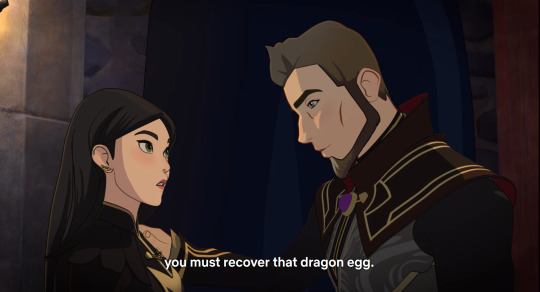
The mission Viren gives Claudia may be the one he cares the most about, but it is also the less cruel. Moreover he does not tell her to choose the egg over Soren initially, but he makes the addition after Claudia asks him. Even when one considers it, he is not asking Claudia to actively kill someone she cares about.
In conclusion, Claudia and Viren put each other on a pedestal and this is damaging for both. In particular, Viren uses Claudia to nurture his ego and to feel better about himself, while Claudia lets Viren go away with everything not to be abandoned. It is because Claudia refuses a conflict with her father that she can neither save herself nor him.
VIREN AND AARAVOS: BECOMING THE MIRROR
Soren and Claudia’s different relationships with Viren are conveyed through their respective reactions to Aaravos:
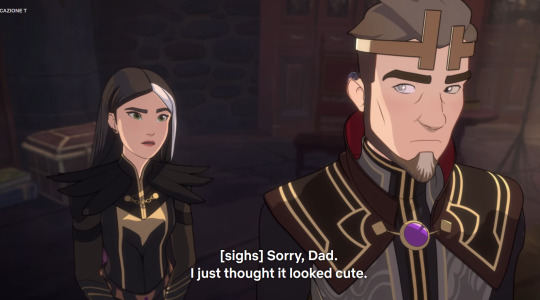
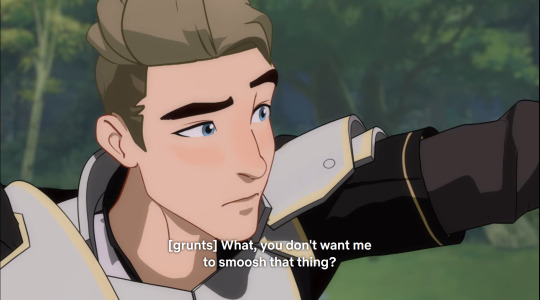
On one hand Claudia finds her father’s little bug pal cute. On the other hand Soren tries to smoosh it. This is not accidental, but symbolic. As a matter of fact Soren is who Viren is ashamed to be, while Claudia is who Viren is proud to be. Aaravos is instead who gives Viren the chance to truly become his ideal-self.
This is made clear since the very beginning:
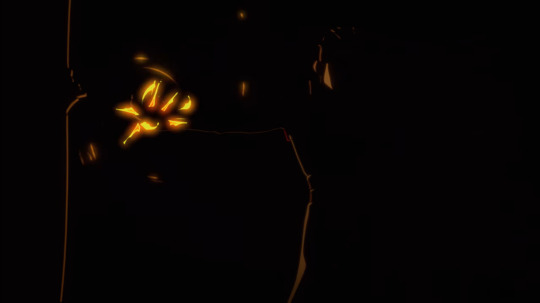



The first thing Aaravos does to communicate with Viren is to repeat the man’s actions. This is what a reflection should do, so Aaravos plays the part of Viren’s reflection. To be more precise, he offers Viren what he wants:

Because of this, Aaravos is seen by Viren as a chance to finally become who he wants to be. As a matter of fact it is clear that Viren idealizes Aaravos and ends up depending on him more and more. This is also shown through minor details:
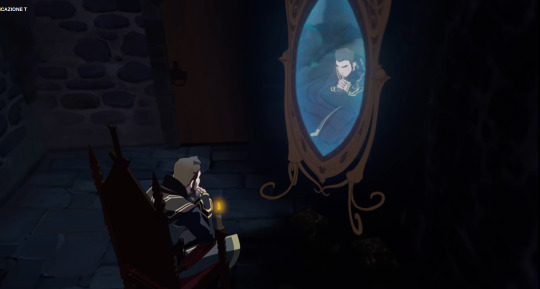

Viren glimpses into Aaravos’s room from his own one, which resembles a dungeon. The symbolism is clear: Viren feels trapped by his own limits and is given the possibility to see a better place and a person who may help him overcome said limits. However, this is an illusion:
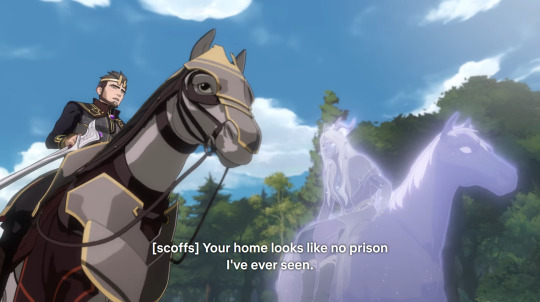
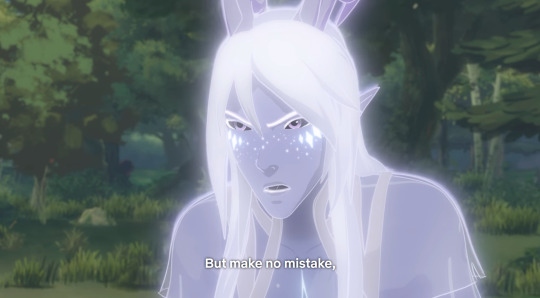

Aaravos’s luxurious room is nothing more than a prison. Similarly, the beautiful elf who offers to help Viren is not really Viren’s ideals encarnated, but, if anything, he is his worst instincts:
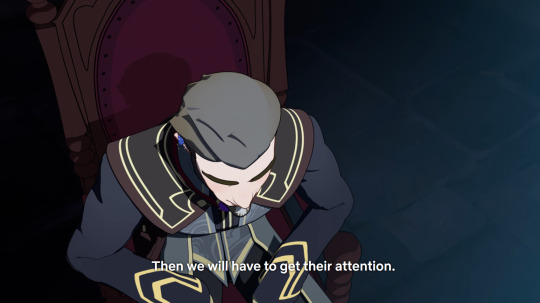
Aaravos pushes Viren to commit more atrocities than those he has already committed. What is more, the elf interferes in the relationship Viren has with his children:
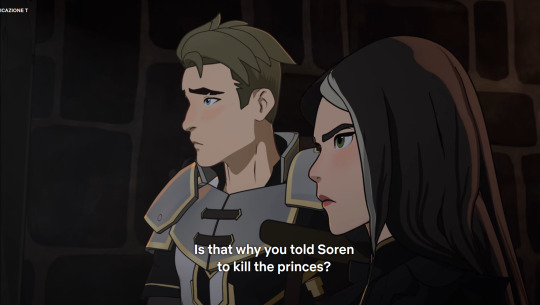
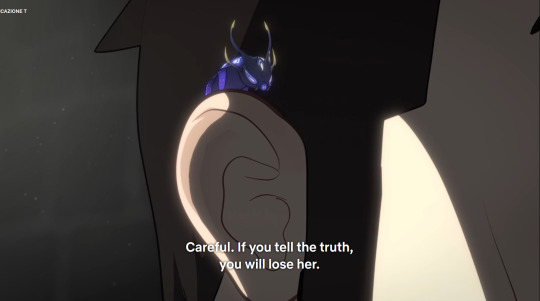
This is a pretty crucial moment. Claudia asks his father to explain himself and Viren is given the chance to come clean and to use this input to truly reflect on his own actions. However, any feeling of guilt or vulnerability Viren may be experiencing is readily suffocated by Aaravos’s words. The elf invites Viren to only think utilitaristically. So Viren manipulates both his children. In this way, he pushes Soren away and traps Claudia in a dynamic, which will damage her.
In a sense, Aaravos’s lines usually highlight Viren’s hypocrisy and his hidden contradictions:

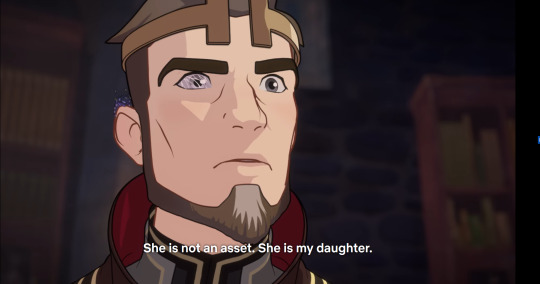
Viren refuses the idea that Claudia is just an asset, but ultimately this is how he treats both her and Soren. If that were not the case, he would have answered Claudia’s question in the dungeon honestly and would have apologized to both her and Soren. Aaravos simply makes clear something about Viren, which the man refuses. The same happens here:


Viren wants power for selfish reasons (he wants to feel worthy), but he deceives himself into thinking he wants it for others. This is why Aaravos’s words do not sit well with him. Your actions appear much less noble if you are reminded that what you really want is to conquer a nation.
At the same time, it is clear that Aaravos is not really in good faith and that he is using Viren’s insecurities to further his own agenda. This is why he is symbolically taking control of Viren:

Aaravos’s vessel is not the bug, but Viren himself. Aaravos is slowly taking him over. This is symbolically shown by Aaravos “stealing” Viren’s senses:


Moreover, by the end of season three, Aaravos is the one moving Viren’s body to hit Rayla:

In other words, it is not Viren controlling the mirror, but it is the mirror controlling him:
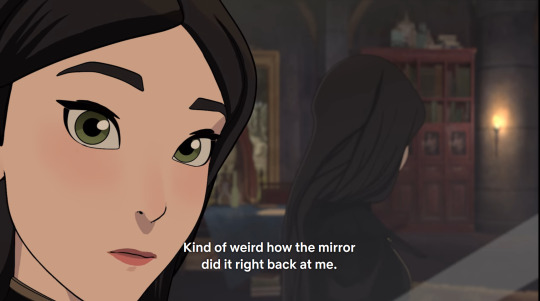
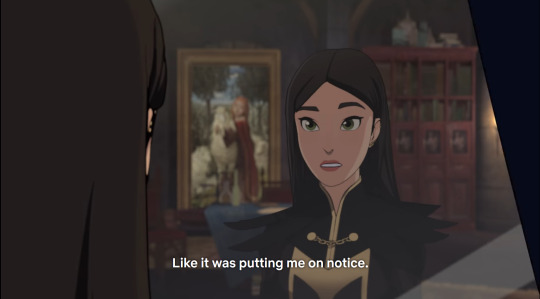
This is highly ironic. As a matter of fact, in his pursue of self-importance, Viren is being reduced to a shell through which Aaravos can act. However, Viren refuses to face this (as seen through his dynamic with Soren (shame)) and to admit his mistakes (as shown by his dynamic with Claudia (pride)).
CLAUDIA AND SOREN: MORE THAN REFLECTIONS
The analysis up until now has been focused on how Viren objectifies his two kids. He treats them as parts of himself, but they are more than that. This last section will highlight it through their relationship.
First of all, as stated in the first section, Soren and Claudia are very accomplished for their age. They are given adult responsibilities to the point that they are barely treated as kids by their parent:
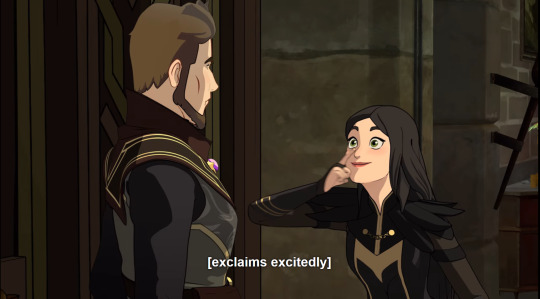
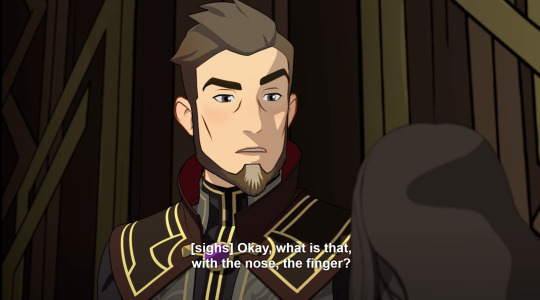
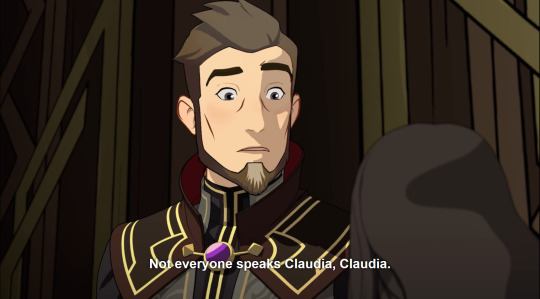


Viren has shown very little patience when it comes to the siblings’ most childish traits. He is annoyed by their jokes and dismisses their quirkiness as non-sense. This is very different from how the siblings treat each other:

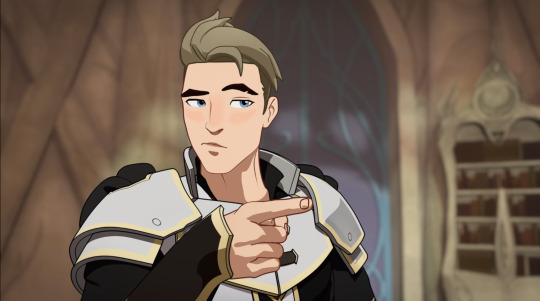

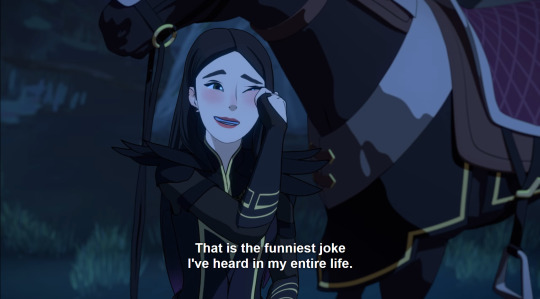
Soren and Claudia are able to express themselves more openly when they are together than when they interact with Viren. This is true also when it comes to calling each other out:
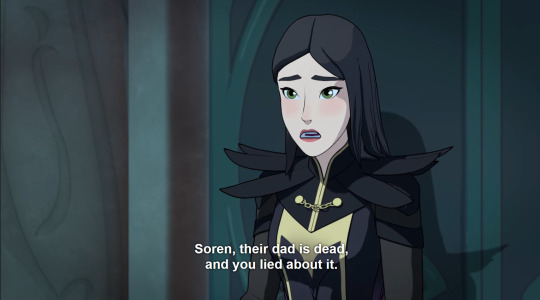
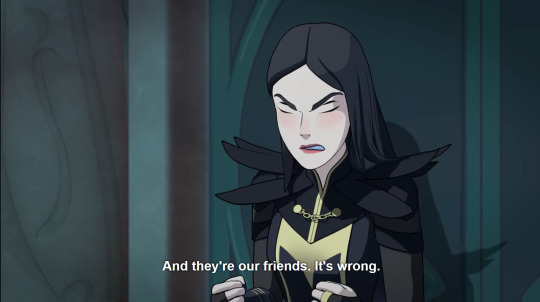
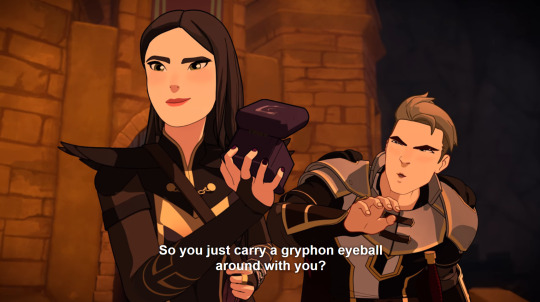

Interestingly, they criticize behaviours they share with Viren. As a matter of fact Claudia scolds Soren for his lack of tact and cruelty and ignores Viren’s mission is far crueller. Soren instead shows disgust for his sister’s magic, but does not dare to do the same to his father’s face.
This shows that, since the beginning, Soren and Claudia are uncomfortable with some traits Viren has. However, they tolerate them both in Viren and in each other out of respect for their parent. This is made clear throughout the series:
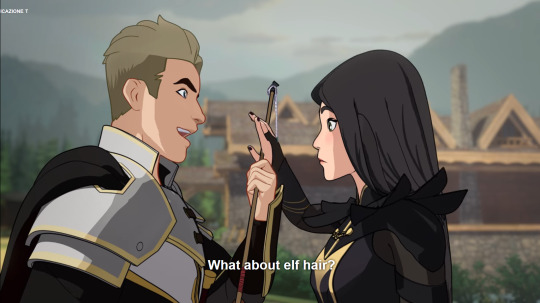
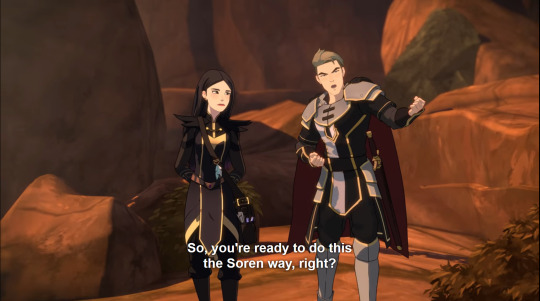
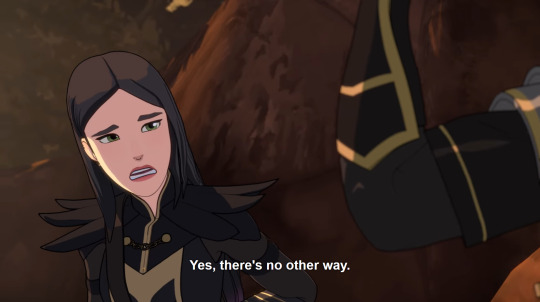
Soren finds magic gross, but finds ingredients for Claudia’s spell. Claudia does not want to fight her friends, but accepts to do it. The reason why they both compromise is clearly just one:
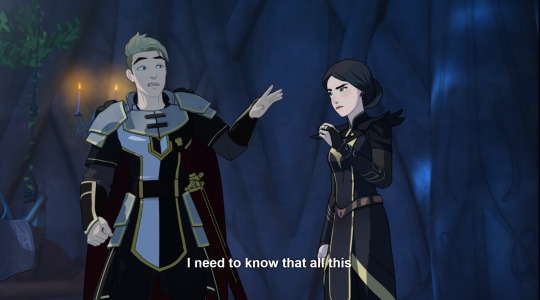
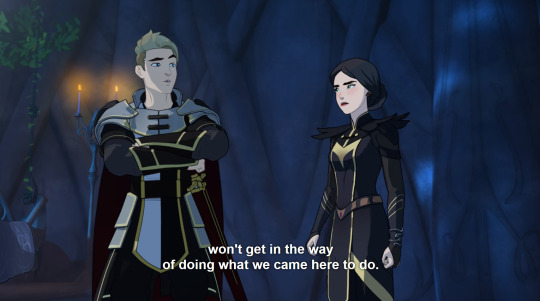
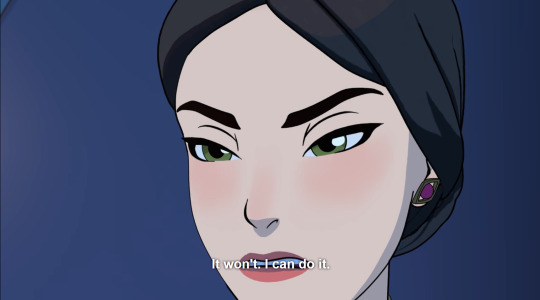
They must succeed in their mission. In other words, Viren’s presence, even when he is away, stops them from truly calling each other out and from acting in a way they both feel comfortable with. In a sense, it stops them from growing. Because of this, it is not a surprise that the first serious conflict they have is specifically about their father:

This scene portrays Soren and Claudia serving two different kings (Viren and Ezran). This highlights two differences between the siblings.
The first one is the dychotomy between duty and family/feelings. Given the choice, Soren always chooses his duty (Ezran):
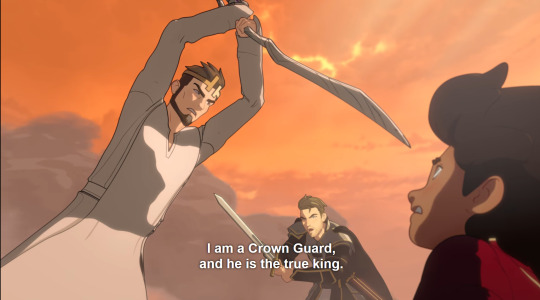

While Claudia always chooses her family (Viren):


Let’s underline that one choice is not inherently better than the other. This is made clear in season two. In this season, we see Soren choosing the mission over his childhood friends. This is his reasoning:

Surely, he wants to please his father, but he also wants to believe it is the best thing for the greater good.
In that same season, we see Claudia giving up on her mission:
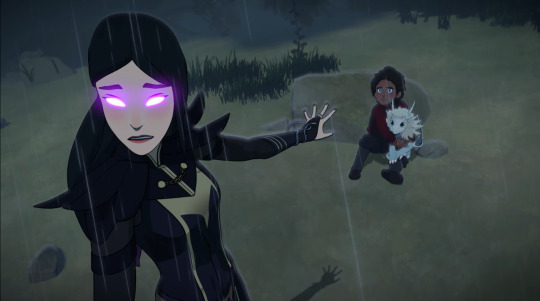
Claudia does so because her love for her family is superior to her sense of duty.
In other words, season two shows Soren making the wrong choice out of a misplaced sense of duty, while Claudia makes the right one by trusting her feelings. However, season three shows a reversed situation:
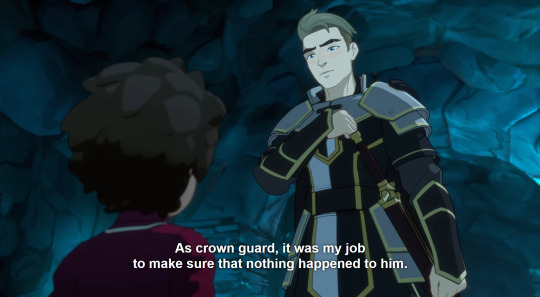
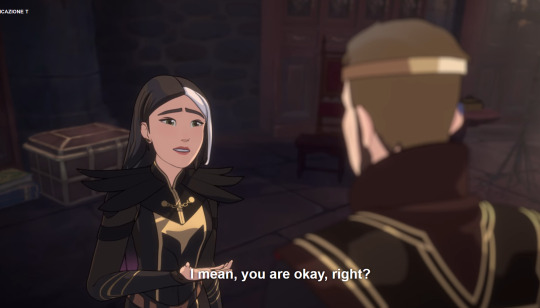
Soren is able to betray his father because of his own sense of duty, while Claudia can’t make herself leave Viren out of love.
In other words, the right choice does not lie neither in “relationships” nor in “duty”. After all, the lines between these two concepts are blurred. On one hand Soren reconciled with his childhood friends and forged new bonds in order to fulfill his duty. On the other hand Claudia would help Viren more if she called him out.
So, in the scene above, what is the true difference between the two siblings? Why is Soren in the right, while Claudia is in the wrong? The main difference lies symbolically in the fact that Soren is protecting a child, while Claudia is enabling a parent. This means that Soren is growing up, while Claudia is refusing to.
Growing up is a process, which often creates conflict between the child and the parent. This is especially true in this context because of Viren’s abusive behaviour. If the two siblings want to grow up, they must escape Viren and become their own people. This is what Soren has started to do in season three. Throughout the season he is able to see his father for who he really is, calls him out and finally leaves him to become who he wants to be.
This is something Claudia is not able to do because deep down she does not want to grow up. This is conveyed, as shown above, by her inability to choose. As a matter of fact Claudia does not want to choose, but to be chosen. This is because a choice implies a sacrifice (a consequence), but Claudia does not want to give up on anything precious to her. What she wants is, instead, that the people she loves always choose her. In this way, Claudia gives up her own agency.
This is clearly a consequence of her mother’s abandonment:
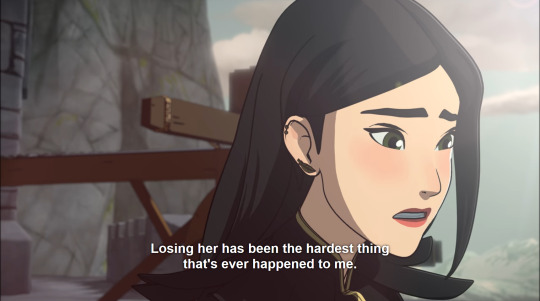
Because of this event, she is stuck in a childish state where she wants to be taken care of and protected. That said, her family members have other objectives, so she gives them what she herself wants (nurture and protection) hoping to receive it from them in return.
Let’s think once again about what Viren tells Callum at the beginning:
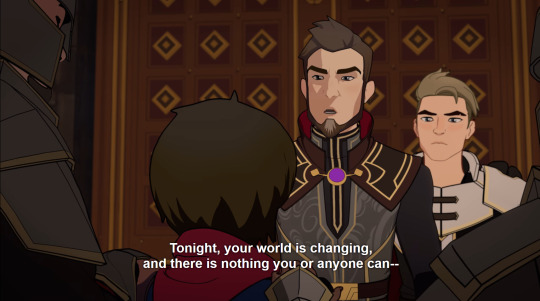
Viren claims that Callum (and Ezran) won’t be able to face changes because they have been spoilt. However, the narrative shows that this is not the case. If anything, the fact that Harrow has loved and supported his children is the reason why they can grow up:

Among the main characters, the one who can’t face change is Claudia and this is not because she has been spoilt, but because her mother made her feel unloved.
In short, both Soren and Claudia have developed a sense of worthlessness because of their parents’ behaviour. Soren has developed it because of Viren’s mistreatment, while Claudia has hers because of her mother’s abandonment. Soren tries to overcome his by impressing his fahter and later on he finds a healthier fulfillment in his role of Crownguard. Claudia tries to overcome hers by keeping her family together and toning down its conflicts. Soren defines himself through external recognizements, while Claudia through her relationships with others. All in all, it is the same problem, but it is declined in different ways.
In conclusion, Soren and Claudia are two kids who have been suffering because of their parents. In order to reach a positive outcome they must grow up and become independent (as proven by Soren in season three). In this way, they will naturally tone down some traits, which can be negative if taken to the extreme (love for one’s own strength, hate of conflict). It is probable that they will be able to do so through each other. After all, Soren got his chance to actively redeem himself because Claudia cured him, so it is likely Claudia too will be given another chance (hopefully) through Soren.
CONCLUSION: ESCAPING THE MIRROR
Both Viren and his children are all trapped in a game of mirrors. Viren treats his kids as reflections of himself and his pursue of an ideal self (who is nothing, but a mirage) is destroying his family.
To stop this process, Viren must accept who he is and his mistakes, while Soren and Claudia must claim their own individuality and become independent from their parent. There are several ways this can (or can’t) happen. I am curious about how the dynamics of this family will keep being explored in later seasons.
#tdp#tdp meta#tdp viren#lord viren#tdp claudia#tdp soren#claudia tdp#soren tdp#the dragon prince#the dragon prince meta#my meta#brodigies
93 notes
·
View notes
Text
Dabi, Shigaraki and Hawks

One of the most interesting plot lines right now is the connection between Dabi and Hawks, the number two hero, and double agent who is trying to gain access to the league of villains. While Hawks is a hero, he may have more in common with the league of villains than any hero. Which may inevitably draw him closer to them, as the hero system arguably is treating him as an asset to be used while the League of Villains is more accepting of its members and treats them like individual people and friends.
For more on the parallels between these three characters, and why Hawks may find more sympathy in the League of Villains and eventually be persuaded to join read underneath the cut.
1. Raised to be a Hero / Raised to be a Villain
If Dabi is confirmed to be Todoroki Touya, then both him and Shigaraki have taken opposite but similiar paths in life. There are several parallels between what is now revealed about Shigaraki’s childhood, and what we can speculate on Touya’s childhood based on how Shoto was raised.
Both Touya and Tenko are victims because they happened to be born to a heroic legacy. Touya is the son of the number two hero who only had children to force them to carry on his legacy and surpass All Might, and Tenko is the grandchild of Nana Shimura who was not only abused by his own father because of Nana’s decision to abandon Kotaro, but also was picked up by All for One only because of who his grandmother happened to be.


They are both blatant victims of the hero system they were born into. They suffer from a cycle of abuse that the hero system allowed to go unchecked. Supposedly good heroes (Nana Shimura, and Endeavor) who saved a lot of strangers then turned around and abused their own families. (Abandonment is a type of abuse, it’s neglect, especially since Kotaro clearly was not left with a happy family and was most likely chucked into the foster system with little care for where he left off).
The hero system also has no interest in correcting its mistakes. It doesn’t matter if Shigaraki and Dabi were victims at one point, they are villains now and therefore they need to be taken down. Even if the only reason Tenko was put into his position was because of Nana’s decision to abandon her child, it’s still his fault he’s a dangerous villain.

Both Shigaraki and Dabi were raised, not as their own individual people, as children to be loved, but rather to carry on the legacy of their father figures. They are not their own separate people from their fathers, their fathers just consider them tools to further their own goals. Who they are as a person does not matter, only who their fathers were. Obviously, not being raised to be a person but rather a tool for your father’s goals is going to have severe developmental affects on a child.


Tenko and Touya were also specifically picked out because of their quirks. Tenko for his destructive quirk, and Touya was literally bred to have a high power fire quirk and an ice quirk, but turned out to be a failure for that. Their fathers tried to use their quirks to define who they were as people. Touya only existed to inherit his father’s powerful fire quirk, and Tenko must have been born to destroy and with destructive impulses because he was born with a quirk that disintegrates with a touch.


Due to the fact that they were raised basically the same way child soldiers were raised, to be a tool to fight for both of their father figures, they both were exposed to extreme amounts of violence as children. The evidence is obvious on both of their bodies, Shigaraki is covered in scars, and so is Dabi. Dabi even fights specifically in a way that harms his own body, and pushes himself to the limit constantly, because that was probably how he was raised to fight, and taught that was his only worth.


Their current goals (though Dabi’s is a lot vaguer than Shigaraki’s since a lot of reveals have not happened about his character yet) are in response to the way they were raised. They both live in rejection to their father figures, and also follow them in a twisted sort of way.
Shigaraki was raised to be a villain first, and nothing else. Shigaraki defines himself wholly as All for One’s successor, and even follows the narrative All for One gave him that he was born only to destroy and he only feels an urge for destruction. He might seem the opposite of Dabi at first glance who lives in total rejection to his father but it’s more complex than that.

Dabi specifically follows Stain’s ideals, which means he does not hate the whole hero system the way Shigaraki does, but instead wants to reform it by removing the bad heroes like Endeavor. However, that means some part of Dabi is still fighting for the sake of heroes. Dabi was raised to be a hero in an abusive manner, but he wants to believe there are good heroes in the world. He rejects his father and yet cannot untangle himself from caring about the hero system, or the way he was raised. He’s still fighting to be a hero in his own way.

Dabi knows that the way he was raised was wrong, and that people who only believe that life’s value comes down to the strength of their quirk are like Endeavor and therefore also wrong. Yet, at the same time Dabi also pushes himself to his absolute limit every time he fights, and fights even though it means burning himself from the inside out, because that’s the only way he sees of achieving what he wants.

Shigaraki’s response is also a complex rejection and acceptance of All for One’s ideal. Remember, while they were both abused and influenced, that does not mean in any sense that their father figures completely controlled them, they are still their own people no matter how much their father figures believe otherwise.
Shigaraki embraces his role as a villain, and as All for One’s heir and yet he’s clearly different than All for One. Shigaraki values friendships and the underdog the same way he did in his youth, the League of Villains is as much a place willing to accept those people as it is the destructive force that All for One wanted it to be. The part of Shigaraki that wanted to help people is not something AFO could completely destroy, and now it manifests as him being a villain who saves other villains. He’s entirely different from the man who locked his own brother away in a cage because he refused to obey. Not only that but Shigaraki knows on some level that even if he were to follow AFO’s legacy and become the next king of the villains, he still would not be satisfied.
Finally, Hawks backstory has parallels with both Shigaraki and Dabi. Hawks grew up in total poverty, as obvious from the cheap Endeavor doll he was clinging to and the literal trash in the background of his room. Because he had a promising quirk like Touya and Tenko, he was picked up to be raised by the hero system.

While he is a talented prodigy of a hero and incredibly succesful, it’s also quite clear that Hawks has been working all of his life because they promised to support his family if he joined up with them as a hero. Hawks looks about five at most, around the same age Touya and Tenko’s abuse started as well. It’s pretty clear his whole life Hawks was never given any choice but to become a hero, because he was raised by the system as one.

Not only that but the same system that forced him into becoming a hero is now telling him to become a villain as well, and Hawks makes it pretty clear he does not have much of a choice but to do what they tell him to do. Despite being a hero, he has no freedom at all inside the hero system and is only regarded as one of their tools.
Shigaraki and Dabi have a complex acceptance and rejection of what they were raised to be, but their desires are clear. Both of them want a society where they are free to be their own person. Dabi wants to make sure no hero like Endeavor will ever exist again, and therefore nobody else will be bred and raised for their quirks. Shigaraki wants total and complete freedom to be who he is, because in Kotaro’s house he was not allowed to be a hero, and then he was only raised as a villain. He accepts the fact that he only exists to destroy because he thinks it frees him, and it’s his own identity. Hawks just like them, wants to live in a society where he is free to be his own person, rather than what is useful to the hero system.
Which is where we see the same complex acception and rejection. He was raised to be a hero, he is one of the most hard working heroes and known for being too fast. Yet, at the same time he has a lazy personality, and all he wants to do is slack off, because that’s literally the only freedom he has, not doing what the heroes tell him to do and not giving his one hundred percent.

2. Story Parallels
There are several parallels set up between the three characters, not just in their backstories but also their actions in the story, how they interact with others, etc.
The first time Shigaraki and Dabi meet, they instantly threaten each other.

The first time Hawks and Dabi meet face to face (on panel), Hawks threatens Dabi with his quirk. Dabi earlier also tried to rush Endeavor and Hawks at the same time with his fire quirk.

Dabi is harassed by low life thugs, and reacts by completely incinerating them with his quirk. The way he acts annoyed also hints that he might have been through this before. Shigaraki in his backstory is shown to have been bullied by two thugs, and then completely disintegrated them with his quirk.




Neither of them handle threats of violence well, and even respond to it with violence to defend themselves on reflex.
Both Dabi and Hawks are shown expressing regret for harming a hero, on the same page, in a set of panels that literally parallel each other.


Hawks and Shigaraki are continually forced to prove themselves. Dabi refuses to trust Hawks and even changes the plans on him, Shigaraki has to fight the legacies All for One left for him in order to prove himself worthy as an heir. Dabi and Shigaraki are also literally paralleled in this scene.



All three are characters of high and intensive resolve, despite the fact that they’ve been abused their entire lives their resolves don’t break. There are also, several behavioral quirks the characters share. Shigaraki, Dabi and Hawks are all rude and have little respect for authority or traditions. I wonder what could have caused them to be irreverent for a system of power. All three also have a tendency to be childish, especially in high stress situations. Shigaraki tends to praise his opponents as “cool” (Eraserhead, Re-Destro). Dabi and Shigaraki both fought head on head with Eraserhead, Dabi also praises his opponents and challenges them to be good heroes. Hawks has a tendency to praise Endeavor and yet condescendingly mock him and press his buttons at the same time. All three in general are very aloof and hard to read people, though as a leader Shigaraki explains himself to his subordinates more than Hawks and Dabi. Once again, these behavioral issues are clearly aftereffects of their abuse that they carry into adulthood. I wonder what would make all three of them constantly of defense and on guard, and make them slow to trust, and constantly combative.

Dabi and Hawks are also clearly both right hand mans to the current number one of the heroes and villains. Hawks is the number two hero, and Dabi is the most trusted member of the League of Villains who Shigaraki lets wander off and do his own things, he’s even led the vanguard attack squad in the past. They also both keep secrets from their leaders, though unlike with Endeavor it would be good character development for Dabi to open up with the league rather than keeping things to himself.
3. The Future Path for Hawks and Dabi: The League of Friendship
So there’s a pretty clear pattern this arc for all members of the Villain’s League. After fighting in the woods with a giant naked Hulk for a month, all of them have trained and bettered their powers. Now they are pushed to a breaking point, and they think about how the league accepted them, and they get a power upgrade. Twice, Toga, and Shigaraki have all followed this pattern, and Spinner also followed the pattern though it was not his quirk that got an upgrade (because he has a weak quirk) but rather his loyalty towards Shigaraki.

The only person who has broken this pattern (besides Compress who’s a much more minor character in comparison to Dabi who is like the second most important League member), is Dabi and his fight with Aprocypha. We get hints to his backstory in his clear disgust for Apocrypha’s acceptance of the Meta liberation army’s propagation but unlike the other three we have yet to see the breaking point and his quirk evolve. In fact, the opposite happens we have the weakness of his quirk revealed as he burns himself.

Dabi is not able to make significant progress in his fight with Apocrpyha, and overcome as others have. Why is that? Because he has yet to open up to the league. While they obviously trust him, Dabi is still the most cagey member, and also the one most prone to going off on his own.
This is most likely because Dabi probably considers himself more of a stain follower using the league to his own ends, rather than a full out villain the same way the others do. Thus he shuns the attempts of the league to invoke the power of friendship with him. While it is definitely frustrating to not get the Touya is Dabi reveal yet, it makes sense not to reveal his backstory or give him a power upgrade because he has yet to open up, the same way the others have, and therefore he cannot come to terms with his identity and awaken.
In fact Dabi is faced off against someone who has awakened an upgrade in his quirk with Apocrypha due to Apocrypha’s intense loyalty, but Dabi who cannot give his all to the league cannot rise to meet Apocrypha’s challenge. It’s a pretty clear example where a character flaw, Dabi’s unwillingness to trust others, reveal his name, his goals, or even his past and while carrying that all alone trying to accomplish it all on his own is something that leads to him not being able to grow in the same way as the others. Considering that Dabi is most likely the black sheep of his family, the scapegoat, the only one who took this path alone to rebel against Endeavor, and also that Dabi probably does not want other members of his family to get hurt doing what he does, his lone wolf attitude makes sense.
However, considering the copious amounts of foiling not only between Dabi and Shigaraki, but also between Shigaraki and Deku, it’s most likely that we will see a similiar scene with Shigaraki and Dabi that we witnessed happened with his younger brother Shoto and Deku. Shigaraki reaching out to Dabi, and reminding him he exists as more than just a rebellion his to father, that no matter who his father was he’s still his own person.

Due to the fact that we’re probably building up to a moment like that, it’s most likely that Horikoshi is saving Dabi’s quirk upgrade for later.

Hawks is also, someone who is desperate to get closer to the league. Due to the icarus imagery in his wings, and also the build up to a reveal of what Endeavor did in the past to Dabi, and Hawks hero worship of Endeavor the twist may be that instead of selling out the league once he gets to meet Shigaraki, Hawks may come to sympathize with the league instead.

Especially since Hawks a victim of abuse is more likely to side with the abuse victim Touya, than his literal abuser Endeavor. The volume 21 cover is Endeavor burning up Hawks’ wings. It’s literal icarus burning up his wings in the sun imagery, perfect for a fallen hero.
While Hawks expects the league of villains to be, you know villains the same way every other hero just sees them in black and white, once he’s allowed to get close to them his opinion may change. Hawks may in fact find people who treat him as a friend and a person, which is something he never had in the hero system that only regards him as a tool.
While Shigaraki, Dabi and Hawks could eventually oppose each other, considering how much the three of them have in common and the parallels set up between the, it’s just as likely that they might come together as three victims trying to reform the hero system that wronged them.
#mha meta#shigaraki meta#dabi meta#hawks meta#hawks#shigaraki tomura#touya todoroki#dabi#league of villains#league of villains meta#my hero academia mea#meta
532 notes
·
View notes
Text
The Invisibles #5
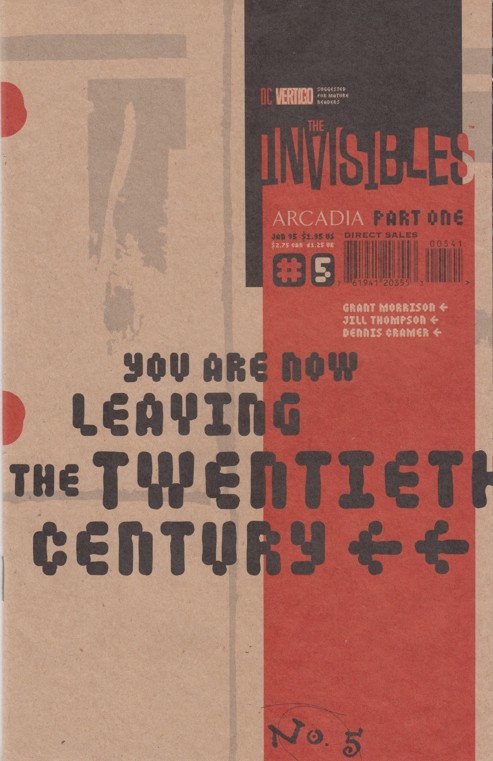
It says "Crash the bus" on the back cover and I fucking get it so hard.
My inherent nihilism doesn't show often because, ultimately, I believe in a humanitarian morality based around kindness and compassion, built upon the foundational belief that nothing exists beyond our short lifespans and any act of wanton cruelty which makes any part of that short and challenging life more difficult for another person is the only true evil in the universe. But I feel the statement, "Crash the bus," deep down in my bones sometimes. Maybe it stems from a carefree and flirtatious relationship with suicidal ideation that allows me to embrace the idea of burning it all down. Most people want safety and comfort and will bargain with the devil to keep as much of that safety and comfort as possible, no matter how illusory it may be (because we have to face the fact that a good illusion may as well be reality). We're living in a Jenga tower where we refuse to restablilize the base even though it's teetering on just three misplaced blocks. And because of that, the amount of true reform that can be applied to this system is limited to what shapes can stand upon those three blocks. Most people are willing to work in that paradigm because they're afraid of starting completely over and losing their current safety and comfort, or because they think those three blocks are too sacred to remove. But imagine if you kicked out those three blocks, or, to sort of get back to the original analogy, crashed the bus into them and brought the whole tower down. Imagine the stable structure you could build if you started from a foundation that was built to support a better, kinder, more just system rather than trying to build that better system on a foundation not meant to support anything like it. Just because a structure has stood for over two hundred years doesn't mean it's still worth living in today, or maintaining its upkeep simply because we've always maintained its upkeep. I often dream of crashing the bus. And believe me, I don't fantasize about it because I think I'll survive the crash. I fantasize about it because I don't think I'll survive the ride.
On the inside cover of this issue, there's a brief description of who and what The Invisibles are. "An organization dedicated to subversive activity in all its forms...the only rule of the organization is disobedience." In an earlier The Invisibles review, I believe I equated this organization to the Upright Citizens Brigade (specifically the show and not the comedy troupe). It's probably why I understood this comic book from page one. My intro or about page on Facebook has simply said this for however long I've been on the cursed site: "My only enemy is the status quo. My only friend is chaos" (that's stolen from the Upright Citizens Brigade intro, just to be clear). So I really can't remember why I stopped reading this comic book. It was right up my alley, even at twenty-three! I highly suspect I just lost track of it because I was a terribly disorganized comic book collector.
I just realized King Mob is Grant Morrison's Mary Sue, isn't he? I had an image of him in my head but I just checked the Internet to makes sure he did look just like King Mob and, well, the Internet confirmed my suspicions. Also while scanning Morrison's Wikipedia entry, I noticed a short paragraph about Morriosn noting the similarities between The Invisibles and The Matrix. You know, like I noticed as well! Me! I noticed it too!
Try to remember that these reviews are really just reviews about me and no the comic books I'm pretending to read but really just looking at the pictures.

Morrison just puts the pieces of the puzzle on the table and you're supposed to put them together. But who does fucking puzzles?! Boring!
In my 30s, I planned on reading every holy book and writing copious amounts of commentary from a person who wasn't taught the dogma behind the words and was simply trying to understand the book with the words that were there. I made it about forty pages through Genesis with nearly three hundred pages of commentary and then the project just sort of petered out. I suppose I'm still alive so I can always restart this project. But sometimes life has a way of kicking you in the brain by distracting you and suddenly eighteen years have gone by and you're all, "What's the fucking point?" The Mahabharata was going to be one of those books. I read part of it in college but damned if I can remember any of it. Hell, I was even going to read Dianetics! I was going to save the Quran for last just in case I invoked the rage of some fundamentalist psycho for interpreting something in the book literally as opposed to the way it's been taught according to centuries of dogma (I was pretty sure I was going to offend Christians as well but Christian fundamentalists are mostly lazy, selfish bastards who wouldn't dare take any risks to disrupt their Earthly life for their spiritual beliefs). The few bits I've read from the Quran that line up with Genesis were far more interesting in the way they sort of held a dialogue with The Bible. Like when Abraham apparently went to sacrifice his only son in The Bible and the book claims it was Isaac. And yet the only time Abraham had an only son was before Isaac was born and his only son was Ishmael. So, you know, it sounds pretty much like The Bible is lying about what happened while the Quran is just telling it like it is (although I'm not sure the Quran ever names the child so that's another part of the mystery! Maybe it was Isaac and somehow Ishmael just didn't count as a true son for reasons. You know the reasons. Maid's sons don't count is the reason).
After teaching about Indian puppetry, Morrison gives the reader a lengthy scene of Lord Byron and Percy Bysshe Shelley discussing their roles as poets in the betterment of the world. With all these conversations of dead artists who died young, I wonder if Grant Morrison is bitter that he's lived so long? Anyway, George and Percy have some interesting things to say but this isn't a synopsis but a review. Also I don't like to comment on things I don't understand, like intelligent dialogue and beautiful poetry and earnest compassion.

Meanwhile, Jack Frost learns that the most important part of being an Invisible is being more paranoid than the next guy.
King Mob has to get back to England after his Indian puppet show and a visit to a Ganesh statue but he hates flying. So instead, he takes a shortcut through the future where the world has been ravaged by a great war and the Berlin Wall was rebuilt but bigger. Probably not to keep people on either side of it (the world seems mostly devastated) but probably just because the few fascist assholes still alive felt building a monument to being controlling dicks was the right thing to do to celebrate.
Some mysterious guy without a face takes the face of some kids' father in a park somewhere at some point. It's hard to tell if this story has a place in time that can be considered the "now" being that King Mob is in a ravaged future and Byron and Shelley are in a long gone past and Jack Frost is in the present. Oh, that's probably the now! And the guy who stole the face of the other guy is probably in Jack's now time.
King Mob returns to his Invisibles cell with information about their next mission. He also lets everybody know that Orlando is currently in London. I think it was Orlando who stole the face of the guy in the park. But that's just supposed to raise the tension because the Invisibles are going to leave their bodies behind in present day London as they time travel to the French Revolution. If we didn't know about Orlando, we would just be all, "Okay, cool! I guess they're time traveling and leaving their bodies so it'll be safe. Not because there are no threats from long-lived assassins without their own faces but because it's fucking time travel and I imagine they can return to their bodies the exact moment in which they left them!" Although the idea that the amount of time they spend in the past is equal to the amount of time their bodies sit unguarded makes a lot more sense than having somebody from the future tell Bill and Ted in his past that their clock is always ticking no matter where they are in time. I mean, it just doesn't make any sense! Especially when they break the rules later and will probably shit all over the time travel rules of their own established universe in the upcoming movie. Anyway, I like the idea that their spirits leave their bodies in the present in this time travel and that the spirits are away exactly as long as they spend in the past. That actually makes sense to me!
The Invisibles #5 Rating: B+. Well, thanks a lot, twenty-three year old asshole me from the past! You just had to stop buying this comic book, didn't you?! And now I have to suffer not knowing what happens! Although I suppose you also suffered that and you seemed to have been fine. Aside from having no ambition and never finishing any writing projects and killing all of your dreams to play more video games. You know. Aside from that, you did just fine. Yeah. Real fine. Idiot.
3 notes
·
View notes
Text
Heart of Steel - XIX
Description: Sir James is known throughout the lands as the most fearsome and honorable warrior. Ballads have been written about him. Men fear him. He is the most trusted knight of King Henry. So why has he given up the glories of war and pledged his loyalty to Princess Y/N?
Pairing: Medieval AU -Knight!Bucky x Princess!Reader
Word Count: 3,294
Series Masterlist
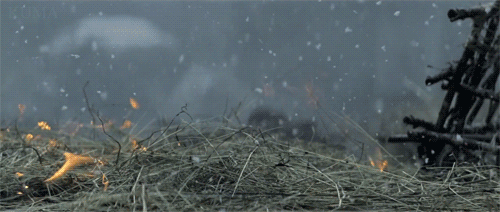

Days turned into weeks. Weeks turned into months. Yet the war continued.
It was the kingdoms’ misfortune that they underestimated their mutual enemy. Hydra must have been preparing for this war long before anyone could ever realize. And now all of them were paying the price.
Y/N helped as much as she could from the confines of the castle. She continued to oversee the food, water, and medical supplies that were delivered to the front lines. She also visited the town folks as much as possible. People weren’t just suffering physically, but emotionally as well.
Y/N tried to keep herself busy. The more time she allowed herself to get lost inside her mind, the crazier she felt and the more depressed she became.
Steve wrote to her. He couldn’t give her specifics on the war in fear that their letters could be intercepted. But he did tell her how much he missed her. It seemed that writing and thinking of Y/N was the only source of light he had during such dark times.
Tony helped with Zamora’s army from the castle too, having meetings with generals and advisors.
King Henry forbid him to ride to battle. After all, he was the heir of Zamora.
Tony hated it. He wanted to be fighting like his friend Steve. But Zamora’s customs were different than those of Midgard’s.
Y/N often sat in council meetings. She learned it was better to observe everything, listen to every man’s opinion, and then save her own for when her and Tony were alone. He always listened to her. Always.
“You were born to be a king, not me,” Tony had recently told her with a sad smile before shooing her off to bed.
To Y/N’s surprise, Bucky did not flee Zamora. He stayed at her side. But things had changed between them. There was no longer that draw between them. The knight was cold and distant, but still watchful of his princess.
Y/N thought it was best to ignore him as well as she could. It was hard, especially after years of feeling a draw to her knight.
Slowly the princess stopped seeing him as Bucky. He was Sir James to her now.
-------
It was the end of a long day now.
Y/N had been helping the medical ward that had been set up in the town square. There were men injured from war that could not return to battle. Some didn’t make the journey back to their kingdom. The rest were now placed on cots.
The princess was no physician or surgeon. But she helped where she could. Sometimes it was just getting fresh water or holding a lonely man’s hand as he died. But it was better than doing nothing.
Y/N was exhausted.
But more than anything… she was sick of watching her people die.
Y/N was lost in her thoughts, barely even having the strength to walk to Moon and ride back to the castle.
So when her foot caught a bump in the footpath, she wasn’t even strong enough to regain her footing or catch herself.
Just as she accepted that she would be falling, a strong pair of hands gripped her waist and pulled her upright.
Y/N blinked slowly, too exhausted to fight the grip of a stranger.
It felt like a dream as she looked over her shoulder to see that it was Bucky who was steadying her.
How long had he been following her?
She hadn’t seen him anywhere in sight when she was helping the wounded.
The knight observed her face and body for a moment.
Y/N wished he kept his grip on her hips just a few seconds longer. But he let go as soon as she was steady.
“When was the last time you ate something, Your Highness?” Bucky
Y/N touched her forehead, suddenly realizing how lightheaded she was as well. She shrugged and shook her head. Not really answering his question, but brushing it aside altogether.
Bucky sighed in disappointment.
Y/N barely heard him whistle to Persephone.
His loyal steed came cantering to his side.
Without warning her or asking for permission, Bucky lifted Y/N into his arms and planted her on top of the saddle. There was barely a second before he was swing his legs over and placing himself right behind her.
Y/N wanted to yell at him, to reprimand him for manhandling his princess.
But she was so exhausted and she realized how much she missed him. Though he had frequently been at her side, he was distant in every other way.
So Y/N welcomed the feeling of his warm body pressed against her back and his arms wrapped around her as he reached for the reigns.
“Thank you,” Y/N muttered so quietly that she doubted he could even hear it.
“You would have fallen off your horse and broken your neck,” he scolded before making a clicking sound to urge Persephone forward.
Y/N gave a lazy smirk. It felt like old times for just one moment.
She decided to say nothing.
“You have worked yourself to exhaustion…” Bucky continued.
Y/N rolled her eyes, even though she knew he couldn’t see it. “My people need me.”
“Yes, but they also need you alive and healthy too.” He countered.
She didn’t have the strength to argue with him.
The ride from the town square back to the castle only took half an hour or so.
But Y/N was so tired and relaxed in the arms of Bucky that she fell asleep. Her head rested back between the knight’s right shoulder and bicep.
“Is she alright?” Y/N recognized the voice of Peter in her sleep. It sounded like a dream.
“Do not wake her,” Bucky hissed in a hushed voice.
Y/N could barely feel herself being moved from the saddle to someone’s arms.
—————
Wanda watched as Bucky carried Y/N’s sleeping body into her bedchambers and carefully slid her into bed.
The servant girl’s heart warmed as the knight pulled the covers up to the princess’ chin.
When Bucky turned to leave, he stopped at the expression Wanda gave him.
“She misses you,” the servant muttered quietly. But there was malice in her eyes.
“I have not left,” the knight answered before continuing his walk past her.
“You know what I speak of, Sir James.” She closed the bedroom door behind her as she hurried after the knight. “Why did you push her away? She told you she loved you! She gave you her heart, the thing she has protected most in her whole life... and you trampled it!”
“Enough, Wanda!” Bucky groaned.
“No!” Wanda snapped and grabbed his arm, whipping him around to face her. “People sing songs and tell tales of your bravery. But I see you for what you truly are: a coward.”
Bucky remained emotionless by her insult.
Then he looked at the ground. “I…I cannot give her what she wants. You know this. I know this. And so does she.”
“But do you truly not believe sharing your true affections is still worth it?” Wanda whispered.
Bucky clenched his jaw and stared into the servants eyes before shaking his head.
He turned and rushed to the door, throwing it open.
“You will regret it,” Wanda told him.
He paused in the doorway, letting the words settle over him.
But he gave no reply before storming out the door.
—————————

6 Months Later
Y/N was laying in the grass of her garden, staring up at the clouds and trying to figure out what each one reminded her of. She had been forbidden from helping the wounded or monitoring the rations today.
Tony and Bruce had rallied against her. She suspected Bucky might have had a secret role, as well.
If she couldn’t help, she would hide away. It had been months since she visited her garden. Part of it was because of the changing seasons. The other part was because she had been avoiding it.
Y/N was punishing herself, ridding her life of anything that caused her joy.
She never went riding, only using Moon to travel back and forth to the town square. She didn’t read her favorite books, telling herself that she had better things to do than spend time on such hobbies. Lastly, she avoided her garden because it brought her solace…solace that she didn’t deserve. Furthermore, being there reminded her of Bucky and the few stolen moments that life was charitable enough to allow them.
Now it was fall, she’d missed the beautiful blooming that spring brought and the bright colors summer then provided. But now she saw the leaves changing and heard the crinkling of them with every breeze, and she remembered how much she loved autumn.
Y/N was brought out of her daydreaming when she heard and felt heavy footsteps approaching.
She knew Bucky was the only one with access to the garden besides the greenskeeper. Yet she was still surprised to see him.
Y/N noted the tension in his body. But his face remained calm. It didn’t mean anything though: he was trained to never show panic or fear.
“What is it?” Y/N asked him. He had not come to her garden since the last time they kissed. She knew he would not enter unless it was something dire.
“I think it is best you come to the courtyard, Your Majesty.”
Y/N narrowed her eyes in confusion. “Why? What has happened?”
“The tower watchmen spotted a couple riders approaching the castle. One was riding with a banner of Midgard.”
Y/N’s eyes widened. “Steve!” She gasped before jumping to her feet and running past Bucky.
She was barefoot. Her hair in a wavy mess that was far too improper for a princess. She was in a dress that even a commoner would wear, for she did not know she would be forbidden from helping wounded that day.
But she wasn’t thinking about how she looked as she sprinted to the courtyard. But she didn’t stop there. She kept running and ran straight through it and to the gates at the castle walls. She didn’t even notice the crazy stares she got from townsfolk, nobles, and guards.
Y/N walked onto flying bridge and stared into the horizon.
She saw Dame Natasha first, her red hair sticking out from everything else.
Next she saw Sir Clinton and Sir Samuel.
Then Y/N let out a gasp of relief when she spotted Steve amongst the four of them. He rode at the back of the group, which was why she didn’t see him at first.
It worried Y/N that her two knights were accompanying a foreign king. Was it possible that they were all that was left of Zamora’s army?
Suddenly, Y/N felt a presence behind her.
She turned around to find Bucky standing guard. But he wasn’t looking at the princess or the approaching riders. Instead, he was scouting the horizon to see if there was an enemy lingering or some surprise attack trying to be executed, using Steve as bait.
Y/N squinted when she saw that only one of Steve’s hands was holding the reigns, while the other one was holding a sack of some sort.
The four riders came to a halt quickly. Y/N had to take a quick step back to prevent herself from getting trampled.
“What is it? What has happened?” Y/N looked up at Steve only.
He tossed the sack on the ground and it rolled to the princess’ feet.
Y/N felt sick when she saw there was blood soaking the bottom of the sack.
“King Alexander’s head,” Steve clarified darkly.
Her eyes widened, realizing what this meant. If Hydra’s king was dead, then that must mean…
“The war has ended,” Steve declared.
Y/N was about to smile, but then she finally took Steve in. His skin was pale and sweaty. There was red shadows lingering on his skin beneath his eyes.
Suddenly, the king’s eyes rolled to the back of his head and he started sliding off of his saddle.
“Steve!” Y/N screeched and rushed forward.
Bucky beat her to the king’s saddle thankfully and caught Steve before he could hit the ground. He lowered him to the ground and called over his shoulder for a medic.
Y/N instantly kneeled to the ground and was cradling Steve’s head in her lap as she called his name.
She looked up at the knights that had accompanied him back. “What happened?”
Natasha looked just as shocked as her and was shaking her head. “He-he said he was scathed in battle... b-but that it was nothing to worry about…” Her voice was numb.
Y/N’s fingers were desperate as they unbuckled his armor and rid his body of it. When his chest plate was removed, she saw a huge stain of blood on the right side of his torso, just under his pectoral muscle.
“Steve? Steve, please!” The princess begged as she rain her fingers through his hair.
His eyes fluttered open at her calling.
But he closed them before smiling almost with delusion, “Hello, my love.” His voice was but a mere sigh.
“Please, stay awake.” Y/N urged him.
Steve nodded numbly, trying his best to calm her and listen to her pleading.
Suddenly Bucky was pulling her away from him as servants ran a canvas stretcher to the king and carefully placed his body on it.
Y/N tried to rush after them as they hurried Steve away. But Bucky pulled her against his chest and stopped her from moving.
“You have to let them help him,” he whispered comfortingly in her ear.
Everyone was too preoccupied with Steve to notice the intimate solace the knight gave his princess.
Y/N allowed herself to go limp in Bucky’s arms…but only for a moment.
She pulled away slowly and wiped away her tears with the back of her hand.
Bucky leaned forward and brushed her messy hair off her face. Then he brushed a lingering tear on her cheek away with his thumb. “It will be okay,” he whispered reassuringly to her.
Then it seemed he snapped back to reality and realized they had an audience. He quickly dropped his hand and took a step away from her.
By some miracle no one seemed to notice the intimate moment except Natasha, Clint, and Sam. They looked at him almost pathetically, seeing how hard it was for Bucky to be near Y/N when she was in distress and not able to do anything to help her.
Y/N’s eyes fell on the sack filled with King Alexander’s head.
Taking in a deep breath, she grabbed it and headed back toward the castle. She marched into court, knowing her father and mother were lingering there.
The ignorant and pompous nobles gasped at her attire and the sack she held that was dripping blood at her feet.
Y/N looked around the room and then found the eyes of her father and king.
When she did, she tossed the sack forward. “The King of Hydra is dead. The great war is finally over.”
People blinked in shock before processing the words she actually said. Then the room erupted in cheers. But Y/N saw no cause for celebration. How many lives had been lost to get here? Yes, the suffering had ended. But the scars would remain.
Y/N slipped out of the room with the chaos of jubilee that had now taken over the room.
She heard Bucky following a few steps behind, but tried her best to ignore his presence.
The knight already knew where she was going.
Y/N turned the corner to the infirmary.
Bruce seemed to be expecting her already, knowing the princess would not be able to stay away from her betrothed.
“He will be just fine, my dear.” Bruce told Y/N gently.
“He fainted and fell off his horse. That wound… H-how will he be fine?” She challenged.
“Because he did not treat the wound immediately, it continued bleeding. Blood loss causes lightheadedness. And he lost a lot of it. But I cleaned the wound and stitched it up. Right now... he just needs rest, Your Highness.”
Y/N let out a giant and shaky exhale.
Bruce gripped her shoulder and gave her a small smile. “You can go in and sit with him, Your Highness.”
She nodded before quickly going inside.
Bucky waited outside, his hand resting on the hilt of his sword that was strapped at his waist.
Steve sat up in bed when he saw Y/N enter. His eyes lit up with love, but it flickered when he saw that she was glaring at him.
“Do not scare me like that ever again,” Y/N snapped and she made no move toward him. Instead, she stood her ground and crossed her arms.
“Forgive me,” Steve muttered, eyes genuinely fearful of his betrothed’s wrath.
Y/N stance seemed to soften then. “Can it really be true? Is the war truly over?”
Steve nodded, “I promised I would not return until it was won. I brought his head as an offering to you. Hydra cannot harm you ever again, Y/N.”
“You really know how to woo a woman, Your Majesty.” Y/N couldn’t stifle her giggle.
Steve’s heart melted. “I have missed that sound.” Then he blushed when he realized he had said it aloud.
And just like that, the Steve she had first met returned and the general king was hidden away once again.
Steve reached a hand out to her. “Please, come here.” The distance between them was growing more and more torturous.
Y/N did as he requested, already deciding to give up her tough love act.
She sat down at the edge of her bed. But that wasn’t enough for Steve. He pulled her down so she was laying in his arms, her head resting on his shoulder.
Silence settled between them. Neither of them really knew what to say. They had been apart for so long. But ever so slowly, they started to remember the problems they had left unresolved when Steve went to war.
“I have missed you,” the princess whispered ever so quietly.
“I promise... it was not as much as I missed you,” Steve countered as his grip on her body tightened ever so slightly.
——————
Bucky couldn’t sleep. It was nothing new. But tonight, he felt extra restless. Perhaps it was because he was still worried for Y/N. Bruce had confirmed that Steve would be fine and make a full recovery.
The knight had no idea how Y/N would react if anything were to happen to the King of Midgard.
Bucky knew she loved him to some degree. He saw it in her eyes. But what he saw even more was how hard she had to try to hide her feelings for the king. Bucky wondered if it was easier or harder than it once was hiding her feelings for him.
But the knight was brought out of his reverie when there was a harsh knock at his bedroom door.
His body tensed.
But his hand immediately went for the knife he hid under his pillow every night.
When he opened the door carefully, he was met with Dame Natasha.
He said nothing, waiting for the lady knight to speak first.
“The King of Midgard wishes to see you,” she told him.
----------------
Part XX
Just a heads up, there are only a few more chapters left in this story. Don’t panic lol
#heart of steel series#heart of steel#knight!bucky#knight!bucky x princess!reader#knight bucky barnes#bucky knight au#medieval!avengers#medieval marvel au#medieval!bucky x princess!reader#king!steve rogers#king!steven rogers x princess!reader#king!steve rogers x princess!reader#medieval!steve rogers
927 notes
·
View notes
Text
# Who is / isn't Jew in biblical term? (Ver.8)
‘Jew' in English language is today used very widely without knowing its true meaning. So, many people, even Jews don't understand properly its origin. English bibles translated 'Yehudi (species of Yehud)' as "Jew". That's the problem.
Therefore, I have to explain you what 'Yehudi' is really in Biblical sense, so that you should know the difference among 'Yehudi' & Jew & Children of Israel.
<'Yehudi'? Or People of Judah? Not Children of Israel?>
The point is :
"Why nobody called people of Judah as 'Yehudim' until the time of Babylonian invasion?"
... If you believe that 'Yehudi' is purely Judah's descendant, it would be strange. Many people & Jews assume it's same. But in reality, not so. Such an example exists in the Bible.
For instance, Benjamin (son of Jacob) & "Ben Yamin" are not same. If you read the episode of Shimei in 2 Samuel 16:5-13 & 19:16-23, you'll know how to be used the phrase "Ben Yamin". It never literally means biological son of Benjamin. It's a title of brave for justice. Same is 'Yehudi' & Sons of Judah. It is distinct how & when to use 'Yehudim' or 'Bani / 'Am / Enashim / Ish Yehudah'.
"Hanani, one of my brothers, been arrived with 'mankind' from Judah (Hbr: Enashim mi Yehudah), and I (Nehemiah) was continuously questioning them about the remnant of Yehudim (Hbr: Ha Yehudim) who had survived out of the exile and about Jerusalem." [Nehemiah 1:2 (my translation from Hebrew)]
... Interestingly, people from Judah is described 'Enosh (nuanced "weak mortal Human")' against 'Ha Yehudim" the super Human.
In the Old Testament (OT; Tanakh), people of Judah is always written 'Bani (sons) / 'Am (people) / Ish (man) Yehudah' as same as "Children of Israel (Bani Israel)". 'Enashim' is rarely used due to its nuance. So Nehemiah 1:2 looks strange for frequent Hebrew Bible readers. Not normal case. It's not that people of Judah asked people of Judah.
So it's clear that Yehudites are not people of Judah.
If you believe it's same, I'd say why people from Judah didn't say in Nehemiah 1:3 that "we" are suffering when Nehemiah had asked them about "Ha Yehudim". It indicates that "Ha Yehudim" are at least not direct category of Judah or another specific group there, right?
Look moreover at spellings.
1, Yehudi : Y + H + W + D + Y (Yehud + Y; Species of Yehud)
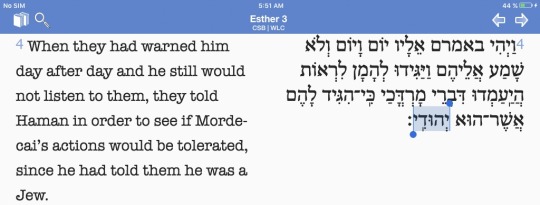
2, Yehudah (Judah) : Y + H + W + D + H (actually, Jehovah including D: Dedication, Love, something Special, chosen)

... The critical difference is that "Yehudi" doesn't have Jehovah, but Judah has it. Not only spellings. The tribe of Esau is made by Judith (Yehudith) the Canaanite while Judah left his sinful brothers who cruelly wanted to kill Joseph and tried to build family with Canaanite women but failed under Jehovah's interfering and subsequently made kids with Tamar (Genesis 38) who would later become the royal line for David.
I quoted above the name of Judith from Genesis 37:26. She is the key role of this issue. Here I put a critical verse for it.
<True language for the Holy Text>

... 2 King 18 narratives that Hezekiah's 3 agents asked Rabshakeh not to speak "Yehudith" but Aramaic. That's strange. CSB translated it "Hebrew", but 'Ha 'Avri' never occur in this verse. It's "Yehudith".
Rabshakeh is a royal spokesman from King of Assyria. He should know Aramaic but not Hebrew, IF YOU BELIEVE THAT HEBREW IS THE ORIGINAL LANGUAGE OF JEWS. So now raises the question.
Why Assyrian originated person can speak "Jew's language"?
If you believe that "Judaean / Hebrew" is the only one language for so-called Jewish or Israelites, this belief would be wrong. Rabshakeh exactly can speak this Judaean (Read 2 King 18:26-28). So let's see the spelling of Judith the wife of Esau.
... Surprising? Yes, it's completely same! Read also Nehemiah 13:23-24.
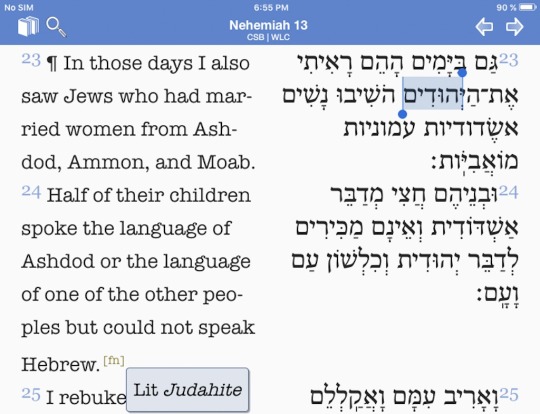
... See that Yehudim's language is Judith! This translation "Hebrew" is totally wrong.
So what is language of Judith? It's the Canaanite language.
Historically, Canaanites are Phoenician whose activity place was through Mediterranean to Aegean Seas (Check also Numbers 13:29, Deuteronomy 1:7, Joshua 5:1). And Paleo-"Hebrew" is the oldest written language for the Jewish Bible (Tanakh). What is Paleo-Hebrew? It's a variant of Phoenician! So you obtained the answer now.
"Yehudith" = Judith's = Canaanite = Phoenician = Paleo-"Hebrew" = Jew's language
So it's normal that Assyrian tribe may speak Phoenician.
Then, these factors strongly prove that the author(s) of Tanakh should be the Canaanite / Phoenician tribe. Therefore, "original Hebrew language" never existed. Seeing Abraham & Isaac's stance "Never take Canaanites wives", it is impossible that Jehovah's people who believes and follows this tradition would wish to write own holy text from god in Canaanite language!
On the other side, today's so-called Hebrew language is actually Aramaic-linked variant. So it's normal, too that people of Israel can understand Aramaic. In fact, it was Aramaic which had been a common language among Semitic people because Abraham's clan is originally Chaldean. Babylonian Talmud is written after exile by Aramaic with Mishnah "Hebrew" which is actually Canaanite based.
Then, you might be harsh to say that Esau's tribe is the true "Jewish people"? My answer is "kinda yes". Let's analyze it further.
<Conditions of Yehudi; Judith & her background>
Finally, you know that oldest Jewish language is actually coming from the tribe of Judith who is Esau's wife. If you carefully read in Hebrew about her linkages, you may know what it is exactly.
First of all, the word 'Judith' means "praised". Then, Esau & she later changed own names to Edom ("Red"; or Adam) & Oholibamah ("Tent / Dwelling / Home of high place"). According to these factors, we may imagine that Judith is a woman of high-rank among her clan.
The question "Judith is really Oholibamah?" is later confirmed by her parent name Anah & Beeri.
The point we should focus on is that Anah the parent of Oholibamah / Judith (Yehudith) is mentioned both as son & daughter! (Genesis 36:2, 14, 20, 24) Torah's author is showing this symbolism of Elohim ("Creator" God) model who have 2 genders. The original Adam in Genesis 1:27 was designed as male & female (because he was God's copy). Unity of 2 pairs.
This symbolism is used also for righteous king Hezekiah (Hbr: Yuhizeqiyahu) who miraculously could restore Israel & Judah to unite each other. His mother's name is Abih ("Father of Ya") / Abi ("My father").
So the Holy text readers in Hebrew well know this type of hint that the author of Torah used to drop.
Adam & Eve (Hbr: Havah) ate the fruits from forbidden tree and started to cover own self by tree leaves (Genesis 3:7, 3:21). Esau was also covered full of red hair like coat (read later the meaning of Seir: same concept) in the birth moment (Genesis 25:25). Both are biblically sinful. However, Esau rejected his sinful fathers & their traditions by bitter emotion from Spirit (Hbr: Ruah; unlike Nephesh, this type of Spirit is God-associated) and married the daughter of Beeri / Anah who has inner female & male. Then, his clan became "Edom / Adam".
... Interesting?
*Condition of Yehudi : Deny own sinful family & traditions for justice
*Condition of Yehudi : Godly Spirit to hate the Evil & unfairness
When Esau had being born, Jacob (Hbr: Yaaqob) was grasping his heel (Hbr: 'Aqeb). This scene recalls us Genesis 3:15 ;
"Seed (Hbr : Zera) of Woman / Mother shall seek to crash Snake's head and Seed of Snake shall aim to attack the heel"
This destiny of twin is exactly planned by Jehovah against Jacob & Esau (Genesis 25:23). In fact, they got separated by the conflict & jealousy due to Isaac's discrimination.
Grasping the heel of Esau reflects the nature of Jacob as a Seed of Snake, so Esau should be a Seed of Woman. But he is a male. Elohim model!
*Condition of Yehudi : Having male & female (inner selves, names, roles; not literally)
Then, he became "Edom (Adam + vow letter; true Adam?)" to reject the old name Esau ("hairy") which his sinful father Isaac had given him and his Canannite wife Judith (Yehudith; the first one of "Yehudi") became the "tabernacle / dwelling of higher place".
*Condition of Yehudi : Erasing the birth name
This Species of "Yehudi" is the Seed of restored sinless Adam with unity of 2 pairs (female & male, left & right handed, etc) who have the power to crash Evil.
*Condition of Yehudi : No original sin or fixed (Godly person who love harmony and avoid sins)
Note that it was Esau who has forgiven Jacob. The right of inheritance for sinful tribe is not important for him. Red haired mighty man prefers Red foods to satisfy himself (Genesis 25:25-30) and became true "Red (Edom / Adam)" by rejecting own family and marrying the foreign race.
*Condition of Yehudi : Red-haired
*Condition of Yehudi : Loving Red foods (Ex: red soup)
Read also Jeremiah 40:11-12.
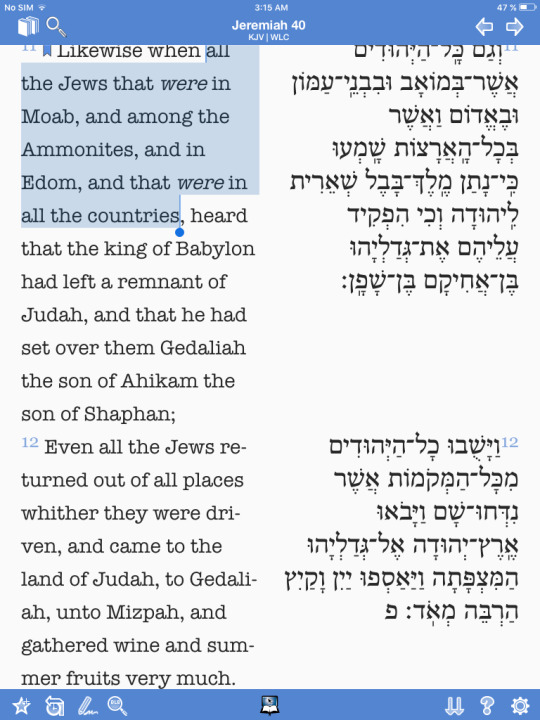
... Yehudites used to live in other tribes or countries as same as Jews in our world, contrary to the House of Israel & Judah who preserve the ethnicity & nationalism under Jehovah's religion. Yehudites are not belonging to this House. That's the critical difference. Esau & his clan didn't practice Abrahamic traditions (Ex: sacrifice, circumcision, Altar worship, burying own kins to Hebron / Kirjath-Arba : the City of Giant Anak!!), nor commit the unclean life to set apart among gentiles (Ezra 9:1-2 shows that Edomites are not included in "Goyim List" who taint the Holy Seed). In Daniel 1, 3 Yehudites & Daniel avoided the king palace's foods and took the food controls not to be defiled (Also read Ezra 9:11-12).
*Condition of Yehudi : Marrying or living with foreign races
*Condition of Yehudi : Not following nationalism or fascism
*Condition of Yehudi : Not joining to Jehovah's religion (Ex: sanctifying by blood)
*Condition of Yehudi : Keeping clean lifestyle
*Condition of Yehudi : Taking care of healthy foods ("Kosher") not to get defiled
... Look further at the details of Judith's background.
Anah's father is Zibeon (Tsib'on; sounds similar to Simeon) which means "coloured". He is a Hivite ("villager") whose origin is derived from the word "Havah (Eve: Adam's wife)". Eve is the mother of ALL THE LIVING (not only for human). In fact, this linkage is Seir ("hairy" or rough mountain as if clothed by trees like hairs; recall Esau and Eden story in Genesis 3:7 & 3:21); the Horites who are Cave dwellers. These names exactly indicate what they are really. Imagine.
Interestingly, it was Anah who had found the spring in Genesis 36:24 as same as Hagar for Beer-Sheba (later Simeon's territory) in 21:14-21. Genesis 26:34 also shows that Judith is the daughter of Beeri ("My Well / Spring"). So Shekinah Glory is with this linkage (The difference is that Hagar found the lifeline water in desert with help of God's messenger while Anah found it by him/herself; Know that spring & fountain are associated with Eye of God or Divine Jacob in the OT, for example Ezra 5:5, Deuteronomy 33:28). Shekinah is always there, while Lord God used to come and disappear. Remember that in the stories of Joseph, Esther, Ezra & Nehemiah, Lord God don't speak nor appear. But Joseph, Mordecai & his fellows are invincible and protected by people. And it was only Yehudites under God's Eye who restarted to build Jerusalem despite the threats of enemies (Ezra 5:5). God is with 'Yehudi' (Zechariah 8:23).
*Condition of Yehudi : Shekinah (lifeline protection) without prayer
Later, Sons of Esau chased away Horites the cave dwellers and destroyed them (Deuteronomy 2:12 & 2:22) as the Seed of Woman crashing the head of Snake. They eliminated these monstrous ancestors as if denying own evil background and built the new settlement on there.
*Condition of Yehudi : Seed of Woman / Mother (not always biologically) to crash Evil
Such a passion, dedication to justice is shown in Mordecai. It was him who had leaked the Persian king through Esther about the assassination plan against him. So Yehudites should be the people of Justice. In fact, under the order of Esther & Mordecai, Jews destroyed own enemies who conspired Evil but didn't steal their goods, because they're fighting for justice & self-defense, not for war nor greed, while Children of Israel used to engage wars to take plunder from enemies in the name of god. You should know that Mordecai & his fellows could steal enemy's money & treasures so that their clan can become more powerful like former Children of Israel. That would be good for them, but didn't do that. Why? The story clearly shows that their aim is the fight for dignity. Think twice.
"Mordecai 'Yehudi' was 2nd (Hbr: Mishneh; sense of imitator or dual) to King Ahasuerus and great among 'Yehudim' and highly esteemed by many of his Brothers by committing the Good for his people and speaking 'Shalom (The well-being, wholeness, health, "perfect" state, harmony or friendliness)' to all his Seed (Hbr: Zera)." [Esther 10:3 (My translation from Hebrew)]
*Condition of Yehudi : Fight for justice, dignity, self-defense or own beloved
The Hebrew word 'Zera' is not really the biological stuff, but also something like talent or DNA heritage. I will explain more about this aspect.
<Tribe name or Talent?>
Esau's offsprings have been living this region Seir including Elath until Aram king Rezin expelled "Yehudites" (2 King 16:6).
... Not Edomites? But Yehudites? So it's the Species of Judith? This naming itself signifies us "Seed of Woman / Mother". Not sons of Esau, but Judith's. They're the pure Seed of Woman / Mother among Edomites (Adam), when the author wrote 'Yehudi(m)'.
Probably, you might get aware that 'Yehudi', 'Hivi', 'Hori', 'Edomi' is not the naming of biological linkage. Tribe name should be only one. So it looks strange that Anah is of Hivite & also Horite, especially in Semitic sense considering only father's bloodlines. So it'd be ideal to determine that these naming is the species, type, category or even trait, not clan's.
Judith's ancestors are monstrous, however Esau the New Adam & his High Tabernacle created the new generations to deny their ancestors and annihilated Seir the Horites. But the Hivites (species of Eve) are remained while Horites never appear after this event. Interesting, right?
So all the Esau's descendants are biologically Yehudites? Unfortunately, No. We should focus on this factor : The author of the Holy Text is not always describing 'Yehudi' for Edomite. In the almost of verses, it is "Edomite" or "Son(s) of Edom / Esau". 'Yehudi(m)' is used in limited aspect. We should consider this factor to distinguish 'Yehudi' with biological son of Esau or Judah. As I mentioned, Judah's descendants are described in almost of case as 'Bani (sons) / 'Am (people) / Ish (man) Yehudah' as same as "Children of Israel (Bani Israel)". So 'Yehudi' is the trait or talented species in Edomites.
By the way, some people might ask "Judith (Yehudith) became Oholibamah. She lost the name 'Yehudi', so she is not Yehudite anymore?" I answer this question.
In the Book of Daniel, there are 3 Jews : Shadrach, Meshach & Abednego. Actually these name are given by the prince of the eunuchs in Babylonian Exile period (Daniel 1:7). Abednego is derived from "servant of god Nabu / Nebo (See Isaiah 46:1)" whose father is Marduk. So Daniel's companion Azariah forcibly got renamed as foreign god's servant, but he & his rest fellows Hananiah & Mishael could survive in the midst of burning fiery furnace (Daniel 3:8-30). So name change never affect the power of Yehudites. Yehudi is always Yehudi even though he/she changed the name. Same is Mordecai ("Worshipper of Mars" or "Marduk's species").
In our real life, your talent will disappear by name change? Of course, no. Heritage is not inherited to all the biological descendants, but its talent is always preserved, if you have the trait. That's it.
*Conclusion : Not all the biological nor religious Jew are 'Yehudim'
... It's the trait. So how many conditions above are fulfilled is the criteria.
The ability of Super Human is described more in the Jewish Bible.
I introduce it further now.
<"Ben Yamin"; Pair of Right & Left>
"Ben Yamin" is the title of mighty man with right & left handed. It's not about Benjamin tribe. In Hebrew, spelling is different.
One of the greatest "Ben Yamin" is Ehud the son of Gera (Judges 3:15). Similar name to 'Yehud'.
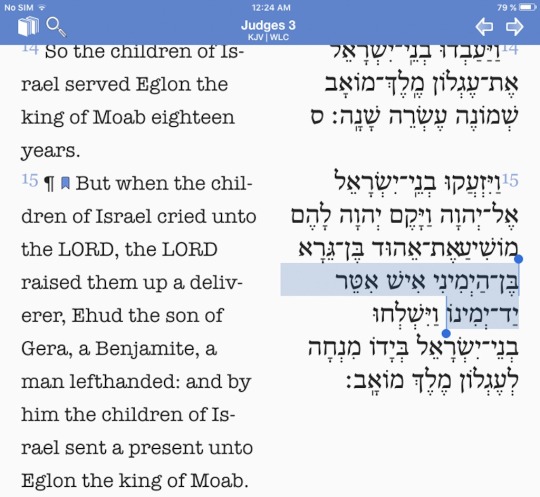
... He is the son of Gera who is a biologically direct Benjamin's descendant. Not only that. Ehud is "Ben Ha Yamini"; the person of left-handed with right-handed who would save Children of Israel from Moab's oppression.
The story is interesting. Ehud brought 2-edged dagger and put it in his right leg. And took it by left hand to kill the king Moab (Judge 3:21). This episode is absolutely not a random event. The design of the author is reflected. Numerology "2" & pair. His name Ehud is derived from 'Ohad (unity)' & 'Ahad (to unify)'. 'Yehud' is also similar to these words.
These factors show the nature of 'Yehudi' : Balance of Pair, Unity
Jamin (Yamin) is the 2nd son of Simeon (Genesis 46:10). Simeon himself is the 2nd son of Jacob, so "Ben Yamin" is 2-2 as symbolically pair of 2 opposite elements. See also that Jewish Mordecai's ancestor Jair (son of Manasseh, but also Judah's descendant; 1 Chronicles 2:22) served Israel as Judge for 22 years (Judges 10:3).
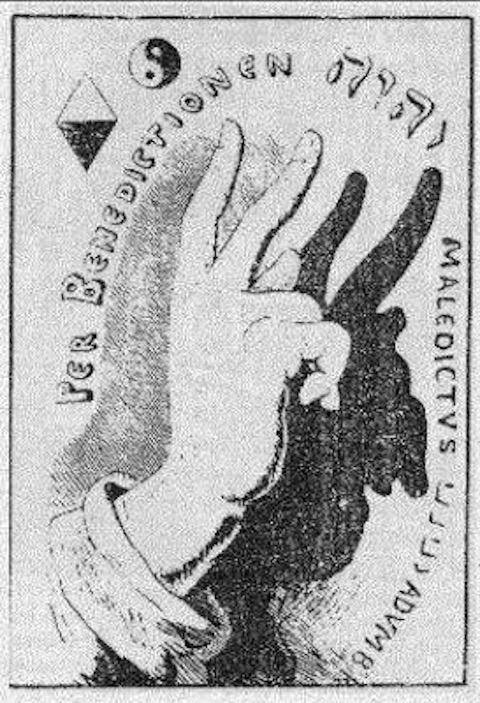
Interestingly, Simeon is excluded from Moses' "blessing" in Deuteronomy 33. While Israelites are not so successful or have short-term success under Lord Jehovah, "Ben Yamin" & the Seed of "Yehudi" (especially Mordecai & his fellows in the Book of Esther) are invincible. Mordecai's possible ancestor Kish the father of King Saul is also the "Ben Ish Yamin" (1 Samuel 9:1-2).
Shimei (possible ancestor of Mordecai) is also called by David "Ben Yamin" in 2 Samuel 16:11 because David acknowledged Shimei as David's own spiritual son coming from his belly to rebel him for justice and admitted Shimei's brave action as Lord's will. Shimei cursed David, but he forgave Shimei (it means that he rebelled the king to risk life but got saved; Shekinah Glory!).
The OT has many Shimei. In 1 Chronicles 23:9-10, there are 2 Shimei (double-counted). Under righteous Hezekiah, Shimei is the 2nd officer to serve him (2 Chronicles 31:12).
Seeing these factors, we cannot deny that "Ben Yamin" is associated with numerology "2". Moreover, this phrase begins by 2 letters; 'Bet (2nd letter of biblical Hebrew)' & 'Nun (14th letter; it's holy number)' and ends by holy 'Nun' again. The first & last letters of "Ben Jamin" also becomes "BN (Son)" (which means Christ for Christian). 'Ben' itself means holy "2". The phrase "Ben Yamin" has 2 words.
On the other way, Mordecai the hero of Jews is "Ish Yamini (person of Yamin's species)". It begins by 'Aleph (1st letter; symbolism of God)' and ends by 'Yod (10th letter; initial letter of Jehovah)'. So he prevails all the number (1-10). He starts at 1 and at last becomes higher position (10 means higher rank than 1-9). This numerology itself shows his life. It's a progression. Also, he has Elohim & Jehovah as pair (Lord God). He was "2nd (Hbr: Mishneh; sense of imitator or dual) to King Ahasuerus" (Esther 10:3).
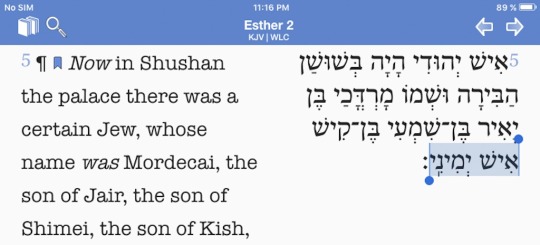
... Esther 2:5 described Mordecai in Hebrew "'Yehudy' [...] Ben 'Yaiyr', Ben 'Shime'iy', Ben 'Kiysh' : 'Iysh Yamyny'".
Is this just genealogy? Of course, No. These ancestors are all associated with numerology "2". Then, he is a "Man of Yamin (right-handed with left handed)".
In Semitic languages, the term "Man of Right-hand" signifies successful person or great one. So right-handed with left-handed is not only symbolical state of pair but also simply the mighty man who can handle the difficulty with 2 arms.
The word 'Esau' has similar meaning. It's apparently a form of the passive participle of verb 'Asah (to do, fashion, make, accomplish, etc)' in the original sense of handling; rough. Struggling, but talented.
The concept of Super Human 'Yehudi' reflects these elements. It is easy to realize how vulnerable & unstable life the Children of Israel was. They had temporarily success but couldn't keep it all the time. Lord God are not always caring about their lives (they don't have Shekinah Glory). They're inheriting the traditions of Abraham & Moses, however their spirits are so weak to temptations (It's 'Nephesh'!).
So you might ask "Why failed? What was wrong? What is the condition?"
Let's analyze the consequences & Babylonian exile events now.
<One history, Two witnesses>
Books of Kings & Chronicles have same historical records, although it has different details. Why different? Which is the liar? That's the point.
Of course, we should consider the possibility of mistakes or errors by scribes. But according to my research, this "contradiction" is aimed by the author.
The Bible is Word of God & Holy Text. But this DOESN'T MEAN THAT ALL THE STATEMENT OF EACH VERSE SPEAK FACTS. The Bible is truly the riddle and great provocation. We have to see the cause & result in each episode to think "Why?" That's God's challenge to us. The one who is not doubting the brutality nor seek true God would be entrapped by literal story which promote the bloody religion for success and would be destroyed by own greed. Both the OT & NT are so designed.
Why different? Let's pick up the example of case after Aram expelled Yehudites from Elath and see what's next. The details are not same between 2 Kings & 2 Chronicles. I write the summary about it below :
Book of 2 Chronicles (Ephraim side) : The king of Aram attacked Ahaz's dynasty to deport people in Judah and Pekah killed 120, 0000 people; all the "Sons of Brave" (Hbr: Bnei Hayl; men of "Force") in Judah. Yehudites are not found here. Israelites captured the people of Judah. The prophet Oded lectured them not to enslave their own brothers & sisters. Israelites changed the minds and helped them to send Jericho. Then, Edomites came to Judah to capture. Philistines, too. But after that, sinful Ahaz died and his son Hezekiah (Hbr: Yuhizeqiyahu) miraculously restored Israel & Judah to unite each other. His mother's name is Abih ("Father of Ya") / Abi ("My father"). The female has male name (model of Elohim). No mentioned about killing or capturing Edomites / Yehudites. Then, Assyria's servants came by Yehudith language to deceive & threaten people in Jerusalem (it means there are Yehudites). But Jehovah sent agents to annihilate the army of Assyria and its king got killed by his own children. Moreover, Moses' Torah got found from the Temple to restore the Laws of Jehovah. Then, Babylon came to Judah, but not so cruel. Jehovah is quite merciful and used to send agents to convince His people to repent, while they were not listening. Finally, His wrath got stirred up to send horribly brutal Chaldean army to steal everything, kill the people, destroy the Temple & Jerusalem. But the story ends by mentioning the hope of Persian king Cyrus to save Israel.
Book of 2 King (Judah's side) : The king of Aram Rezin expelled Yehudites from Elath (former Edom's territory), then Assyria killed Rezin and captured Damascus to deport its people (Aramean) into Qirah. However, the Kingdoms of Israel & Judah started to be enslaved & deported by Assyria, which then brought foreigners to Samaria (Main land for Kingdom of Israel) in order to taint its holy place. Even righteous Hezakiah (Hbr: Yuhizeqiyahu) could not stop Assyria from capturing & destroying Judah. Later, Jehovah avenged Assyria, but didn't completely annihilated all their force. One more righteous king Josiah came to restore Torah traditions, but he couldn't change Jehovah's decision to remove Israel & Judah (2 King 23:26-27). Not only Babylon also Chaldean, Aramean, Moabite, & Ammonite armies (but not Edomites) came to Judah due to sins of king Manasseh. The consequence is terribly worse than stories of 2 Chronicles. Almost of people in Judah got deported to Babylon. But Ishmael & his 10 men killed Babylonian watcher Gedaliah, Yehudites & Chaldeans and escaped to Egypt. And in the end of the story, sinful traitor Jehoiachin who had sold his own people & treasures got released from prison by a new king of Babylon.
... How do you detect the difference?
In the side of 2 Chronicles, Yehudites are not killed. After the righteous guide of the Prophet Oded, people of Israel & Judah repented to unite together. Then, Edomites (possibly, including Yehudites) came to cause the hunting in Judah and took the captivity. No direct mentioning that Edomites killed sons of Judah (Read 28:17 in Hebrew). Then, the miracle works of Hezekiah accomplished. Babylon came, but in soft manner. Jehovah used to warn people so that He can avoid to wipe out Israel & Judah.
On the other side of 2 Kings, Yehudites got expelled by Aram from Elath where had received the restoring work by Azariah the king of Judah (2 Kings 14:21-22). It seems that Edomites & people of Judah were living together there. But after this expulsion of Yehudites, the king of Aram got killed and both Kingdoms of Israel & Judah became vulnerable against foreign forces. Hezakiah couldn't stop Assyria. Although Josiah had restored Torah, Jehovah didn't change the mind to forgive them. The vast numbers of foreign armies destroyed Jerusalem. Almost of people got deported. Many genocides & robbing. Under such circumstances, even Yehudites there got killed by Ishmael and the traitor king Jehoiachin obtained freedom.
... Did you see the difference?
1, When somebody harmed Yehudite, he/she get avenged somehow.
2, When Yehudites are persecuted, the world loses the harmony to increase the conflict.
3, When Yehudites are not protected, Lord God are cold and Children of Israel & Jerusalem become unsafe.
4, When such a protection power of Yehudites is decreased, even other Yehudites become in danger and sinful people get luck.
... Surprising?
You might say "Yehudites are actually the Messaih for Jewish people??" The answer is Yes (but not exactly same with what today's religious Jews define).
Probably, ordinary people couldn't imagine that 'Yehudim' are Divine creatures equal to God, although their appearance is nothing different with ordinary persons. They're not Lord God, however are the Perfect Adam & Super Human. If anyone hurt this living Divine, he/she will "pay the price" to be cursed. On the other way, if anyone welcomed them, he/she & its clan will obtain safe & blessings. Recall the Promises by Lord God to Abraham in Genesis 12:3. Mordecai also has same protection (Esther 6:13, 8:7, 9:1).
You might be afraid and say "Who is Yehudi??"
I wrote the conditions already above. One more again, I list up simply below :
{- Primary conditions for Seed of Yehudites: Perfect Adam -}
1, Seed of Woman / Mother to crash Evil (not literally biological female); Heroic figure
2, Godly Spirit against Evil & unfairness
3, Having Male & Female (inner nature, names, roles, etc); Symbol of pair, not literal
4, Name change (by own will to erase the past or forcibly by someone)
5, Denying own sinful kinship & its tradition, even destroying them
6, Deal or Fight for justice, dignity, self-defense or own beloved ones (not for greed)
7, Marrying or living with foreign races
8, Keeping clean lifestyle
9, Eating healthy foods or careful of defiled foods ("Kosher")
10, No original sin (Godly person to love harmony and avoid sins)
11, Not associated with Abraham's religion; Lord God do not interfere to sinless 'Yehudi'
12, Shekinah (Always protected; If anyone attacked, he/she would be revenged)
13, Divine power to bring the blessings for anyone who welcome 'Yehudi'
{- Possible conditions of Yehudites -}
1, "Ben Yamin" (person of right & left-handed); 2 unified mighty power like Elohim
2, Associated with number 2 (Ex: birthday, 2nd position); Symbol of Unity or Harmony
3, Red colored (especially Hair); David is not 'Yehudi', but is ruddy and mighty hero
4, Loving Red coloured foods (Genesis 25:30); Red is associated with Edom / Adam
5, Not embracing nationalism or fascism
... As mentioned you, 'Yehudi' is "Zera" & the trait. However, Esther 8:17 narrated that many people of the land are going to imitate Jews. You may question "So we can become Yehudites??" This is the great theme.
The simple answer is "Kinda yes". 'Yehud' is the species & Heritage. People cannot obtain it by work, if they don't have it potentially. In other words, it is possible that they might "awaken" to 'Yehud' through life events, if their ancestors were Idumean (Edomite). The existence of idumea is academically proved. It's not a legend.
Or, people can literally practice / follow Yehud's model. I wrote the primary conditions above. These are all able to be imitated (except Shekinah & Divine power), while YOU CAN NEVER EVER BECOME CHILDREN OF ISRAEL IF YOU DON'T HAVE THE BLOODLINE OF THEM. That's the biggest difference.
You might say "Isn't that Judaism??" Well, kinda. But today's Judaism as religion is well-organized too much and I don't think we can become 'Yehudi' there. They define "Jewishness" according to their traditions.
For example, Judaism as religion defines Jew as "one who is born from Jewish mother". Of course, this concept is coming from Genesis 3:15. But the problem is that they determine the Seed of Woman / Mother literally. As I explained above, Esau is male but a Seed of Woman / Mother. This combination itself has the very important meaning (Elohim model). Judaism as religion ignores or doesn't consider this factor. So not all of them you would agree.
<Then, Who is not 'Yehudi'?>
Who is 'Yehudi' or not shouldn't be determined by the system. Anyone can say "I'm God's chosen race!" But this is absurd according to Torah's concepts. Everything began from this Book Torah / Tanakh (Bible). How could you know the origin & identity 'Yehudi' without reading it?
If someone believes him/herself to be 'Yehudi' just because the parent said "You're Jewish, because I am a Jew!", it'd mean it's race. That's wrong. Children of Israel are ethnical tribes, while biblical 'Yehudim' are not so. 'Yehudi' is the Man of Justice and Godly person as trait. You cannot buy it by money nor religious conversion.
The term "Jew" is obviously social position : Anyone who has the "Jewish" background would be a Jew. Biblically, Children of Israel & Yehudites are opposite each other. 'Yehudim' are not exactly same with sons of Judah nor even Edomites. This social category "Jew" includes all of them (also Samaritan Jews). Each are very different almost like another race. Some follow ancient Israel's way, some practice religious stuffs, some just read the Bible, some rebel this tradition, some just believe to be one of God's people, or other some even don't care ...
The only common thing is that they have "Jewish" background.
As I already explained, not all the Jew are Yehudites as same as Biblical figures. 'Yehudi' is the trait, so to speak DNA heritage. Unfortunately, not everyone can become 'Yehudi', but we can promote them this wisdom so that they can imitate the way to "become" Yehudites (Esther 8:17). So what is different between Jews & Yehudites?
For instance, the English word 'Jew' doesn't contain D letter & sound. I just wonder if "Torah Bearer" does care about it when someone said "I'm a Jew".
The Arabic word 'Yahu' is used by Muslims for addressing the evil Jew. The regular spelling is actually 'Yahudiya'. Again, without D letter. Do you know why? See some examples of Hebrew words:
Dawd : Love
David : The King David
Oded : the Prophet Oded who brought unity to Israel & Judah (2 Chronicles 28)
Ebed : Servant
...
Semitic letter D essentially has the meanings of "Dedication": Love, Passion to serve, Deserving something Special or Chosen, Separated ...
Be aware why & how the inventor of words 'Jew' & 'Yahu' made it without D. How much important for God's people to keep Love & commitment for justice! Otherwise, they're nothing special to be worth chosen ones ("without D").
While you're a Jew, you can pick up any way to live. But the way of 'Yehudi' is not for everybody's. The true passion to dedicate the Torah culture for wisdom and to seek the true God for genuine faith ... Not everyone want to walk this way. Some are just lazy, some just don't care, other some actually want but cannot in any reason.
Some conspiracy theory sites revealed how the Elite Jews think about ordinary Jews. They're Lesser Jews who just must serve the Elite Jews for higher purposes. Why are the Elite Jews treating them as lesser? Probably, because they're the most close to Torah and know Hebrew language but don't understand its wisdom and even don't care to believe "Abraham is a Jew" without doubt.
Today's term 'Jew' is exactly set by the political concept, especially for gentiles who want to become "Jews" due to personal, religious or political agenda. Ordinary people perceive 'Yehudi' the Super Divine Human as today's Jew. Not exactly. But the Elite Jews are real 'Yehudim'.
If you are 'Yehudi', you would doubt such a political concept above and seek the true God by yourself to reject what humans ("people of the land"; Am Ha 'Arets) preach about god. The society is more important to define you to be a Jew more than your Holy Torah? We have Torah here. Let's read it in order to dedicate the Truth. I am the one who is helping you to understand the mystery of the Holy Text so that you can find the true God's people among you and detect "Synagogue of Satan" who pretend to be God's chosen ones but behave nothing same with true 'Yehudi' or even commit injustice in the name of Jew or god (Caution: I'm not a Christian believer).

Yehudites are truly the Messianic figures. The Messiah is not only one, as many names of it are written in the Bible. Even though one Messiah died, other Messiah around the world should continue enlightening all of us. Each of them might be weak, but their total power is aiming to its goal : The Age to Come; The world of Harmony (Shalom).
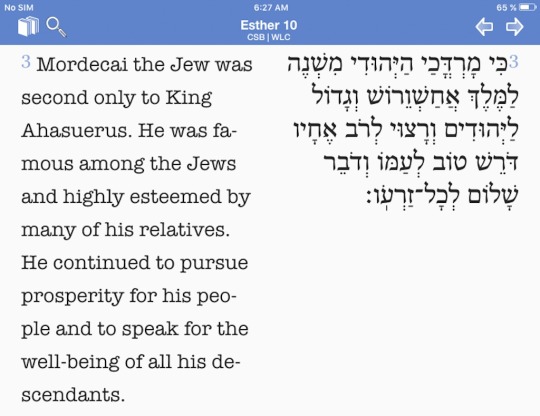
... On the other side, I admit that not everybody can become same. Unfortunately, the genius is positioned under 5 % while other 95% cannot reach to this level. Lord God made us like this. They have the responsibility for it. We cannot say "Oh, 95% of populations are garbage and they cannot become Godly like ours! So let's kill them all!!" I'd say that each of them have any talent and can use it, if they want to get higher for better world. Jews are same.
Priests cannot be construction workers and vice versa. If Jews want to serve their religion for Israel, let them do it. But if they're eager to become the genuine 'Yehudi' as Messianic role, let them walk this way. They're the ones who detect the Fake Yehudites who show the bad example by ungodly attitude and disturb the dignity of the true God's people.
30, July, 2019
2 notes
·
View notes
Text
The Dilemma for Captive Prince
It’s no secret, that there are a lot of people, who stopped the Captive Prince trilogy after the first book and that’s okay. The themes aren’t for everybody, the series in general has very mature themes and content and is not for everybody. The thing I want to touch on in this post is more about the reasoning of dropping the series after the first book.
Just to be clear, if you stopped the book or refuse to read them, because you don’t care about the characters (mostly Damen, because it’s his POV) or find the story boring or the things happening triggering, I have no issue with that. Nobody should be forced to read something that make them uncomfortable, bores them or downright is a threat to their mental health.
Disclaimer: There will be spoilers for the third book, because I feel like I need to put them in here to make the point because who are against the series won’t trust my word on ‘Oh, you will understand, when you get to the twist’ and because those against it might not read it at all anyway.
Again and again it comes up, that people are shocked at how the first book plays out, when they went in expecting a romance story like it’s (unfortunately) often advertised. (It’s not a romance, it has a romantic subplot.) And as I got back into watching booktube videos, I kept hearing things like:
“I don’t see, how Laurent could ever be redeemed.“
“I don’t see how they’re supposed to end up as this epic power couple.“
(I would also argue, that they don’t really end up as the power couple, but you can see at the end of book three, the potential of them becoming one)
Upon hearing these things, my first thought was always ‘Well, then read it and find out?’ because it’s one of the main motivators for me to keep reading certain books. (I mostly finished TMI to see how the relationship of Magnus and Alec would end and to this day I haven’t read the scenes of Clary being kidnapped by Sebastian and Jace because that was a storyline I didn’t care about.)
But I also kept thinking about these comments about Captive Prince and that part of ‘I don’t see how this could be resolved’ as if they thought about every possible way of how this story could go and didn’t see a good conclusion at the end of any of these roads.
The Pattern of Romance
It made me think about how romance is usually written and noticed, that we usually have the pattern of:
1. book: Get together
2. book: Crisis happens
3. book: Making up/final establishment as a couple
In most books where the romance aspect plays a more prominent role the couple gets together at the end of the first book because their romance developing is a specific arc in the book. Not for Captive Prince. There it is more like:
1. book: We can help each other
2. book: Physical Attraction noted and acted on it + mutual respect
3. book: Feelings are happening all over the place
(sort of, it’s been a while since I read the books)
The thing is, in terms of the usual romance plot, you get the first arc of the typical romance over the course of three books (which is why I mentioned, it’s just a subplot). But with most books, we tend to be conditioned, that romance happens either fast or becomes quickly visible, with insta-love being all over the place these days.
So, this is the first one of my theories, with which you can disagree if you want and chalk it up to me not having read that many mainstream books lately.
Laurent’s Redemption?
People, who read the first book despised Laurent and are often up in arms about the abuse that happens between the couple-to-be and yes, I agree, that almost flogging Damen to death is not the best first date idea. (It has the added horror to people, that Damen is a POC and Laurent’s white, but that’s a story for another day, told by somebody else.)
I was skeptical going into the first book. I’ve seen people hating it with a passion and others loving it like their first born child. So, I was curious to see how this would go. It was probably good for me, that I was spoiled for the stuff, that would happen and the flogging specifically, so I knew it was coming, which made me more curious on how this would play out.
Pacat had pretty much written herself into a corner after the flogging scene, I think. How would she get out of that and I do think, it takes more than a full book to get out of that Dead End, when at the beginning of the third book it is revealed, that Laurent knew who Damen was from the start - the person, who killed Laurent’s older brother.
That and the point, where we find out, that his uncle, the Regent, also sexually abused Laurent after Auguste’s death and took advantage of him being emotionally vulnerable, that puts the whole first book into a new perspective.
Yes, Laurent is cruel in the beginning, but he is also in a situation where he is confronted daily with his abuser who holds the throne, and there’s nobody to talk to.
And in this situation he is gifted a slave, who he knows is the killer of his brother, who he is stopped from actually killing in revenge by the guy who sexually abused him. I would say, looking back it’s fucked up situation to be in and to survive.
Therefore I would also say, Laurent doesn’t get redeemed, he was cruel af and until the end, he doesn’t exactly become the king of Fluff, but that would have been a realistic character development. The flogging especially is something, that is very present between them and nothing that is imo treated as ‘ancient history, we all make mistakes’, Just like Damen carries the guilt of killing Auguste, despite it having happened during a war, with them on opposing sides.
Laurent doesn’t get redeemed, he gets explained. His actions aren’t excused, but made understandable.
Why the difficulty with understanding him?
Looking at the character in broad strokes, Laurent is the stereotype of the cruel prince: royal by birth, scheming, living in luxury, cruel for fun with a sort of lethal beauty
Though there are details added in the books, that shape Laurent’s character beyond the aforementioned stereotype are:
- He’s not cruel for fun in general, he is cruel towards Damen because he knows who he is (Damen remarks later, that Laurent would have let him go had he been any other slave)
- He lives in luxury, but doesn’t cover himself in jewelry, he covers himself in fabric as a defense against what has been done to him by the Regent
- He’s royal by birth, but his throne is held hostage by his uncle, who first sexually abused him and now wants him dead
- he is scheming and good at it (something, that I found instantly fascinating), but this as well is a defense developed as a measure of survival against the threat of his uncle
- he’s really pretty ... no twist there.
(Only, that he knows to use his looks if has to.)
Most of these details are not that prominent in the public display of the character because they are connected to spoilers of the plot.
Now, we have the more prominent stereotype of the ‘Bad Boy with the terrible childhood/past’ who just gets away with awful stuff because of his past. Readers are used to a character being awful at first taking that road of having some kind of tragic backstory thrown at the reader and that excuses their actions. So, I think, people often think, that is the only way it could go and are put off by that. But that’s not the case. Laurent’s childhood/past is pretty much hell, but it’s not used as excuse. (He himself doesn’t even bring up the sexual abuse, it’s his uncle basking in torturing Damen with that reveal.) It’s used to put his actions into perspective and as a reason for Laurent’s deep hatred for the Regent.
So, yeah, Laurent is an onion, that was peeled against his will once and now bites when people try to do it again.
And the additional reveal of him knowing who Damen really is almost gives you whiplash after reading the first two books (especially the second one) of “Wait, WHAT?” because you realize Laurent grew to trust and respect Damen for his skills and personality despite knowing he killed his brother, he acknowledges that skill, too. (Honestly i found that refreshing after all those blind revenge plots of ‘I will avenge my [add family member here] and if it’s the last thing I do’.)
The Dilemma of POV
Damen is the only POV telling the story, therefore the abuse he suffers is more visible and the reader actively suffers with him. It’s also shown, while Laurent’s abuse is told (in a much shorter way, too). That way, the abuse Damen suffers is more prominent, easily explained by the basics of writing.
Not to mention, that people, who stopped after the first book don’t even know about Laurent’s story.
It’s a case of ‘visible abuse vs. invisible abuse’, which is reflected in the writing. And if you want to be really provokative, you could say, the people’s reaction to Laurent and Damen is a mirror of society’s reaction to visible and invisible abuse and to the case of ‘not looking like a victim’ ...
There’s also the possible case to see Laurent as ‘the risk of an abuse victim turning into an abuser’ ... (there are some topics, that could be turned into a paper)
Conclusion?
Pacat took a great risk with Laurent in the first book and to advertise it as love story didn’t do it any favors, but what she ended up achieving was quite impressive.
So, going back to the beginning of “I don’t see how this supposed to work itself out positively.” ... you’re not supposed to see that after the first book, it’s the point of the series to create a tense starting point and make you wonder how it’s supposed to be concluded.
The problem stands with people, who have read the first book, judging the whole series as bad and terrible and judging the people who like the whole series and going ‘I don’t get how people can like this series’.
When going into books, it can be important to realize, that our judgement of that book is influenced by expectations created by other books, the summary on the back and character types we met before or patterns we’ve seen before and when we get tidpits of these patterns in new books, we tend to put the rest of the pattern in by ourselves and see it as fullfilling the pattern despite it not being the case.
This why I tend to go for spoilers to either save myself the trouble of going down a path I don’t want to go or with at least wait a bit to see if the storyline I’m following is really as predictable as I think it will be (just skimming the text).
If it ends up being predictable, I kick it, if not, I’m surprised positively and eventually go back to reread the part I skimmed.
It’s more helpful to go “Will it go down this road?” instead of “It’s going down that road!”.
So, when CP doesn’t make it apparent how Damen and Laurent end up together after the first book, and you don’t like it, it’s not the fault of the book, it’s more your problem of expecting it to do so - is what I’m trying to say here.
The trilogy is actually also not a trilogy like we are most used to seeing them, with each of the books having a concluded story arc, it’s more a case of one story being broken into three acts/books. And again, the expectation to get a trilogy like people expect based on how most are structured is not the fault of the books.
Are they flawless? No.
But seeing people shit on CP as ‘trash’ and ‘problematic’ and then go and praise Cassandra Clare for her books, just annoys me and makes me think, that there are way more urgent issues of more subtle problematic writing, that we should worry about. Not to mention, that CC’s stuff is YA - aimed at teenagers - and CP is adult fiction.
And with this I conclude my two cents concerning people’s problems with CP.
#captive prince#laurent of vere#I could write books about Laurent's character#personal opinion stuff#this is an outsider's opinion as I'm not involved in the fandom that much
135 notes
·
View notes
Text
The Villain Problem (which is easily solved)
I’ve seen frequently a lot of posts and threads (making emphasis on “frequently” and “a lot”) here on tumblr and on twitter making a claim that people just don’t want their villains to be redeemed because they refuse to give them character development. This is my take on it and how I solve it.
Well, for starters, character development goes both ways so a villain that starts as someone who wants to do mildly bad things but ends up mass-murdering, raping back and forth, torturing other characters and so on, already got character development. They went from bad to the absolute worst. Of course, a writer’s storytelling skills have the power to make or break a story, so even this can be poorly executed.
To continue, at least in my case, I’m only not into the “redemption” thing when the villain has reached a point of no return, because their actions are bigger than anything else. Something like the example I provided above. And no amount of sad backstory caked with child abuse will change my mind.
Actually, when a story (and by “a story” I mean all of them) gives me the sad backstory and the child abuse excuse--which is an insult to every real child abuse victim ever who chose not to harm anyone, and to those who were victims of people who used this excuse, it completely loses me. Not every bad person had a bad childhood. Having a bad childhood doesn’t excuse them from owning their bad actions. And in the case of the villain, last time I checked, having their mother killed in front of their eyes when they were a little kid didn’t prevent them from creepily smiling when brutally killing a woman in front of her innocent child’s eyes. At this point, having a story give me a sad backstory for Evil Guy not only makes me roll my eyes so far back I can see my brain cells dying, not only increases my anger towards Evil Guy, not only diminishes what respect I might have for the author and their ability to tell a good story, it also actually makes me lose any interest I could’ve had about the villain. And villains are supposed to be interesting. They’re supposed to be the spice of your story.
Other instance in which I might be against the villain’s redemption is when the redemption actually takes away from the story. Some villains were born in the whimsical space of our minds to be evil and go grand about it and tell a message about it. Suddenly redeeming them erases anything that the writer was trying to say.
So how to tell when a villain can be redeemed? Everything depends on writing skills, really. You’re the one writing your story, right? Then you’re the one who will know if this villain can or deserves or wants or needs to be redeemed. You’re the one to know if your story will suffer from it or gain from it. It’s not the readers who decide this; what they feel about the villain, positive or negative, is completely up to them and their fanfics. It’s only you and your intention to tell a good story what matters here.
My list of personal tips, tho, are:
a. Treat your villain as another Main Character, which in a way they are. Villains that are faceless shadows lurking in the awfully decorated halls of what looks like a BDSM dungeon and the result of a quarrell in IKEA, are boring. And I’ll bet not even you fear/care for them.
b. Give Evil Guy a goal that matters to them as a person. Goals are better and more believable than stupid tragic backstories. Also a must if you want a 3D character. They don’t need to be huge goals. I mean, some people would harass and send death threats to someone else over ships, right? Think about that.
c. Add the sad backstory if you want to. Just know that its actual purpose is to give the villain an origin story, not excusing them. Heros also have sad backstories usually and you can still see them being normal people, working on retail at the start of their hero journey. Actually scrap the sad backstory if you have your hero or villain working on retail, that’s enough torture already.
d. If you don’t like or have any interest in your villain, why are you expecting others to? When you don’t like or have any interest in your villain it is because of different reasons: They’re not believable, their goal isn’t believable, you just don’t know what kind of person they are. Do what I do. Talk to them. Sit alone, organize an interview or a really messed up date and get to know the guy. (I do this with every character, really, but villains make for really big experiences).
e. Be prepared to love-hate them. You’re creating a monster. You have to be happy with the kind of monster you came up with. “You’re the worst and don’t have a place outside of the deepest pits of hell. You’re perfect!”
f. Only after you know your villain and how far they’re willing to go to accomplish their goal, you can consider whether or not to redeem them.
g. Realize what role this villain plays in the lives of the rest of your characters. And they must play a role since Evil Guy has been antagonizing them since the beginning of the story. Sometimes, there are other kind of relationships or ties involved that might be the ultimate decisive factor. Let’s use Kubo and the Two Strings as an example. (SPOILERS) Evil Guy was Kubo’s grandfather, but the story chose to give him a new chance to be good and care for his grandson because Kubo had literally no one else. It was such a powerful resolution, because Moon King also despised humankind and their warmth and having to look at them, and thought of himself as superior for being immortal, but then he was turned into a human, was convinced that he was the most compassionate man, and was made to look at humans in the eyes every day until he died someday. But MOST IMPORTANT, it was Kubo’s decision.
(Don’t force a character to end up with or forgive their abuser. Kubo did it amazingly but it’s not something everyone or every story can do. Forgiving is a very personal and intimate thing that isn’t about the abuser but the victim. Forgiving doesn’t mean allowing the abuser back into your life and it definitely isn’t about falling in love with them. It shouldn’t be played as the exoneration of the abuser).
In mp100 (SPOILERS AGAIN) Shou forgives his father. Shou took the decision to give his father another chance. A chance to finally be the father Shou deserved to have. A chance for Touichirou not to disappoint his son again. It was all about Shou, and mp100 is a story about growth and decisions and choosing to be better, so Touichirou also chose to take the chance Shou was giving him. This completes the themes of the narrative and is not forcing us, the readers, to sympathize with Touichirou, it’s only showing us what kind of person Shou is, what his needs are and why we have to respect them, and what he and his father decided to do about their conflict.
h. Realize what sort of story you’re telling or trying to tell. You know, sometimes the message can be pessimistic. Sometimes you want to talk about morality, sometimes about amorality. Sometimes you simply really want your villain to mean something. Once you define this you can choose HOW you want to redeem them (if you had chosen to redeem them that is).
i. In general, antagonists that take bad decisions but deal with an internal conflict of good and evil are the ones we all want to see redeemed. Think Zuko, Loki and (tho it never happened) Draco Malfoy.
j. No matter what sort of redemption you gave your villain or why, make sure they still get to face the consequences of their actions. It doesn’t matter if you love them so much that you are willing to overlook murder cuz “Aw, c’mon, I don’t go to jail for killing all my chances for a decent future, do I?” or “It’s medieval times! Everyone had at least killed five people by the age of 18 back then”. Their actions must come back to them, somehow. It doesn’t have to be jail time, or death or stuff like that, but they must feel real regret. If they don’t, you’re not really redeeming them, you’re just letting your Evil Guy win by gaining MC’s trust and getting to live a full live without any inconveniences. I mean, I guess that’s what uncaught serial killers, corrupt politicians and some Nazis got to do so it’s not that unthinkable.
I, myself, have a thing for villains, which is a reason why I don’t understand the oversimplified posts that go: “People who don’t want villains to be redeemed think you’re evil if you like villains. People just don’t want character development for villains.” I may think that any specific villain doesn’t need a redemption, that doesn’t mean I think no villain can have a redemption. I may think that the villain that doesn’t deserve the redemption is a literal disgusting creature, that doesn’t mean I can’t be impressed by how amazingly and cleverly constructed the villain is. My biggest example: The Joker. And every character needs character development, else they’re not really characters but plot devices.
As for the other side of the argument: “They think you’re evil if you like villains”. I might be missing something here, but the one complaint I’ve heard barely reminiscent of this claim is the one that surfaces when a fandom collectively justifies or ignores the villain’s actions (as if that’s necessary to be allowed to like the villain) and that’s a complaint as valid as any other; or when the story itself justifies the villain’s actions then chooses to never mention them again, which, yeah, is bad writing (see Snape).
If you choose to ignore a villain’s actions, doesn’t that just mean that you like the character but not exactly what they did? Tho, the route you’re taking isn’t the best but still. If you justify a villain’s actions (murder is common, rape is worse, they were having a rough day, they were depressed--bitch, I’m depressed!, she asked for it, it’s okay because they fall in love later, they just don’t know how to express love in a healthy way that doesn’t involve emotional and physical and sometimes even sexual abuse, they grew up in a violent and/or manipulative environment, they have an awful father…), and then make a big deal out of that and talk about it online, don’t be surprised if someone disagrees with you, or you touch a nerve with an actual real life person and get called out. Because, it was you who made it internet-relevant.
It’s your right to like a villain for whatever reasons you want and you don’t owe an explanation to anyone, but thinking critically about your fave, recognizing their flaws, or the themes they embody are also important things. And even if you just don’t feel like doing that, which is fair, that doesn’t change the fact that the villain is a piece of shit and other people will notice it. Not everyone will love your sinnamon roll. You’ll have to deal with the two sides: Enjoying your small villain fandom with your nice group of peers, and seeing posts where other people trash your fave. That if the story itself doesn’t do it.
#rape mention#murder mention#writing tips#text#long post#i give mentions to Kubo and The Two Strings and mp100 with some major spoilers#mine
28 notes
·
View notes
Note
Reading the JB + stump meta, I felt there could be so much to unpack also about gender/roles in Westeros, there. J not being (a) "whole" (man) bc he thinks he can't *fight* or *have sex with a woman* without his right hand, C thinking he could only "fumble at" her and downgrading him from ideal lover/"me as man" to "undesirable servant I'll let fill my cup", B still seeing him as fighter *and* attractive + wondering if he'd like her to be soft and helpless even while playing knight to his DID..
man you’re opening the hoover damn here if you want to talk to me about jaime and brienne’s gender roles reversal X°DDDDDDD ANYWAY SINCE YOU SO NICELY ASKED
first, as my bro @ofwickedlight has pointed out here and here jaime is actually pretty.... not toxic-masculine for westeros standards actually all the contrary, and he already doesn’t have the notions about women being supposedly inferior that most other people have (I’m referring you to those metas because they explain it better than I could here), so we’re already discussing someone who technically is starting from a better vantage point when it comes to deal with that notion
now, going on each specific point you said...
jaime:
as far as jaime is concerned his problem isn’t specifically tied to his lack of masculinity attached to the hand but the hand itself in the sense that if he was born to be a warrior taking it from him is basically taking his main source of pride/joy from him and it makes him useless on his job since it’s being in the *kingsguard*, and given that he can’t be with cersei in public of course he makes up for it with his chivalric prowess... which he doesn’t have anymore. like, that is a self-esteem blow of epic proportions because if he doesn’t have that then he has nothing else going for his supposed usefulness (and mind how he keeps himself alive also thinking he’ll see cersei again because that makes him feel like he can survive another day - if he doesn’t have his skills he’ll have the woman he loves/who loves him, right?) and he has to command the kingsguard without what makes him a knight and so on. now, the thing is that he has to eventually find out that he can fight and have sex and so on also without the right hand and that doesn’t define him whatsoever, but that doesn’t matter because the way he processes things as I said in that other post, he equates feeling good with both sex and sword fights, so taking his ability from one also might mean taking away the other and guess what, if you don’t count the sept sex, he and cersei haven’t really... DONE ANYTHING that’s not her trying to have sex with him and him refusing her when he realizes she’s disgusted since then, which could cement it. but it’s not that it makes him feel like a woman in a derogatory sense, it’s mostly about him feeling like he doesn’t have anymore what makes him good at his job or makes him cersei’s mirror, and mind that until he meets her again and it goes like shit he’s subconsciously aware that she wouldn’t like it if he looked different from her:
The reflection in the water was a man he did not know. Not only was he bald, but he looked as though he had aged five years in that dungeon; his face was thinner, with hollows under his eyes and lines he did not remember. I don't look as much like Cersei this way. She'll hate that.
now, if she loves him that much, should she give a damn? yeah, my point exactly. and while he tells himself that he has to go back to her, he knows subconsciously that she would hate for him to be back changed enough that she can’t recognize herself in him, which should already suggest a lot. but we also have another thing on the other side of the barricade, ie when he asks after brienne when qyburn’s treating him:
"I will ask after her. What is this woman to you?""My protector." Jaime had to laugh, no matter how it hurt.
and okay, he finds it hilarious for obvious reasons, but he doesn’t go and think it’s ridiculous. actually, he is the first one who says she’s his protector. AND, in the tub:
"Does the sight of my stump distress you so?" Jaime asked. "You ought to be pleased. I've lost the hand I killed the king with. The hand that flung the Stark boy from that tower. The hand I'd slide between my sister's thighs to make her wet." He thrust his stump at her face. "No wonder Renly died, with you guarding him.”She jerked to her feet as if he'd struck her, sending a wash of hot water across the tub. Jaime caught a glimpse of the thick blonde bush at the juncture of her thighs as she climbed out. She was much hairier than his sister. Absurdly, he felt his cock stir beneath the bathwater. Now I know I have been too long away from Cersei. He averted his eyes, troubled by his body's response."That was unworthy," he mumbled. "I'm a maimed man, and bitter. Forgive me, wench. You protected me as well as any man could have, and better than most."
now, I think people wrote novels of meta on here but for my purposes, note that first he thinks the sight of the stump distresses her when instead she’s most likely skittish because she’s bathing naked with another naked guy and from someone who thinks she’s ugly/undesirable, bathing naked with someone else is exactly the kind of thing that’d make you skittish, so it wasn’t the stump, then he tells her everything he did with it and she doesn’t care, and she only jerks up when he mentions renly and her failure to protect him, not before. THEN he gets hard looking at her and he’s... I mean, you can see that he has a pretty fucked up conception of sexuality if he thinks ‘okay I’ve been too long away from c.’ then ‘oh fuck she’s making me hot’ when she gets him hard, but never mind that. also, he’s troubled by his own body’s response which is what a fifteen year-old guy would even think and he feels halfway guilty for having felt attracted to someone else which again, he has a fucked up conception of sexuality, but never mind that, what does he say to apologize? ‘I’m bitter and you did a better job than most would have,’ ie: men, and he’s aware that she basically kept him alive throughout that entire thing and doesn’t think she’s lesser for it, all the contrary.
tldr: jaime himself doesn’t see his own condition as ending up in the damsel’s position as demeaning nor has any problem seeing brienne as someone who can and will do what most men would, and has no issue whatsoever with the idea of her protecting him, which is why I keep on saying that we’re in full on reverse gender-coded territory here and that jaime can’t give two fucks about it - he doesn’t, but because he’s gone outside gender norms when he was young and has no technical issue with the idea of women not being inferior and so on (and he also gives zero fucks about how you look, see tyrion), but at this point he doesn’t have the scope to see the entire situation and he has no idea of that nor that he might actually be having feelings when it comes to brienne because again, he’s spent all his life 100% convinced that he and c. are a package deal;
and count that we’re talking about a guy who romanticizes everything he touches to insane degrees - knighthood, his sister, his family and so on - and that when seeing that it’s not the case reacts seriously badly, *but* his relationship with brienne is pretty much devoid of it because when they met they didn’t like each other and he didn’t exactly put her on a pedestal, she earned it in his eyes same as he earned his place in her chart of people she actually admires/loves.
the rest is under the cut because this got long bye.
cersei:
I’ll try to keep this short and objective lest people decide I need to chill (*rolleyes*) but as you said, the thing is that again: cersei wants herself in a male body because she wishes she was born a guy so she could be in the position she yearns for ie tywin’s heir. period. jaime’s needs or personality or whatever matter zero to her but until he thinks they want the same thing then it’s all I’M NOT WHOLE WITHOUT HIM. except that (affc quotes):
"Fool. No one who wears a crown is ever safe." She looked about the hall. Mace Tyrell laughed amongst his knights. Lords Redwyne and Rowan were talking furtively. Ser Kevan sat brooding over his wine at the back of the hall, whilst Lancel whispered something to a septon. Senelle was moving down the table, filling the cups of the bride's cousins with wine as red as blood. Grand Maester Pycelle had fallen asleep. There is no one I can rely upon, not even Jaime, she realized grimly. I will need to sweep them all away and surround the king with mine own people.
"You were better, before you lost your hand. Ser Barristan, when he was young. Arthur Dayne was better, and Prince Rhaegar was a match for even him. Do not prate at me about how fierce the Flower is. He's just a boy." She was tired of Jaime balking her. No one had ever balked her lord father. When Tywin Lannister spoke, men obeyed. When Cersei spoke, they felt free to counsel her, to contradict her, even refuse her. It is all because I am a woman. Because I cannot fight them with a sword. They gave Robert more respect than they give me, and Robert was a witless sot. She would not suffer it, especially not from Jaime. I need to rid myself of him, and soon. Once upon a time she had dreamt that the two of them might rule the Seven Kingdoms side by side, but Jaime had become more of a hindrance than a help.
like: the moment he tells her ‘cersei you’re fucking up’ and actually tries to counsel her, after he loses the hand, he becomes.... MORE OF A HINDRANCE THAN A HELP. like. I need to rid myself of him. that’s.... not exactly what you think of someone who’s your other half or should love no matter what. and as you pointed out, the moment he loses the hand she basically downgrades him because he can’t be the man she wants to be and who cares about what he needs or wants, that’s not even taken into consideration. and tbh in that moment cersei is being more pro-reinforcing gender roles than she’d like to think because the moment he loses the hand (which makes him her male counterpart too, and one who can defend her in time of need like no one else could) and shows that he has a personality that’s, surprise!, not hers, she has no use for him anymore. also counting that cersei is the incarnation of internalized misogyny the whole thing certainly doesn’t go in her favor. and she’s actually pissed off he doesn’t fill her cup and throws it at him while full of wine later but never mind that, the thing is that for how much she hates men for holding her down as a woman she does the exact same thing to anyone else she can get away with including jaime, and that’s not loving someone back regardless because they’re your other half which is what jaime desperately wants instead. like jaime’s entire system is built on the idea that he loves her but she loves him back, and when he finds out it’s not the case, well, friendly reminder he did burn that letter and is trying to put himself back on track;
also: count that she dreamed THEY’D RULE THE SEVEN KINGDOMS, but jaime could have ruled the seven kingdoms when he killed aerys and when ned went inside the room he basically went and said OH HEY HELLO YOU’RE JUDGING ME TOO BAD BUT YOU WANT THAT THRONE? YOU CAN 100% HAVE IT BYE. like. it’s her dream. it was never his and she doesn’t even realize that, which says all about how much she’s aware of his emotional needs but nvm that.
brienne:
this one is the most complicated to unpack imo but that’s because brienne is in the sort-of-unique position of being the only one in between the two of them who manages to go past gender roles completely but actually doesn’t necessarily relish it;
as in: a lot of people assume that brienne wants to be a knight because SHE WANTS TO DO MEN THINGS but no, brienne wants to be a knight because a) it’s the job that better suits her built, b) it allows her to not being stuck at home in a role she hates surrounded by people who make her feel inadequate, c) it fits with her ideas about honor and allows her to have a chance at good things. as in, her key quote in acok was:
"Because it will not last," Catelyn answered, sadly. "Because they are the knights of summer, and winter is coming.""Lady Catelyn, you are wrong." Brienne regarded her with eyes as blue as her armor. "Winter will never come for the likes of us. Should we die in battle, they will surely sing of us, and it's always summer in the songs. In the songs all knights are gallant, all maids are beautiful, and the sun is always shining."Winter comes for all of us, Catelyn thought. For me, it came when Ned died. It will come for you too, child, and sooner than you like. She did not have the heart to say it.
now, this is basically telling you black on white that brienne would rather live in a song where the sun is always shining, if you die it’s okay because people will remember you, the knights are never not gallant (like the ones that she had to fight off all her life), the maids are beautiful (like she’s not) and everything is always better than in real life, and in this sense meeting jaime basically strips that from her but not enough. in the sense that he makes her realize that reality and songs don’t go well together, but it doesn’t mean she won’t keep trying to behave the way a proper knight should, which is what she does through all of affc;
but brienne also fell for renly when they danced together (DANCING ie what ladies do) and she was wearing a dress and he was basically nice to her while letting her be feminine for once, brienne admires cat for having a woman’s strength and brienne is entirely down with protecting also women along the road and so on, so like... brienne doesn’t hate feminine things, she just doesn’t partake in them because a) she’s better at being a knight which is sadly a man’s job in westeros, b) everyone made fun of her whenever she tried which then added to her overall self-esteem issues;
now, brienne’s basically going around westeros risking her neck to do knightly things even when as a woman it’s 100% more difficult than it’d be if she were a man and taking on that role, but when she wants to weep on jaime’s shoulder she’s basically saying she wants to be vulnerable with him like the soft helpless maidens she’s not like, and guess what, he did that with her when he told her about aerys pretty much, but again, brienne has no preconceived notion of gender roles blocking her because she doesn’t hate the female-coded ones but has taken on the male-coded ones her entire life because she either had to or felt called to or felt more at ease with them;
so like, jaime gives zero shits that she’s defying them and that makes him look even better/more appealing to her because he’s the only man who took her seriously *for real*/for herself and not for how useful she could be. also, as much as some people would like to say she’s not brienne, being a woman into guys, definitely noticed that he’s attractive (the white cloak becomes you + half a corpse and half a god, HMMM) and like, of course she’s into him, but the thing is that on one side she’s bent on being his knight because he trusted her with it and she swore to protect him (before he sent her off), on the other she sees him as the only male candidate who - having come back for her in the bear pit - she could allow herself to be feminine/vulnerable with because that was the only time in her life she actually was the damsel and not the knight.........and he did it without the hand, so the thing is that to brienne he was the knight in not so shining armor (or armor, period), when he jumped into the bear pit without a weapon or anything else to save her life after coming back for her which no one has ever done before, actually until then she has fought off everyone for herself (ronnet connington/hyle and the other guys). so like.. to brienne, his most heroic moment is when he tries to save her without the hand, so she couldn’t link that loss to his supposed lack of masculinity or skills or heroism because he didn’t need that hand to save her;
also I would like to point out that it’s fairly telling that in affc on one side he punches in the teeth the guy that ruined her self-esteem for good and disrespected her so much that when she has the fever nightmare she sees him and wishes jaime was there and would come back for her, while on the other she kills (and fairly bloodily/not gallantly) both timeon and shagwell (who btw had been especially creepy to jaime in his asos povs) thinking that she’s doing it *for* jaime as well and of course none of them knows what the other is doing in this sense. but like, brienne’s literally going knight in shining armor on him to the point where she’s willing to die for him (and that’s why I’m 100% convinced she kills LS to save him doing also the aerys parallel) and she has no issues with that because that’s what she’s good at.... same as he has no issues with it because he 100% accepted that she can do that job and has done it for him better than most people would have. and at the same time she also sees him as someone who would or might let her be also soft and helpless while he sees her as *gentler* than his sister and trusted her with his most well-guarded secret after she literally kept him alive when he was sure he wouldn’t make it. and the hand, to her, matters absolutely nothing.
like, that is why I think that jb is a case of continuous gender role reversal in which he’s coded as the DID 90% of the time and she’s coded as his knight 90% of the time but switch places for that other 10% of the time to a point where they’re basically well outside gender roles both in westeros terms and modern terms (tbqh that too) but it works perfectly for them. like, the point with cersei is that, for as much as she thinks she’s not, she’s *completely* stuck into the westeros gender roles structure and can’t get out or maneuver around it the way cat did or genna did or other women try to because she wants to have the same power men have without beating around the bush and will stick to it and cares for having power more than anything else and works for that. on the other side brienne has been outside gender roles all her life and can’t give two fucks about it even if she suffers for being denied her feminine side, and jaime has seen enough to know that gender roles are bullshit and women aren’t lesser than he is and also mostly wants to have his emotional needs met which he hasn’t had since forever. which is why jb matches perfectly in that sense, because he wouldn’t mind being with someone outside gender roles who gets him and she needs someone who’ll have her exactly the way she is and be into her regardless of her look or her working outside the norms and who would let her also be soft and helpless if she needed it. and that works for them because they could and would and have been that person already, except that they haven’t quite realized it because they’re two assholes who are shit at understanding their own feelings. and that is also why cersei and jaime post hand-loss can’t work, because she needs someone who’s her and looks like her and wants what she wants and jaime does not and never has.
/peace
#jaime x brienne#jaime lannister#brienne of tarth#janie writes meta#otp: i dreamed of you#anti-cersei lannister#anti-lannincest#is2g if someone tells me to chill about my opinion re jc LOOK AT THE TWO TAGS BEFORE THIS BEFORE YOU PRESS SEND#thank you#PEACE#Anonymous#ask post
30 notes
·
View notes
Text
Fanfic trope meme
Apologies to those of you who see this for a third time, as I’ve crossposted it to both LJ and Pillowfort. Feel free to comment over on there (or my other posts) if you like. And of course, feel free to grab this one and do it yourself, if you like.
***
Grabbed this meme from a couple of people on LJ. It's... well, apparently about fanfic tropes. Some of them more terrifying than others.
I have written:
-Hurt/comfort (Yeah, baby! Most of my fic is this.)
-Body swapping (Sort of? Souls slipping into each other's bodies for a bit? Jaffar feeling what Yassamin feels? Sex swap, I've definitely done.)
-Soulmate identifying marks (tattoo, red thread of fate, etc) (I have! The Throne of Solomon. And maybe The Past Forgotten counts, in its way. I may have written more, but I forget.)
-Snowed-in cabin/isolated together for extended period of time (The Jaffar/Pwinzezz Cavefic!)
-Found families (I guess the Samarkand gang counts for poor old Fadl? Even if Jaffar *is* his brother, so technically it is his family. But he does have his religious congregation and Zainab, and is... well, he always does seem to be seeking something, so he's the kind of guy to go for this trope.)
-Fairy tale/mythology AU (And not just when I am writing in *actual* fairytale/mythology fandoms. Which I am doing most of the time, what with Thief of Bagdad being a 1001 Nights fanfic anyway. So I'm writing fanfic about a fanfic of some age-old RPF (fantasy AU!) about historical figures from the late 700s/early 800s...)
-Enemies to friends to lovers (Yes, please! Aplenty. I'm surprised that enemyslash/FoeYay/Hero(ine)/Villain(ess), whatever you want to call it, isn't mentioned on this list.)
-Characters swap roles AU (Uh... I've written sexual switching in some isolated chapters? Like when Laura briefly doms Torsten in The Fall of Angels, to help him get over some traumas?)
-Friends to lovers (With RPS, Veidtbone in particular, and Theta/Koschei. This also seems to happen whenever I write femslash.)
-Magical connection (telepathy, etc) (Doctor/Master basically ruined me for all my other ships what with their telepathic ability. So that now, it feels less interesting for me to write love/sex that *doesn't* have telepathy.)
-Fake dating/fake marriage accidentally turns into feelings (see next trope)
-Royals/political marriage turns into feelings (These last two are pretty much the same thing in ToB, as I've had Yassamin marry Jaffar a couple of times--like The Past Forgotten and The King's White Falcon, but without him laying a hand on her for up to a year, until she finally grows a brain and realises how loveworthy he is after all.)
-Seemingly unrequited pining (Emphasis on the "seemingly." Jaffar's unrequited pining is painful enough in the movie, so there's no point in making him suffer any more.)
-Accidentally fell in love with the mission target (Well, *kind of,* what with Torsten. Lars-Erik was definitely his mission target in the original film, and at the start of Because The World Belongs to the Devil, he made no bones about having wanted to kill Laura Erika [the teenage girl version of Lars-Erik in this AU, to those of you just joining in] when she was born.)
-They break up (but then they get back together) (With Jaffar/Fadl. Fadl's stormed off in a huff at least twice in the past. And Doctor/Master is always the same old on-off car crash, isn't it? Although this is not a favourite trope of mine, as the setup would usually necessitate them being an existing couple in the first place, and I tend to not write canon or "plausibly lovers" ships because they're already happily together. What do Two and Jamie, Holmes and Watson etc. need me for? They're already as good as married. Let them have their happiness.)
-Supernatural creature/human romance (Sort of. I've written Time Lords/humans, humans/djinn at least. And surely wizards count as supernatural romance, anyway?)
-Reincarnation/'25 Lives' AU (What's with the 25 lives? Is this some big fandom thing again? One of the darkest, most fucked-up fics I ever wrote was the Master killing the Doctor during sex and fucking him as he regenerated around him. As you do. And there's reincarnation in one of my Jaffar/Pwinzezz fics, but I won't spoil it for the new readers by telling you which one it is.)
-Selfcest (possibly due to time travel) (I am scratching my head trying to remember when I wrote this and in which fandom, but I have the distinct feeling I've written it. I've certainly whacked off to that World Of Simm!Masters clusterfuck what with the pink dress so many times I... I think I broke two clit buzzers during that time. I've certainly drawn it. And drawn some Connies on Connies. And then there's, of course, Sarosh the Sexbot who's a clone of Jaffar, looks-wise, but he is very distinctly just a robot, not a living character as such--not the sort with which you could have a real, interpersonal dynamic. My problem with selfcest, in general, is that I like having that character dynamic--and that requires the characters to be different from one another. If it's two characters that are too similar--if they fulfill a similar role in the canons--it's hard to create a dynamic between them and to make it interesting.)
-Polyamory (Swinging away ALL the bloody time with the Roses!Jaffar and Yassamin, and Torsten/Laura. Sometimes I miss the monogamous 'verses.)
-Amnesia (I've got a post-movie "Jaffar comes back from the dead" WIP I'll probs never finish, because it doesn't seem to get off the ground. If I wrote this trope, I would have the characters gradually regain memory, though; complete mind-wipes are horrid. I did have Handy lose the majority of his cognitive/motor/Timey skills in No More and that was the main reason I had to... well, I'm not going to spoil it if someone hasn't read it yet, but it wasn't the cheeriest of fics. The Past Forgotten *sort of* has this, but I don't want to spoil as to how that happens.)
***
I could write:
-Daemons (Why the archaic spelling? I have written djinn, so I almost put this in the 'have written' section. I can't remember if I actually *have* written real demons, because I might have. Surely, Torsten counts...)
-'Everyone is evil'/mirrorverse AU (Well, mostly, if I want to explore "evil" characters, I write about those types of characters in the first place, without having to turn anyone evil. Devilry is the 'verse for that. Hell, usually it's the other way around; I try to look for the human elements of the baddies, or at least explore their logic--what makes them tick, what makes them the way they are. So, IDK, I could've also put this in the "unlikely to ever write" section.)
-And they were roommates! (This would be terrible and also hilarious, whatever characters ended up becoming my victims. Even if I'm more interested in those hurt/comfort plots, overall. And I have always found it *impossible* to live under the same roof with other people because I need peace and quiet and solitude too much. So this is almost a bit too much like the sorts of negative RL experiences I don't really want to get more of in fic. But I *could* write it as a comedy for cheap lols, especially if the stress were resolved by hot bonking, ASAP.)
-'They all work in an office' AU (Otherwise, I would've put this in the "just no" category, but... the Barmakids were civil servants. So I *could* write Jaffar and Fadl drowning in paperwork--"WHY DID WE EVER introduce paper into THIS EMPIRE?!?" and cursing their fates and Jaffar restraining Fadl from braining Harun al-Rashid with a paperweight. Same with Lina doing Zainab's books and trying to hold back The Fist of Death when Fadl carelessly drops a piece of his lunch over her perfectly calligraphied accounting.)
-'Falling for a coworker/teammate is a bad idea' except this is fiction so it works out (Maybe. Just maybe. But it'd also be in a medieval ToB context.)
***
I will probably never write:
-'Groundhog Day'/karmic time loop (I just never got the appeal of this. Sounds like the sort of thing experimental writers would like? The sorts who really like filling in bingo cards and challenge lists?)
-Vampires/werewolves AU (I'm not that big on either. Super-unpopular opinion coming up: I prefer sex to the sublimation of it that vampires are often all about; bloodsucking in lieu of sex, and/or being seen as way better than sex just always feel to me like a cheap cop-out from writers who are disappointed in sex, or afraid of it. I've never grokked it any more than that stupid, stupid "chocolate is better than sex" quip from women who don't know what masturbation is--yes, it fucking well is sex, TYVM! I much prefer to make partnered sex better than it is IRL by adding supernatural stuff like telepathy to *that*. Immortality alone is interesting to explore, as are Gothic themes, but all the usual themes that vampires *specifically* usually represent just... either hold little interest for me, or then, I can explore them in other ways.)
-'Pride and Prejudice' AU (I don't hate Jane Austen, but it's not my fandom. That kind of society stuff and being witty over teacups in bonnets has never really been my thing--if anything, I usually have my characters exist in their own bubble, isolated from society and its restrictive mores and social stresses.)
***
JUST NO!
-Coffee house AU/food service AU (AUGH! Please, no coffeeshop AUs for me; the world is full of them already. Maybe I could write it as some terrible, short parody? Or doodle it? But no more than that.)
-Hogwarts AU (Haven't read HP. Young Adult isn't really my genre. I know, I know; I've just lost all my WLW cred.)
-High school/university AU (I've done Time Lord Academy-era stuff with Doctor/Master, but I expect this means a sort of American high school/university AU with jocks and cheerleaders and shit. Hell, no. Again, the exact sort of horrid society stuff I would rather have my characters escape from.)
-Adopting/raising a baby (Erm, not unless you count Jaffar/Yassamin adopting a cheetah? They do have kids in some 'verses but there's none of that everyday baby stuff that this question/trope probably implies. I'm squicked by babies, sorry.)
-Unusually specific occupation AU, like, the Author clearly has the same job (It worries me that this is, by virtue of its inclusion here, apparently seen as normal and acceptable..? When it's crap fanfic, inserting yourself into something that should be about the *established* characters instead. Jesus, I don't want to go in expecting a fanfic, and then find out it’s your diary instead! Unless you're Anaïs Nin. And even if you really *do* want to write about yourself, then just... write original fic? An autobiography? A blog? Write an OC that has your job. Don't do this false advertising where you insist it's fanfic when it's not. That's a dick move towards your readers.)
-Loyalty kink (see next trope)
-Alpha/beta/omega (Too creepy. I can write about piss, shit, incest, necrophilia and cannibalism, but not these last two. Any more than I can glorify the Nazis I've written about; I either take the piss out of them, as with Strasser, or just step outside of their politics and bring them into the land of happy sexings like with von Kolb, with the aim of dragging him out of that madness and leaving it behind.)
-Hot single parent(s) (Please. Rundvik: "You love children." Torsten: "I loooooathe themm.")
-Unrequited pining (Too much of an emotional squick. Has to be requited. I write fanfic to fix things, to avenge wrongs, to set things right. I don't write them to make the characters more miserable than they already are. Unless it's for temporary, character-development purposes, that is.)
5 notes
·
View notes
Text
The Hermetic Problem of Salt; chapter II.
Brine-Born Aphrodite
From numerous ancient sources describing the nature of salt, one arrives at the view that salt’s piquant effect was seen to extend beyond the sensation on the tongue. Salt stimulated not only the appetite but desire in general. And because desire polarises the religious impulse more than anything else—a path of liberation to some, a hindrance to others—it is understandable why the Egyptians, according to Plutarch, ‘make it a point of religion to abstain completely from salt’. Equally, one can understand how salt, as an aphrodisiac, was connected specifically to the cult of Aphrodite, the goddess of desire par excellence. As Plutarch notes, the stimulating nature of eroticism evoked by the feminine is expressed using the very language of salt:
For this reason perhaps, feminine beauty is called ‘salty’ and ‘piquant’ when it is not passive, nor unyielding, but has charm and provocativeness. I imagine that the poets called Aphrodite ‘born of brine’ […] by way of alluding to the generative property of salt.
Plutarch is referring to a tradition preserved by Hesiod, which will be looked at presently, but before the origin of the ‘brine-born’ goddess is examined, it is worth noting that our own language still preserves this deep association between salt and provocative beauty. Latin sal lies, phonetically and semantically, at the root of words such as salsa and sauce (both meaning ‘salted’), whence the deep connection between sexuality and food implicit in the habit of referring to provocative objects of desire as ‘saucy’ or ‘sassy’ (both derivations of sal). And so the most stimulating flavours—the saltiest, those that make us salivate—are the ones most readily appropriated to express our desire.
The ancient etymology of Aphrodite as ‘brine-born’ (from aphros, ‘sea-spume’) is deeply mired not only in desire but also enmity, the twin impulses that Empedocles would call ‘Love and Strife’ (Philotēs kai Neikos). Aphrodite, one learns, is born from the primordial patricide (and perhaps a crime of passion). Hesiod’s Theogony tells us how the goddess Gaia (Earth), the unwilling recipient of the lusts of Ouranos (Heaven), incites the children born of this union against their hated father. Not without Oedipal implications, Cronus rises surreptitiously against his progenitor and, with a sickle of jagged flint, severs his father’s genitals:
And so soon as he had cut off the members with flint and cast them from the land into the surging sea, they were swept away over the main a long time: and a white foam (aphros) spread around them from the immortal flesh, and in it there grew a maiden. […] Her gods and men call Aphrodite, and the foam-born goddess […] because she grew amid the foam.
As will be seen, these two primordial impulses prove pivotal to the alchemical function of salt that is met in Schwaller—the determiner of all affinities and aversions. And if Aphrodite is connected to salt’s desire-provoking aspect, it will come as no surprise to find that her ultimate counterpart was associated with just the opposite: war and strife. As is well known, Aphrodite is paired with Ares among the Greeks (as Venus is to Mars among the Romans), but the origins of her cult are intimately bound to Ancient Near Eastern origins; [33] moreover, in her Phoenician incarnation (Astarte), she embodies not only eros and sexuality, but war and strife. Presumably because of these traits, the Egyptian texts of the early Eighteenth Dynasty saw fit to partner her with their own untamed transgressor god, Seth-Typhon—a divinity who, like Aphrodite, was associated specifically with sea-salt and sea-spume (aphros).

Typhon’s Spume
Tomb of Typhon, Tarquinia, first century BCE.
‘Sea’, writes Heraclitus, ‘is the most pure and the most polluted water; for fishes it is drinkable and salutary, but for men it is undrinkable and deleterious’. For the Egyptians, anything connected with the sea was, in general, evaluated negatively. Sea-salt in particular was regarded as impure, the ‘spume’ or ‘foam’ of Typhon (ἀφρος τυφωνις, aphros typhōnis). Plutarch explains this by the fact that the Nile’s pure waters run down from their source and empty into the unpalatable, salty Mediterranean. This natural phenomenon takes on cosmological ramifications: because of the southern origin of the life-giving Nilotic waters, south became the direction associated with the generative source of all existence; north on the other hand—culminating in the Nile delta where the river is swallowed by the sea—was regarded as the realm in which the pure, living waters were annihilated by the impure, salty waters. Comments Plutarch:
For this reason the priests keep themselves aloof from the sea, and call salt the ‘spume of Typhon’, and one of the things forbidden to them is to set salt upon a table; also they do not speak to pilots; because these men make use of the sea, and gain their livelihood from the sea […] This is the reason why they eschew fish.
While sea salt was avoided, salt in rock form was considered quite pure: Egyptian priests were known to access mines of rock salt from the desert Oasis of Siwa. Arrian, the third century BCE historian, remarks:
There are natural salts in this district, to be obtained by digging; some of these salts are taken by the priests of Amon going to Egypt. For whenever they are going towards Egypt, they pack salt into baskets woven of palm leaves and take them as a present to the king or someone else. Both Egyptians and others who are particular about religious observance, use this salt in their sacrifices as being purer than the sea-salts.
Thus, like the arid red desert and the fertile Nilotic soil, the briny sea was contrasted with the fresh waters of the Nile to oppose the foreign with the familiar, the impure with the pure, and, ultimately, the Sethian with the Osirian. So too, sea salt and rock salt.
The deeper implications of the Typhonian nature of seawater emerge in the Greek Magical Papyri where the Egyptian deity Seth-Typhon is found taking on many of the epithets typically accorded by the Greeks to Poseidon: ‘mover of the seas great depths’; ‘boiler of waves’; ‘shaker of rocks’; ‘wall trembler’, etc.—all intimating the vast, destructive powers deriving from the ocean’s primal depths. This numinous power must be understood as the potency underpinning the materia magica prescribed in the invocations to Seth-Typhon, where, among other things, one finds the presence of seashells or seawater in Typhonian rituals. One does not have to look far before one realises that magic employing shells from the salt-sea forms part of a wider genre within the magical papyri—spells that have the explicit aim of effecting intense sexual attraction. The role of Typhon in such spells is clear: he is invoked to effect an affinity so strong that the person upon whom this agonistic and erotic magic is used will suffer psychophysical punishments (e.g. insomnia: ‘give her the punishments’; ‘bitter and pressing necessity’, etc.) until their desire for the magician is physically consummated.
Interestingly, the premiere substance sympathetic to Seth-Typhon was iron: the metal most drastically corrupted by salt. Moreover, iron and salt-water are the primary constituents of human blood, a microcosmic recapitulation of the primordial salt ocean (mythologically conceived: the cosmogonic waters; evolutionarily conceived: the marine origin of species). Blood is the symbol par excellence for intense passion, and its two poles are love and war, a fact which precisely explains Seth-Typhon’s overwhelming functions in the magical papyri: eros and enmity. Again, it is no surprise that intense sexual attraction (desire, affinity, union) and intense hatred (repulsion, aversion, separation) evoke Empedocles’ principles of ‘Love and Strife’—the very functions governing the unification and separation of the four elements. Moreover, the connection of Seth with redness, blood, eros, war and the like equates with everything that the Indian sages placed under the rubric of rajas, the excited passions, which, as has been seen, are distinctly associated with the stimulating power of salt. Be that as it may, the same divine energeia fed and informed the functions of the Greek and Roman war gods, Ares and Mars, both of whom take the association with iron in the scale of planetary metals, as did Seth-Typhon among the Egyptians.
Seth is not only connected to salt, but to the power of the bull’s thigh, the instrument by which the gods are ritually killed and revivified. Here the connection of Seth to the power of the thigh suggests the pivotal role played by this god in the quintessentially alchemical process of death and rebirth, of slaying and nourishment. This theme will be reiterated more than once in the course of this study, and it should be pointed out that any deliberations on this myth are intended as so many historical and phenomenological “circumambulations” around the deep resonances generated by de Lubicz’s emphasis on the role of the fixed femoral salt in palingenesis.

17 notes
·
View notes
Text
Fandom ignorance and Hyper-Policing of Asian Celebrities Read the entire post
Let me preface this by saying that I am Asian and am in the entertainment industry. I know how challenging it is for Asian people, especially women, to even be cast in parts. We lack the ability to be cast in projects to begin with while the Shadowhunters fandom is escalating these restrictions with their reductive policing selectively by excluding people for the casting of Aline Penhallow. Obviously, these people do not understand the nature of Hollywood and how it is a big breakthrough for any Asian person to be cast. A complete double standard is being applied to Asian celebrities versus other races when it comes to casting expectations. People are ignorantly throwing out the phrase, “Asians are not interchangeable” when White, Black, and Latino actors don’t suffer from these kind of restrictions while getting to play a range of roles from various countries despite their country of origin. Policing on race is one thing but limiting Asian celebs by nationality by putting us in a strict and specific box is dramatically having a negative impact on people being cast in films to begin with. This has the potential to destroy careers.
This fandom loves to aggressively impose sjw extremist policies and PC restrictions in a reductive manner by applying double standards. There is a lack of knowledge and insight from these people as to how challenging it is for Asian people to be cast. Arden Cho and Harry Shum Jr should NOT be receiving hate or be hyper-policed to this double standard over sjws ignorantly applying restrictions based on nationality. Why do other races get to play a range of characters from different countries but us Asians have to be restricted based on our country of origin? It is even worse for people who are biracial or multi-racial or second or third generation, like Harry if he is going to be banned from roles because sjws are hypocritically limiting us based on EXACT representation when no other racial group has to deal with this. Please realistically examine how hard it is for any POC and especially Asian celebs to be cast in anything when we are competing with the white majority.
I am responding to some really awful posts and excessive policing when it comes to Aline Penhallow and the whole ‘controversy’ with Arden Cho.
It is ignorant for people to restrict Asian actors specifically over nationality when white, black, and latino actors have played characters from outside of their country of origin. Actors like John Boyega, David Oyelowo, Idris Elba, Daniel Kaluuya couldn’t even have a career in Hollywood due to that kind of restriction. All of these Black British Actors have played African American roles. Idris and David Oyelowo have also played African characters outside of their country of origin. For example, David is of Nigerian descent ( born in the UK) but he played a Ugandan in Queen of Katwe and Botswanan in United Kingdom. He would have been banned from playing Martin Luther King Jr in Selma by this sjw restriction over nationality and would have lost so many roles. I could list a million examples. Lupita Nyong’o was actually born in Mexico and raised in Kenya. She has played African American, Ugandan, and etc.
This applies to Latino celebs as well. Gael Garcia Bernal is Mexican but he has played non-Mexican Latino roles. He has played characters/people from Argentina, Chile, Spain, France, and America. I could list a million other examples but you get the point. Oscar Isaac wouldn’t be able to have the career he has in Hollywood if he was only restricted to playing people from Guatemala or Cuba. He has played a range of roles, mostly non-Latino, from many different countries.
Don’t even get me started on white actors. I could list a thousand examples of white celebs from the UK or Australia playing American roles or vice-versa. Alicia Vikander is Swedish but she has played American characters as well as other European roles that were not Swedish. White celebs in Hollywood get to have the widest access of roles, they are NEVER restricted based on nationality. Analyze the millions of examples compared to white versus POC in this industry. The fact is, if POC are restricted based on nationality, we would NEVER get work!
If Asian celebs can only strictly play characters from our nationality, it would be tough for tons of celebs to even get hired. You are placing us in a strict niche and this is racist as well as restrictive. If Arden Cho can only play Korean roles, then it would be hard for her to be cast in anything unless it was a film specifically written with Korean characters which is rare. Having exact representation may seem ‘woke’ in theory but it is actually highly destructive and limiting for the careers of Asian celebrities. Riz Ahmed, for example has played Asian characters that were not Pakistani. Most South Asian roles tend to be Indian and Hollywood would not be banning Pakistani actors for playing Indian roles or Middle Eastern roles. This ideology from the Shadowhunters fandom is restrictive and dehumanizing towards Asian celebs.
By this standard, Dom Sherwood could not have been cast as Jace because he is British. I don’t hear anybody complaining or playing a PC card due to that. He is playing outside of his nationality. Nobody would ever say that he should be banned from playing Jace because he is a Brit. Nobody would ever say that white actors are “ not interchangeable”. Nobody would ever say that a Brit actor playing an American is ‘erasing their identity.”
Alberto Rosende is not Jewish and he is playing Simon ( they kept the Jewish identity intact) on the show. The Lightwoods were not Hispanic in the books but they hired half Lebanese-Mexican Canadian-born Emeraude, Italian American Matthew Daddario, white actor to play Max, Guyanese Nicola, and Portugese Paulino to play Robert. Luke was not Black in the books. The casting of Shadowhunters was diverse and groundbreaking, so please do not selectively play PC police when it comes to Asian people only.
A lot of fans were rooting for Arden to get the quality role of Aline Penhallow because she is well suited for the part and we know she would have great chemistry with the cast. It was similar with Harry Shum Jr. A lot of book fans wanted Harry to play the role of Magnus Bane and he got the part.
Magnus Bane is half Indonesian/Dutch. Harry Shum Jr was born in Costa Rica, is of Chinese descent, and was raised in the United States. According to the fandom hyper-policing from sjws, he would not have been hired to play Magnus. Harry is multi-racial. If he was restricted due to this standard, he would barely be able to be cast in anything because it would be hard to find roles that are strictly Costa-Rican born with Chinese Descent. Also, most of these Asian celebrities were born in America...and that would be another sjw offense. Harry has played non-Chinese roles before. He played Japanese and is now playing an Indonesian/Dutch character.
People are playing the card that casting Arden Cho is a big no-no because she is not Chinese but Korean...wouldn’t that apply to our beloved Harry Shum Jr as well? It is not fair that this fandom is using the sjw restrictive spin on Asian celebrities only. NOBODY would ever play the Black, Latino, or White people are not interchangeable cards but they are using this card to police and even harass Asian celebs by reducing the range of roles we can play while other POC and white celebs can play roles from different countries? By that sjw logic, Arden Cho would have been denied her role on Teen Wolf as well because the character of Kira is written as being Japanese.
Do you know hard hard it is for Korean celebs to be cast? You are arguing about perfect representation but are ignoring the fact that Koreans, Malaysians, Vietnamese, and etc get to barely be cast in Asian roles due to this hypocritical policing when it comes to Asian actors. Harry Shum Jr got to have his big breakthrough by being cast as Magnus Bane, why is Arden Cho being banned from having her big breakthrough by being banned in consideration for Aline Penhallow?
Also, the Shadowhunter fandom needs to learn the difference between race, ethnicity, and nationality. Chinese is NOT a race. Chinese is a nationality and ethnicity. Therefore, it would not be racist to cast a Korean to play half-Chinese Aline Penhallow. It is racist and hypocritical to ban Asian celebs based on nationality while White, Black, and Latino celebs get to play characters from different countries.
Why can Nicole Kidman play non-Australians but Arden Cho can’t play non-Korean Asian roles? Why can Gael Garcia Bernal play non-Mexican Latino roles but Arden Cho can’t play Asian characters that are not Korean? Why can James McAvoy play roles from a dozen different countries but Arden can’t? Why can David Oyelowo play non-British Nigerian roles but Arden Cho is being restricted to only playing Koreans? You do realize all of this applies to Harry Shum Jr as well. Harry has an advantage because he is an attractive male and there are a wide range of Chinese roles in Hollywood. A Korean actress like Arden Cho has a much harder time being cast because it is hard to find roles in Hollywood films or shows where the character is specifically written as being Korean. Also, by the strict sjw standard, Harry could only play half Costa Rican-Chinese American roles...and he would be barely be able to be cast by this standard!
Be fair and be reasonable. Asian people in the industry like Arden, Harry, or I are not your tokens for policing based on double standards and extreme restrictions. You are not being progressive by placing these kind of restrictions. We have the right to play Asian roles of diverse range just like White, Black, and Latino actors do. Show Arden the same respect that you showed Harry, Alberto, Emeraude, Dom, Isaiah, and etc. Stop harassing the writers and producers about trying to ban Arden Cho from being possibly cast as Aline Penhallow.
If Arden Cho gets cast or a non-half Chinese Asian actress gets cast as Aline Penhallow, do NOT harass her or provoke backlash against her.
Aline Penhallow is half-Chinese. Are you going to attack the actress if she is full Chinese or born outside of the US? Be fair and be realistic when it comes to casting. Stop hyper-policing Asian celebrities with double standards that you would not apply to other races. All you are doing is imposing a system where white celebs get to play a range of roles from many different countries and then Asian celebrities are restricted to nationality only. As long as Aline is Asian, then the casting would be acceptable. You accepted Harry, please accept the Asian actress that is hired to play Aline.
Don’t get me wrong, if the producers chose a half-Chinese actress to play Aline Penhallow, that would be amazing. It would be exact representation, politically correct, and it would avoid any backlashes. However, this fandom has set an ugly and bad precedent when it comes to the casting of characters. It is not fair to Harry or any other Asian celeb for this card to be abused when it comes to policing based on nationality. I still believe Arden would have made a great Aline and her chemistry with the cast would have been epic. Arden is being denied an opportunity that Harry, Dom, Nick, Emeraude, Isaiah, Alberto, and etc were given.
114 notes
·
View notes
Text
2019 Revelation Study lesson 8
"Memory Text: “ ‘And they overcame him by the blood of the Lamb and by the word of their testimony, and they did not love their lives to the death’ ” (Revelation 12:11, NKJV)."
"Revelation 12-14 prepares us for the last-day events section of the book (Rev. 15:1-22:21). While the first half of the book (Rev. 1:1-11:19) describes the spiritual struggles of the church in a hostile world throughout the Christian Era, the remainder focuses on key events leading up to the Second Coming and God’s kingdom."
"The purpose of chapter 12 is to give us the big picture behind the final crisis of world history. It shows us the development throughout history of the great controversy between Christ and Satan."
"In the book of Revelation, Satan is the archenemy of God and His people. His existence is real, and he stands behind all evil and rebellion in the universe. He knows that his last chance to succeed against God before the Second Coming is to win the battle of Armageddon. So, he focuses all his efforts on preparing for that event."
"Revelation 12 is intended to provide God’s people with an assurance that Satan will not succeed. It is also a warning that Satan is determined and will wage all-out war against God’s last-day remnant church and that their only hope and power to overcome is found in Christ."
"Read Revelation 12:1-5. In vision, John sees two great signs. The first is a woman pregnant with a Child, and the second is a dragon. What do these signs (or symbols) represent, and what do these verses teach?"
"A woman in the Bible is used as a symbol for God’s people (2 Cor. 11:2): a chaste woman stands for faithful believers, while a harlot stands for apostate Christians. The woman in Revelation 12 first symbolizes Israel, to whom the Messiah came (Rev. 12:1-5); in verses 13-17 she stands for the true church that gives birth to the remnant."
"This woman is portrayed as clothed with the sun and with the moon under her feet. The sun represents the glory of Christ’s character, His righteousness (Mal. 4:2). He is “the light of the world” (John 8:12), and His people are to reflect the light of God’s loving character to the world (Matt. 5:14-16). The moon, as “the lesser light” (Gen. 1:16), points to the Old Testament promises foreshadowing the work of Christ in the gospel era."
"The next thing John sees in the vision is a “fiery red dragon having seven heads and ten horns” (Rev. 12:3, NKJV). This dragon is later identified as Satan (Rev. 12:9). His “tail,” symbolizing the means used to deceive (Isa. 9:14, 15; Rev. 9:10), dragged a third of the stars from heaven down to the earth (Rev. 12:4). This action shows that, having fallen from his exalted position in heaven (Isa. 14:12-15), Satan was able to deceive a third of the angels. These fallen angels are the demons who assist the devil in opposing God and His work of salvation (see 1 Tim. 4:1). Revelation also uses the dragon, described as “having seven heads and ten horns,” as a symbol of those agents in the world used by Satan—pagan Rome (Rev. 12:4) and spiritualism (Rev. 16:13). “The dragon is said to be Satan (Revelation 12:9); he it was that moved upon Herod to put the Saviour to death. But the chief agent of Satan in making war upon Christ and His people during the first centuries of the Christian Era was the Roman Empire, in which paganism was the prevailing religion. Thus while the dragon, primarily, represents Satan, it is, in a secondary sense, a symbol of pagan Rome.”—Ellen G. White, The Great Controversy, p. 438."
Remember the story of Saul going to the medium.
"Read Revelation 12:9. Satan is called “that serpent of old” (NKJV). What connection exists between Genesis 3:15 and the dragon’s attempt to destroy the seed of the woman “as soon as it was born” (Rev. 12:4)?"
"From the beginning, Satan was waiting for the Messiah—the Child to be born—in order to destroy Him. When the Messiah was finally born, Satan used pagan Rome (also symbolized as the dragon in Revelation 12:4) to try to destroy Him (see Matt. 2:13-16). But the Child was “caught up to God and His throne” (Rev. 12:5, NKJV)."
"Read Revelation 12:7-9, which talks about a war in heaven. What was the nature of that war that resulted in Satan’s expulsion from heaven?"
"Satan was cast out of heaven at the beginning of the great controversy, when he rebelled against God’s government. He wanted to seize God’s throne in heaven and be “like the most High” (Isa. 14:12-15). He stood in open revolt against God but was defeated and exiled on earth. However, by deceiving Adam and Eve, Satan usurped Adam’s rule over this world (Luke 4:6). As the self-proclaimed ruler of this world (John 12:31), Satan claimed the right to attend the heavenly council as earth’s representative (Job 1:6-12). However, since his defeat at the cross, Satan and his fallen angels have been confined to the earth as a prison until they receive their punishment (2 Pet. 2:4, Jude 6)."
"By His death, Jesus redeemed what was lost, and Satan’s true character was revealed before the universe. “Satan saw that his disguise was torn away. His administration was laid open before the unfallen angels and before the heavenly universe. He had revealed himself as a murderer. By shedding the blood of the Son of God, he had uprooted himself from the sympathies of the heavenly beings. Henceforth his work was restricted.”—Ellen G. White, The Desire of Ages, p. 761. Before the whole universe, the rule over the earth was transferred from Satan to Jesus, and He was proclaimed the legitimate ruler over the earth (Eph. 1:20-22, Phil. 2:9-11)."
"Jesus foretold this event, saying: “ ‘Now judgment is upon this world; now the ruler of this world will be cast out’ ” (John 12:31, NASB)."
"With this judgment on Satan, the “ ‘salvation and strength, and the kingdom of our God, and the power of His Christ have come’ ” (Rev. 12:10, NKJV). Satan still has limited power to harm God’s people on earth, but it is with a realization that “he has a short time” left (Rev. 12:12, NKJV). Although his time is indeed “short,” he is doing all that he can to cause pain, suffering, and havoc here."
"Read Revelation 12:13, 14. Having been barred from heaven, Satan continues his attack on the church during the prophetic 1,260 days/years. How was God involved with the church during that period?"
"“The casting down of Satan as an accuser of the brethren in Heaven was accomplished by the great work of Christ in giving up his life. Notwithstanding Satan’s persistent opposition, the plan of redemption was being carried out. . . . Satan, knowing that the empire he had usurped would in the end be wrested from him, determined to spare no pains to destroy as many as possible of the creatures whom God had created in his image. He hated man because Christ had manifested for him such forgiving love and pity, and he now prepared to practice upon him every species of deception by which he might be lost; he pursued his course with more energy because of his own hopeless condition.”—Ellen G. White, The Spirit of Prophecy, vol. 3, pp. 194, 195."
"No question, Satan continues his activities on earth by pouring his fury against the great object of Christ’s love on earth—the church. However, the church finds divine protection in the desolate, wilderness places of the earth during the prophetic period of 1,260 days/years."
"The period of Satan’s persecution is mentioned twice in Revelation 12 in terms of 1,260 days/years (Rev. 12:6) and “a time and times and half a time” (Rev. 12:14, NKJV). Both time periods refer to the duration of the little horn’s persecuting activity mentioned in Daniel 7:23-25. In the Bible, prophetic days symbolize years. The time in history that fits this prophetic period is a.d. 538-1798, during which time the Roman Catholic church, as a church-state power, dominated the Western world until 1798, when Napolean’s General Berthier brought Rome’s oppressive power to an end, at least temporarily."
Rome had power over the nations at that time.
"During this long period of persecution, the dragon spews flooding waters out of his mouth in order to destroy the woman. Waters represent peoples and nations (Rev. 17:15). Armies and nations were sent by Rome against God’s faithful people during this time. Near the end of this prophetic period, a friendly earth swallows the waters and saves the woman, providing a safe haven for her. This provision points to the refuge that America, with its religious freedom, supplied (Rev. 12:16)."
"Think of how long the persecution here lasted: 1,260 years. What should this great duration tell us about how limited we are in understanding why things, such as the return of Christ, seem to be taking so long, at least from our perspective?"
"Read Revelation 12:17. At the end time, against whom does Satan make all-out war?"
"The word “rest,” or “remnant,” describes those who remain faithful to God while the majority apostatize (1 Kings 19:18, Rev. 2:24). While the majority of people in the world side with Satan at the end of time, a group of people whom God raised up after 1798 will remain faithful to Christ in the face of Satan’s full fury."
"What are the two characteristics of the remnant in Revelation 12:17? How can one be sure that he or she belongs to God’s end-time remnant?"
"The end-time remnant keeps God’s commandments. Revelation 13 shows that the first tablet of the Decalogue will be central to the end-time conflict. The key component of the first four commandments is worship. The main issue in the final crisis is who should be worshiped. While the people in the world will choose to worship the image of the beast, the remnant will worship God the Creator (Rev. 14:7). The fourth commandment, the Sabbath, points specifically to God as our Creator, which is one reason it will play a pivotal role in the final crisis at the end."
"Also, the end-time remnant’s second characteristic is that they “have the testimony of Jesus Christ,” which Revelation 19:10 (NKJV) explains is “ ‘the spirit of prophecy.’ ” By comparing this verse with Revelation 22:9, we see that John’s “brethren” who have the testimony of Jesus are prophets. Therefore, “the testimony of Jesus” refers to Jesus testifying to the truth through His prophets, just as He did through John (Rev. 1:2). Revelation shows that at the time of the end, God’s people will have the “spirit of prophecy” in their midst to guide them through those difficult times, as Satan will make every effort to deceive and destroy them. As Adventists, we have been given that gift of prophetic insight in the ministry and writings of Ellen G. White.
"Revelation 12:17 marks a shift in Satan’s strategy as he tries to win the people of the world and even seeks to deceive Christ’s faithful followers. Throughout Christian history, Satan has opposed God’s work of salvation, primarily by means of subtle compromise within the church and through coercion and persecution from without. History shows that, while successful for many centuries, this strategy was counteracted by the Reformation and the gradual rediscovery of Bible truth by God’s people. However, as Satan realizes that his time is running out, he intensifies his efforts and goes “to wage war” against God’s end-time remnant (Rev. 12:17, MEV). His attacks on the remnant will include a large element of deception. Demons working miracles and spiritualistic manifestations will be introduced (Rev. 16:14). This shift in Satan’s strategy corresponds to the transition from a historical to an end-time focus (see Matt. 24:24)."
"It is significant that the word “deceive” is used regularly in Revelation 12-20 to describe Satan’s end-time activities. The word “deceive” begins (Rev. 12:9) and concludes (Rev. 20:7-10) the description of Satan’s endtime activities in Revelation."
"Read 2 Thessalonians 2:8-12 along with Revelation 13:13, 14 and Revelation 19:20. What is the nature of Satan’s end-time deception?"
"Revelation 12-20 portrays Satan, endeavoring to deceive the world (see Rev. 12:9, 13:14, 18:23, 19:20, 20:8). He uses, in turn, political and religious powers to do his work: pagan Rome, symbolized by the dragon (Rev. 12:4, 5); followed by a power symbolized by the sea beast (Rev. 12:6, 15; Rev. 13:1-8); and, finally, a power symbolized by the earth beast (Rev. 13:11). Throughout the rest of the book, the members of this satanic triad—paganism/spiritualism as symbolized by the dragon; Roman Catholicism, symbolized by the sea beast; and apostate Protestantism, symbolized by the lamblike, or earth beast—are inseparably united in opposing God’s activities in the world. They work together to deceive people, in order to turn them away from God and to get them to side with Satan in the “battle of that great day of God Almighty” (Rev. 16:13, 14, NKJV). These false religious systems will be destroyed together at the Second Coming (Rev. 19:20), while the dragon, symbolizing the devil, who worked through these earthly powers (Rev. 12:9), will be destroyed at the end of the thousand years (Rev. 20:10). Revelation shows that the end-time deception will be so great that most people will be led to choose the way of destruction (Matt. 7:13)."
"Twice in Revelation a call is made for wisdom and spiritual discernment in order to perceive and withstand the deceptive nature of Satan’s end-time activities (Rev. 13:18, Rev. 17:9). What kind of wisdom is in view here? According to James 1:5, how can we obtain that wisdom?"
"The purpose of Revelation 12 is, first of all, to tell God’s people that end-time events are a part of the great conflict between Christ and Satan. The book warns God’s people about what they are facing today and are about to confront in an even more serious manner in the future—an experienced and furious enemy. Paul warns us of the endtime activity “of Satan, with all power, signs, and lying wonders, and with all unrighteous deception among those who perish, because they did not receive the love of the truth, that they might be saved” (2 Thess. 2:9, 10, NKJV)."
"Revelation urges us to take the future seriously and make our dependence on God our priority. On the other side, Revelation assures us that although Satan is a strong and experienced enemy, he is not strong enough to overcome Christ (see Rev. 12:8). For God’s people, hope can be found only in the One who in the past has victoriously defeated Satan and his demonic forces. And He has promised to be with His faithful followers “ ‘always, even to the end of the age’ ” (Matt. 28:20, NKJV)."
"• “We talk altogether too much about the power of Satan. It is true that Satan is a powerful being; but I thank God for a mighty Saviour, who cast the evil one from heaven. We talk of our adversary, we pray about him, we think of him; and he looms up greater and greater in our imagination. Now why not talk of Jesus? Why not think of his power and his love? Satan is pleased to have us magnify his power. Hold up Jesus, meditate upon him, and by beholding, you will become changed into his image.”—Ellen G. White, The Advent Review and Sabbath Herald, March 19, 1889. In what ways do Christians magnify Satan’s power? On the other hand, what dangers are there in denying not just the reality of Satan’s power but the reality of his very existence, as well?"
0 notes
Text
Mulvaney's In, Bankers Win, and Trump Shafts Americans Again by Richard Eskow
A Trump-appointed judge has issued his ruling. Mick Mulvaney – the Tea Party Congressman turned Trump apparatchik – will run the Consumer Financial Protection Bureau. The political extremist who once said the CFPB was “extremely frightening,” who called it “a joke… in a sick, sad kind of way” and said he would “like to get rid of it,” is now its Acting Director.
Mulvaney didn’t wait for the judge’s ruling before taking the helm. He showed up at the office bearing doughnuts for the staff.
Were the condemned being served their last meal?
A quick review of the CFPB website on Monday showed that he had already placed himself at the top of the org chart:
On his first day on the job, Mulvaney froze all hiring and rule-making, bringing the bureau’s critical work to an effective standstill. The banks had won the first round. And Trump proved once again that, when it comes to fighting for working Americans, he’s just another fast-talking huckster.
The Bad Banker’s Friend
Donald Trump was hostile to the CFPB from the start, and he said this as he shoehorned Mulvaney into the director’s chair (in a tweet, naturally):
“The Consumer Financial Protection Bureau, or CFPB, has been a total disaster as run by the previous Administrations pick. Financial Institutions have been devastated and unable to properly serve the public. We will bring it back to life!”
Devastated? Wrong as usual, Mr. President. The CFPB began operations on July 21, 2011. Over the last five years, Bank of America stock has risen more than 180 percent. JPMorgan Chase’s stock has risen more than 145 percent. Citigroup’s has gone up more than 109 percent. Wells Fargo’s is up more than 67 percent. None of these too-big-to-fail banks has suffered financially, despite committing the largest corporate crime wave in human history.
And now, Trump and Mulvaney plan to lift another burden from their shoulders. It’s good to be kings … of fraud. But then, Trump’s been fighting for bad bankers from the beginning of his presidency – that is, when he isn’t appointing them to senior positions in his administration.
Meet the Director
Who is Mick Mulvaney? He’s Wall Street’s flunky, a tool of the serial fraudsters who nearly brought down the global economy. Mulvaney took the lead in blocking an ethics investigation into the use of ex-lobbyists by the Trump administration, a move one Bush Administration ethics official called “unprecedented and extremely troubling.”
Throughout the Obama years, Mulvaney insisted he was a hardliner on government deficits. He embraced his role as leader of the “shutdown caucus” that was willing to bring government to a halt rather than increase the nation’s debt. He nearly derailed relief efforts for Hurricane Sandy victims with an amendment that would have blocked any expenditures that weren’t offset by spending cuts elsewhere.
Then, as Donald Trump’s Budget Director, Mulvaney embraced a package of tax cuts for the rich and for corporations that increases the deficit by $1.5 trillion, justifying it with fringe economic ideas incubated in the far right.
That’s a pretty convenient conversion. But no such conversion awaits Mulvaney at the CFPB. He hated it then and, as recent comments have demonstrated, he hates it now.
Wrong From the Start
When the CFPB was created, Congressional Republicans immediately went on the attack. Sen. Richard Shelby attacked the bureau with a counter-proposal that would have forced regulators to “determine the economic impacts of proposed rule-makings, including their effects on growth and net job creation.”
Senate Republican leader Mitch McConnell said at the time, “We’re simply not going to … confirm (Cordray) or anybody else to this agency that shouldn’t exist in its current form.” In 2013 McConnell remarked, “If I had my way, we wouldn’t have the [CFPB] at all.” And in 2014 he said in secretly-recorded comments that Republicans would “definitely” defund the Consumer Financial Protection Bureau, which he called “the biggest part of the Dodd/Frank bill.”
Representative Spencer Bacchus was more candid then his Republican colleagues , telling a witness before the Financial Services Committee: “In Washington, the view is that the banks are to be regulated, and my view is that Washington and the regulators are there to serve the banks.”
Shelby, Trump, Mulvaney, and other bank-servile Republicans never mention the cost of deregulation. The lack of bank regulations resulted in 8 million lost American jobs, when bank fraud and mismanagement led to the 2008 crisis. That ultimately cost each American household between $50,000 and $120,000, according to a study by the Dallas Federal Reserve.
But then, those costs are borne by the people, not the privileged few. So what do they care?
Campaign of Fear
As of this writing, the CFPB’s home page explains its mission in consumer-friendly language, with options such as, “Submit a complaint,” “Get answers to money questions,” and “Reach your financial goals.”
The bureau’s considerable accomplishments are also listed there:
“$11.9 billion in relief to consumers from our enforcement actions”; “29 million+ consumers will receive relief because of our actions”; or, “97% of consumers get timely replies when we send their complaints to companies.”
It’s hardly the stuff of totalitarianism. But to hear Mick Mulvaney and his fellow Republicans speak of it, you’d think it was filled with proto-fascist bureaucrats run amok. They’ve attacked the bureau with a campaign of fear.
Mulvaney himself said of the CFPB, “It’s a wonderful example of how a bureaucracy will function if it has no accountability to anybody,” and that the bureau’s director was “essentially a one-person dictator.” That language might have been dictated by the Consumer Banking Association, which said recently that “the CFPB’s current governing structure is a dictatorship, period.”
The Real World
In reality, the CFPB operates under strict rules and limits. As the Consumer Federation of America notes, it “faces far more oversight of and constraints on its activities than any other banking regulator.”
The CFPB’s oversight and constraints include: semi-annual testimony and annual reports for Congress; annual audits; mandated evaluations of its rules’ effect on small business, including cost-benefit analysis; appeals processes and judicial review of its actions; the ability of other regulators to veto its decisions; and, a capped budget.
These rules came in for some criticism at the time, because they limited the CFPB’s authority. Eighteen former members of the Federal Reserve’s Consumer Advisory Council (CAC) issued a letter in 2010 calling a fully independent Consumer Financial Protection Agency. Instead the agency was officially downgraded to a bureau and placed within the Federal Reserve system, an idea that the former CAC members had specifically rejected.
Nevertheless, the bureau has racked up an impressive series of accomplishments. In addition to its work educating consumers, the bureau has played a key role in bringing illegal bank behavior to light and holding them accountable. For example, it played a critical role in disclosing that Wells Fargo committed two million felonies by illegally opening millions of phony bank accounts for its customers – a practice that was encouraged at the highest levels of the organization.
Why Shouldn’t Trump Pick His Own People?
What Trump did in placing Mulvaney at the Bureau will seem reasonable to a lot of people. Why shouldn’t the president be able to hire the people he wants? Actually, there are very good reasons why some positions come with fixed terms, and with strict rules about hiring, Senate confirmation, and replacement of senior officials. It’s important to insulate some positions from partisan political pressure, to protect them from exactly the kind of behavior we are seeing from Republicans today.
The double appointment of Mulvaney as both CFPB Director and head of the Office of Management and Budget raises additional concerns about conflicts, salaries, blurring of institutional roles, and ethics. (Remember, Mulvaney already has a tarnished record in that area.)
Sen. Elizabeth Warren, the architect of the CFPB, has written an excellent letter to Mulvaney and Trump’s White House lawyer asking them to address these and other concerns.
They Live to Serve
Mulvaney is part of a Trump economic team that includes Gary Cohn and Steven Mnuchin, two of the most predatory bankers in the country. instead of going to jail, those two bankers now go to work every day setting financial policy for the rest of us.
It’s like letting the town gangsters hire the chief of police.
Now that Team Trump has succeeded in overriding the independence of this regulator, it’s undoubtedly preparing to target others. The underlying problem is the role of money in politics. As long as big campaign contributors call the shots, reform is always going to be endangered by people like Trump, McConnell, and Mulvaney. This is one battle in the struggle to regain democratic control of the country’s democratic institutions.
It turns out that Rep. Bacchus was right, at least as long as people like these are in charge: Washington really is there to serve the banks. And Mick Mulvaney is there to bring the doughnuts.
0 notes